DAWN
Amplify the Voices of the Continent

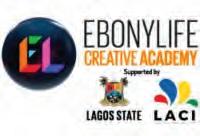


July-August 2023

pages 80-84
 Idris Elba, Pres. Nana Akufo-Addo
Mo Abudu EbonyLife
Idris Elba, Pres. Nana Akufo-Addo
Mo Abudu EbonyLife


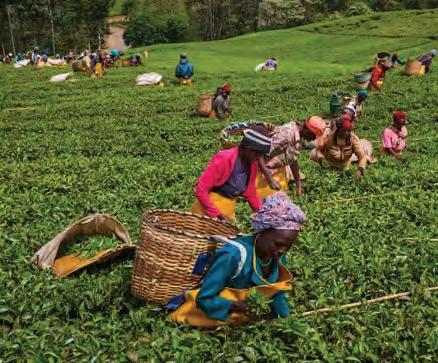

CONTENTS-July-August2023 Commentary 8 There’s No Such Thing as ‘Race Neutral’ 12 Affirmative Action, Student Debt and ‘Entrepreneuring While Black’: Can AfricanAmericans Survive the Perfect Storm? 114 My Coworkers Have Long Forgotten About George Floyd Business 16 Africa’s Richest Man Launches $20 Billion Refinery to Revive Nigeria’s Oil Industry 18 Jay-Z's Roc Nation Aims to Establish Caesars Palace in Times Square 20 7 Eternal Truths of Entrepreneurship 21 Mellody Hobson: My Class on Strategic Decision-Making 22 Black Businesses Projected to see $1B in Loans from the Small Business Administration 25 The First Black CEO of P.F. Chang's 26 These Skills and Jobs Will Be Most in Demand as AI Churns the Market 28 Top 7 AI Tools Everyone Should Use 32 Afreximbank’s Africa Trade Gateway 34 Afreximbank Launches TRADAR Club 38 Idris Elba and Marc Boyan Partner to Launch Global Marketing and Content Business, SillyFace Development 41 Turning the Gap Between Train Tracks into a ‘Solar Carpet’ 42 The Global Economy’s Future Depends on Africa 45 William Kamkwamba is Supporting Youth Inventions 46 African Diaspora Leadership for the Growth to 2.5 Billion: An Opportunity for Engagement 49 Nelson Mandela International Day! 50 Atlas E-Mobility Group Launching the First African-Designed and Engineered BEV (Battery Electric Vehicle) Agriculture 52 5 Things I Ate at an Event for Cutting-edge Vegan Food 54 Unilever Pivots to African Suppliers as Forex Pressure Mounts 56 Nestlé has Changed its Mind About Using Offsets to Become Carbon-neutral 58 Tap African Knowledge and Culture for Congo 2 January-February 2023 DAWN www.africabusinessassociation.org 56 102 26 60
Basin Forest Conservation (Commentary)
60 Kenya's Tea Pickers are Destroying the Machines Replacing Them
62 Pfizer's RSV Vaccine Promise to the Global South is Already Several Years Behind Schedule
64 How Africa Can Take Charge of Its Drug and Vaccine Supplies

66 Allensworth Finds a ‘Source’ for Clean Water Governance
68 Is California Giving Reparations for Slavery? Here’s What You Need to Knowlutions 72 African, Caribbean Nations Join Forces to Call for Reparations for Slavery
75 SOAD (State of the African Diaspora) Partners with the Rosenthall Group, LLC to Create a Bullion
106 Spike Lee Reveals The Career Advice He Received From Michael Jackson — Cannes Lions
110 Opera Based on Octavia Butler Novel Makes New York City Premiere
112 Illinois State Museum Returns Sacred Objects to Kenya
113 National Black Chamber of Commerce Forges a Strategic Partnership with the White House’s Prosper Africa to Increase Trade and Investment Potential of African Diaspora Businesses
116 This Culinary Incubator is Changing the Lives of Black and Brown Culinary Professionals in Chicago
118 Chef Dieuveil MalongaVisited 48 African Countries to Create a New ‘Afro-fusion’ Cuisine
121 Professional Soccer Players are Using AI to Filter out Racist Content Hurled at Them
122 Miami Heat Guard Gabe Vincent’s Play Inspires his Father and Nigeria
126 Tour de France 2023: Smiling Girmay can be 'Symbol' for Africa
History
128 Rodeo Celebrates the Legacy of Black Cowboys
130 A Look at the Country’s Only Touring Black Rodeo
132 Morgan Freeman Visits the Pentagon, Talks History with Secretary Austin
Health
74 Eritrea Rejoins Regional East African Bloc After 16-year Absence
Investment 76 African Stock Exchange/Bourse 77 Rise of the
Investor Class 79 Tracking Africa's Billion-Dollar Companies 80 Idris Elba and Mo Abudu on Bringing African Talent into Entertainment Mainstream 86 Women in the U.S. are about to Gain Significant Wealth. Here’s What That Means 88 Fifteen Percent Pledge Founder Launches a Fund for Black Founders (exclusive) Technology/Science 90 Why it's Time for Travel Companies to Address "Technical Debt" 92 Chinese Hackers Attacked Kenyan Government as Debt Strains Grew 95 AI Moderation is no Match for Hate Speech in Ethiopian Languages 98 Amazon, Meta Among Firms to Unveil AI Safeguards After Biden’s Warning 100 ‘Slavery Simulator’ Game Removed from Google App Store 102 Second Life Turns 20: Metaverse Lessons for Apple, Meta, and Roblox from the Pioneering Virtual World 104 Investor and Musician Will.i.am: Generative AI is 'a Job Creator' and will Help Avoid Mediocrity Lifestyle/Culture
Bank in Africa
Black
Events/Resources
3 January-February 2023 DAWN www.africabusinessassociation.org 130
137 Events
Trade Opportunity Marketing Headline

The USA and the Republic of Zambia have signed a Memorandum of Understanding (MOU) to promote and support interna onal trade opportuni es between the two na ons.

ABA DAWN has curated a report on the recent tour to Africa by Vice President Harris and a separate report detailing the substance of the five-year MOU.

Find the digital publica ons on the Africa Business Associa on website.

4 July-August 2023 DAWN www.africabusinessassociation.org
REGISTER HERE
The AfCFTA Youth Symposium aims to achieve:
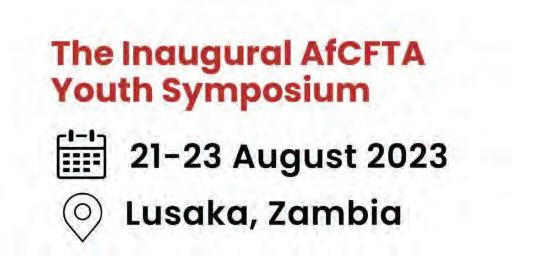
»Enhanced understanding of the objectives, principles, and scope of the AfCFTA by youth in trade;
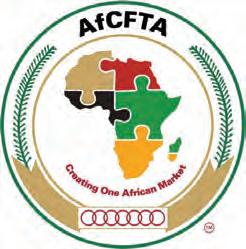

»Linking youth producers and suppliers with potential partners and investors;
»Shared information on how to utilize trading tools under the AfCFTA regime;
»Leverage networking platforms for youth in trade; and
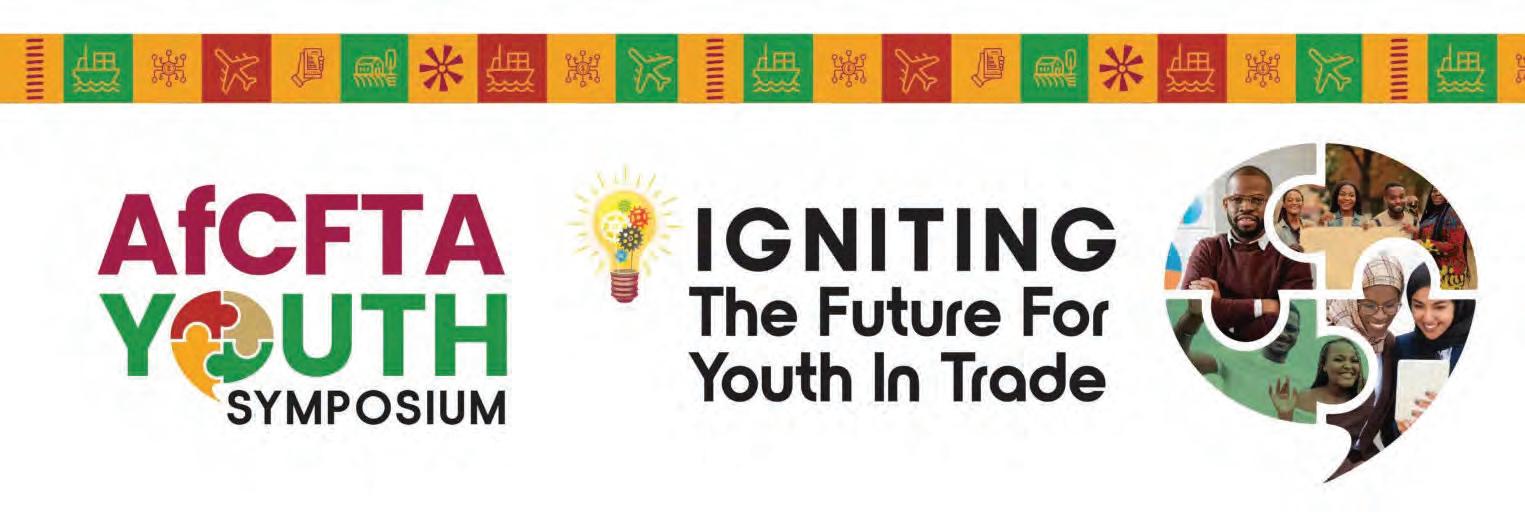
»The recommendations from the meeting will guide the implementation of the Protocol on Women and Youth in Trade
Hosted By
5 July-August 2023 DAWN www.africabusinessassociation.org
.
The Africa Business Association is an independent international business development organization. We offer access to the latest resources, information, and best practices in advocacy and communications for the African Diaspora and the African entrepreneurs in Africa.

We work to help you have access to news and events as starting points for constructive conversations and calls to action. We seek to cut through the froth of the political spin cycle to underlying truths and values. We want to be so focused on progress that together we can provide a credible and constructive generation of Africans that take seriously our previous generations and act upon all their wishes, our hopes and aspirations to make lasting change for all future generations.
Africa Business Association "DAWN"
PUBLISHER/PRESIDENT
Ricky Katsuya
ADVISORY BOARD
Earl 'Skip' Cooper, II, CEO, Black Business Association
H.E. Kone L. Tanou, Ambassador
CONTRIBUTING WRITERS
Ricky Katsuya
LAYOUT/TYPESETTING
Lion Communications
AFRICA BUSINESS ASSOCIATION NEWS
6564 LOISDALE COURT, SUITE 600 Springfield, VA 22150 USA
1-240-467-6811
aba@africabisinessassociation.org
dawn@africabusinessassociation.org www.africabusinessassociation.org
Copyright © 2023 by Africa Business Association News
All Rights Reserved.
The posting of stories, commentaries, reports, documents and links (embedded or otherwise) on this site does not in any way, shape or form, implied or otherwise, necessarily express or suggest endorsement or support of any of such posted material or parts therein.
Image credits: Cover-pinterest, glitzafrica.com, https:// www.facebook.com/photo/?fbid=661291682406181&set=p cb.661291845739498, yen.com.gh, afripost.net
lahistoriaconmapas.com
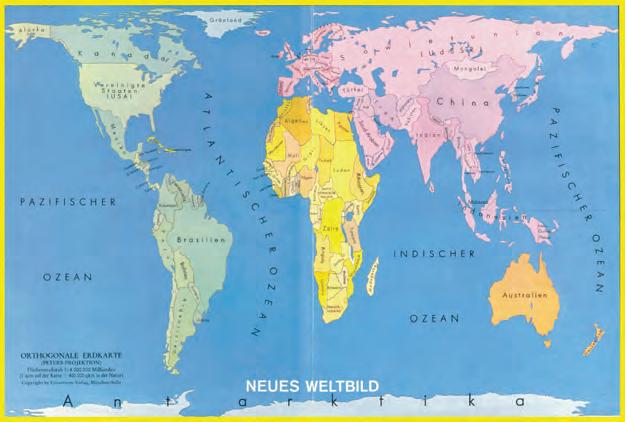
6 July-August 2022 DAWN www.africabusinessassociation.org
Not Sure Which African Market is Best for You??
Learn About the Eight Most Promising African Markets by joining the "Access Africa Now Webinar Series"
Every Second Wednesday 12:00 - 1:00 p.m. ET Virtual
February 8, 2023 - Kenya

March 8, 2023 - South Africa
April 12, 2023 - Ghana
May 10, 2023 - Nigeria
June 14, 2023 - Mozambique
July 12, 2023 - Tanzania
August 9, 2023 - Angola
September 13, 2023 – Ethiopia
Learn More/Register for the Access Africa Webinar Series
Learn About South Africa, Ghana, Nigeria first hand by joining the August 6th-15th
Trade Mission: O fficial Executive-Led GDEI Business Development Mission to South Africa, Ghana, and Nigeria
Learn More & Apply for the Mission

7 July-August 2023 DAWN www.africabusinessassociation.org
There’s No Such Thing as ‘Race Neutral’
By Michael Harriot
WHITE SUPREMACY is a god.
For some, the concept of racial supremacy is the only physical evidence of a higher power they need. For others, it is a historical myth. It is a savior and a false prophet. It is real and it is a lie, unseen, yet everywhere at once. And because this nation is built on the foundation of this belief system, America is steadfast, unmovable, always abounding in the work of white supremacy.
Before we begin, let’s get this out of the way. There isn’t a single millimeter of the American education system that does not disadvantage Black students. Nearly 70% of Black children attend schools that are majority Black. 72% of Black children attend high-poverty schools while the reverse is true for white kids. Those majority-Black schools receive less funding and have fewer resources than even the poorest white schools. Black children receive harsher discipline penalties than white children who commit the same offenses. Teachers give grade Black students lower grades than white students. This is the American education system that every Black child in America must navigate. These are facts.
I haven’t even started talking about race yet.
On Thursday, June 29th, the highest judicial body of an imaginary non-racist country said this well-researched, peer-reviewed country with educational, economic and racial disparities that white people explicitly worked to build doesn’t actually exist. It’s not real. The actual America is a “race-neutral” nation.
Although many news outlets, including this one, have reported that the U.S. Supreme Court struck down policies alternately called “affirmative action” and “race-conscious admissions,” that’s not what happened. Colleges are still allowed to use race as a factor in admitting students. Universities are not barred from using affirmative action for legacies,
donors, the children of employees and athletes. In fact, here is a more accurate way to describe what just happened.
In a 6-3 decision, the U.S. Supreme Court eliminated race as a factor for everyone except white people.
The big white elephant in the room
[I]t is not even theoretically possible to help a certain racial group without causing harm to members of other racial groups. It should be obvious that every racial classification helps, in a narrow sense, some races and hurts others
Clarence Thomas
I can’t believe I’m saying this, but Clarence Thomas is right.
In his concurring opinion, which he says was written “to offer an originalist defense of the colorblind Constitution” (I know, I know. I wanna see that Constitution, too), Thomas sided with his fellow conservatives. He argued that racial considerations violate the 14th Amendment’s equal protection clause, which says “No State shall make or enforce any law which shall… deny to any person within its jurisdiction the equal protection of the laws.” While Thomas was specifically referring to race-based admissions policies, his historical fan fiction could also be used as the thesis statement for why a race-neutral society is impossible.
When the foundational document of this nation made white people worth 40% more than Black people, it was not just acquiescing to the demands of southern slaveholders; the Constitution’s threefifths clause helped a certain racial group and caused harm to another. Only one race was harmed when the judicial body upon which Thomas sits decided that Black people “had no rights which the white man was bound to respect.” Separate but equal caused the same harm and helped the
Commentary
8 July-August 2023 DAWN www.africabusinessassociation.org
same race. Nearly every single law, policy, rule and political action pertaining to race during the first century of this country’s existence helped “a certain racial group.”
The 13th Amendment that ended slavery was technically race neutral; the Freedmen’s Bureau was a race-based corrective measure for the formerly enslaved that addressed the past. The 14th Amendment offered equal protection under the law. Sending Union troops to occupy the post-Civil War South was an affirmative action to specifically protect the newly emancipated Black citizens from racial terrorists. Brown v. Board of Education simply decided that segregation was unconstitutional. Integration, busing and military escorts for Black students were just a few of the actions that affirmed the court’s decision.
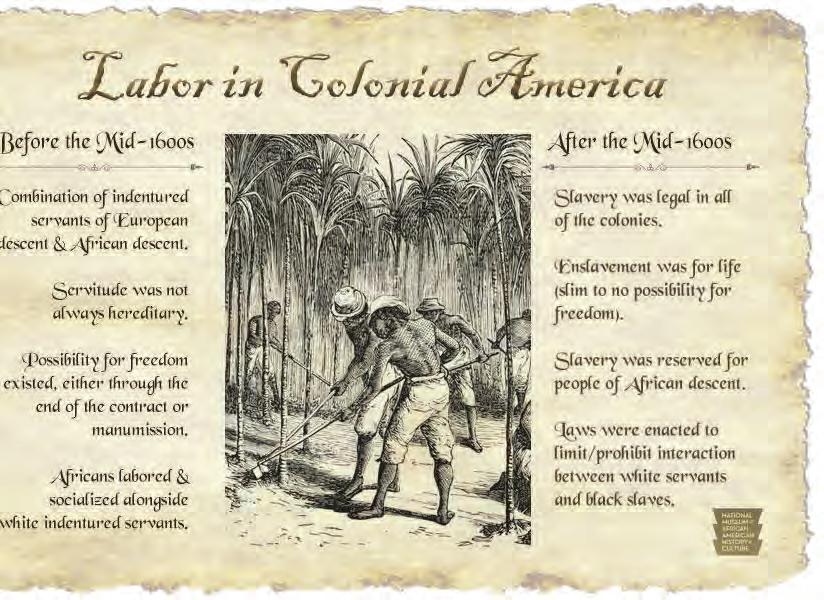
Yet, a court that supposedly relies on precedent to make their judicial decisions didn’t just declare that everything white people did to help their race doesn’t matter, they essentially banned policies aimed at fixing the harm that white people did. And to do so, they manufactured a make-believe standard of “race neutral” that could never exist. Even if the possibility of a colorblind society was even achievable, how could not considering race undo all the disparities that exist when America considered nothing but race?
Black people did not invent race or racial classifications. We didn’t create the color line or
dream up Jim Crow. Black people didn’t invent racebased involuntary servitude or racial integrity laws. We didn’t inject race into reading, writing, history, mathematics, geography, biology, psychology, medicine, art and even athletics. We didn’t create the one-drop rule or grandfather clauses or poll taxes or gerrymandering or separate but equal or the fugitive slave clause or redlining or Black codes or white leagues or white neighborhoods or whitecapping or night riding or sundown towns or Sunday lynching services or any of the myriad things white people have concocted to help themselves to the bounty they have amassed through the sheer force of their whiteness.
White people did that.
The court has expressly forbidden colleges and universities from remembering the time when laws and statutes were concocted in a way that, as Thomas correctly claimed, “helps, in a narrow sense, some races and hurts others.” Admissions departments must ignore the fact that, at the exact moment that the Supreme Court hit “send” on their retrograde manifesto, Black children were five times more likely to attend racially segregated schools. Colleges can consider SAT scores but not the fact that standardized tests were created as a white power maintenance tool. They must also un-remember the fact that SAT scores are more of a reflection of racial inequality than academic achievement. According to six unelected arbiters of justice, we are now required to pretend that the historical, social, economic and political factors that create the quantifiable racial inequalities awaiting every Black child on the first day of kindergarten do not exist.
“Colorblindness” is a form of amnesia. The only possible way anyone can be “race neutral” is by forgetting what happened in the past. But, as this country is showing its nonwhite citizens, forgetting
see page 10
9 July-August 2023 DAWN www.africabusinessassociation.org
"Race Neutral" from page 9
is an act of patriotism. History is anti-white. Even remembering the truth is an affirmative action.
But don’t worry; colleges can still use race as a factor for admission.
Affirmative action for white people
White students are the biggest beneficiaries of affirmative action.
Although most people think of the collection of policies as something that benefits “minorities,” race is just one of many factors used to admit students into institutions of higher education. The loopholes for white people are much larger and wider. At every turn, the most elite colleges and universities take affirmative action to make sure white students are at the front of the line.
In 2019, I reported on a working paper by economists at Duke University, the University of Oklahoma and the University of Georgia. After examining data from Harvard University, Peter Arcidiacono, Tyler Ransom and Josh Kinsler, published “Legacy and Athlete Preferences at Harvard” in the National Bureau of Economic Research. The study found that athletes, legacies (people whose family members attended the institution), children of employees and students of “special importance to the deans of admission” — typically “applicants whose parents have donated to Harvard, and applicants whose relatives have donated to Harvard” make up two out of every five white students who were admitted to the Ivy League university. 43% of white people gained entry through this white privilege escape clause, compared to 16 percent of Black students.
Even controlling for education experience and geographical pay differences, Black workers are paid 15% less than white employees. When farwhite activist Edward Blum filed Students for Fair Admissions v. Harvard and its companion case, Students for Fair Admissions v. University of North Carolina, white households had a median wealth of $188,200 versus $24,100 for Black households. Exceptions for people who make large donations are, by definition, a race-based admission policy for whites. Between 2014 and 2019, 69.3% of the legacy admissions to Harvard
were white. And, while most people think of athletic scholarships for football and basketball going to Black students, athletic scholarships are disproportionately reserved for non-revenue (pronounced “why-yet”) sports and students who shoot golf, play rowing and do sword fighting. This year alone, 75% of the athletes recruited for Harvard’s 2023 freshman class are white.
I actually asked the researchers how these exceptions compared to race-based admissions policies. Arcidiacono, one of the authors of the Harvard study, replied that the white privilege loopholes “are much higher than admissions rates for African Americans.” In fact, according to the peer-reviewed data, if Harvard eliminated preferences for legacies, the result would increase the number of African-American, Asian-American and Hispanic students but the white acceptant rate would decrease.
Welp, so much for that “merit myth.”
To be fair, there is another aspect of this reality that is rarely mentioned. Colleges don’t even pretend that their admissions policies are based on who is the “best student.” Instead, diversity efforts are aimed at creating the best learning environments. The entire point of a liberal arts education is to provide access to people, cultures and ideas that students don’t have access to on their own.
Who asked for a colorblind country?
“[S]uch remedies must be meant to further a colorblind government, not perpetuate racial consciousness.” — Clarence Thomas
Only white people (and Clarence Thomas) view colorblindness as a positive attribute. The only logical reason someone would proclaim that they “don’t see color” is that they cannot conceive that someone could be “race conscious” without using race as a tool of oppression. Apparently, the only way they could possibly view someone of another race as their equal is by stripping everyone of their culture, history and lineage. Not only is it possible to “see race” and not be racist, but a truly nonracist America would right the wrongs of the past by addressing the specific groups it has harmed.
Whether it’s the conservative bootstrap approach or Bernie Sanders’ progressive “rising tide” proposals, “race-neutral” policies are an inefficient
Commentary 10 July-August 2023 DAWN www.africabusinessassociation.org
way to correct a problem that affects a particular group. If you knew there was one person who was dying of thirst in a group of 100 well-hydrated people, it would be insanely idiotic to bring a single glass of water and let everyone take a sip. It would even be more insane to allow the well-hydrated people to create the water distribution policy.
Unless, of course, you don’t see thirst.
But for a second, let’s imagine we could create this theoretical race-neutral utopian America into existence. As Thomas noted, it’s impossible to help one race without harming another. So we’d have to start by undoing the economic and social advantages created by America’s race-based system of slavery. Of course, in this fairytale universe, race doesn’t exist. So instead of taking the wealth produced by slavery and giving it to the descendants of enslaved Africans, we’d have to redistribute all of the wealth. Because colonization, headrights, Native American removal and Manifest Destiny were all race-based policies, our theoretical race-unconscious country couldn’t take back the land that was stolen from the natives and confiscate the property of slaveowners. We’d have to have a nationwide land lottery. The entire education system was created to produce better outcomes for whites, so we’d need new funding formulas, education laws and admissions policies. But of course, those colleges and schools benefitted from segregation and the theft of Black taxpayers who were excluded from them for, in many cases, centuries. We’d need all of that back to truly be race neutral. We’d also have to let everyone out of prison since the criminal justice system was really race neutral. And while all of this chaos is taking place, we wouldn’t have elected officials, police, judges or any of the historically pro-white institutions that profited from discrimination against “certain races.” Hopefully, we’d have this all figured out by the time you get your wealth distribution checks because, of course, there would be no banks.
As unsettling as all this sounds, it’s much less disturbing than the song produced by the selfrighteous whines of the people who feel aggrieved after pilfering and plundering the wealth, labor and humanity of an entire non-white nation for 400 years.
Since Black people don’t have a time machine,
we simply want America to fix the things it broke. We want to live in a country that has a court that truly believes in liberty and justice for all and could actually try to form a “more perfect union.” To do this, someone would actually have to take affirmative action.
Unfortunately, the omnipotent American God actually gave his people a white supremacist time machine.
It’s called the U.S. Supreme Court.
Editor’s note: This article is an op-ed, and the views expressed are the author’s own. Read more opinions on theGrio - https://thegrio.com/
Editor's suggestion: Follow as many of the links as you can for extended breadth of understanding.
https://thegrio.com/2023/06/30/theres-no-suchthing-as-race-neutral/
Image credit: https://thegrio.com, https://nmaahc. si.edu/
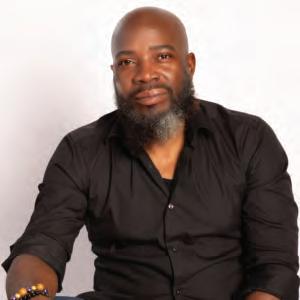
11 July-August 2023 DAWN www.africabusinessassociation.org
Michael Harriot is a writer, cultural critic and championship-level Spades player. His book, Black AF History: The Unwhitewashed Story of America, will be released in September.
Affirmative Action, Student Debt and ‘Entrepreneuring While Black’: Can African-Americans Survive the Perfect Storm?
By Stephanie Robinson
WHEN IT RAINS, it pours. Especially in Black America.
Over the past few weeks, issues that have plagued Black America for years garnered national attention while highlighting our precarious position in a country that continues to impede our collective progress. Taken together, three tempests — the Supreme Court’s overturning of affirmative action, their refusal to alleviate rampant student loan debt and the disproportionate criminalization of Black business leaders — represent a tsunami of wrongs that could cripple our communities today and for years to come.
Think about it. If you wanted to destroy a community, this would be the way to do it. First, you would hamper the choices and opportunities of their college-age students by limiting their access to the full range of educational resources that could benefit them.
Second, even if they were able to attend college, you would bury them in debt so they could not achieve the type of financial independence and prosperity that college should offer them.
Finally, you would ensure they never get a fair shot at honest competition and that their business aspirations would be crippled by a lack of investment upfront, and the disproportionate or undue criminalization of those few who eventually achieved commercial success.
And there you have it. Black America amidst the perfect storm.

The recent overturning of the use of raceconscious college admissions by the U.S. Supreme Court is sure to have a harmful e our community. The court’s decision, effectively ending affirmative action at American colleges and universities, has real-world examples of its crippling impact. In 2006, 10 years after California’s Proposition 209 banned consideration of race in the state’s admissions, only 96 Blacks were admitted to a nearly 5,000-person UCLA freshman class.
This figure, noted Time magazine, had been “unseen at one of California’s most prestigious public universities since the early 1970s,” a fact made more profound by the school’s status as “a respected institution in one of America’s most diverse cities.”
One day after gutting affirmative action, the Supreme Court struck down the Biden administration’s $400 billion plan to cancel student debt for millions of Americans. The court ruled the Biden administration needed congressional approval to enact such a one-time student debt relief program. Given the substantial number of African-Americans currently saddled with excessive student loan debt — particularly AfricanAmerican women — the impact of such a ruling is as disastrous as it is apparent.
“Student loan debt has particularly for women and Black women, saddled them with this absorbing amount of debt that they cannot climb over,” explained Democratic strategist, Ameshia
Commentary 12 July-August 2023 DAWN www.africabusinessassociation.org
Cross, in a recent interview with theGrio. “Twothirds of the $1.7 trillion in student loan debt that is held in this country is held by Black women … this is something that is keeping this population back.”
The recently introduced campaign, “Entrepreneuring while Black,” draws muchneeded attention to yet another ill facing Black America — the systemic racial discrimination Black entrepreneurs face when trying to secure investment to launch a business and the double standard that criminalizes their actions when their white counterparts get a pass for the same conduct.
“Companies backed by venture capital drive the U.S. economy, accounting for hundreds of billions of dollars in sales and profits,” points out Freada Kapor Klein and Mitchell Kapor, in their new book, “Closing the Equity Gap: Creating Wealth and Fostering Justice in Startup Investing.”
“The problem is that most of the wealth created winds up enriching elites, while the businesses funded by venture capitalists widen economic inequality,” the authors note

This is an issue that affects Black entrepreneurs regardless of business size. An Accenture analysis showed that “large banks approve about 60% of loans sought by white small business owners, 50% of loans sought by Latino or Hispanic small business owners, and just 29% of loans sought by black small business owners.” If that’s not enough, a 2022 study of white collar-crime sentencing revealed that “even though most white-collar crimes are committed by people who are white, people of color are incarcerated more frequently and for longer: African American adults are 5.9 times as likely to be incarcerated than whites.”
The many examples of Black entrepreneurs and business leaders whose actions have been criminalized while their white counterparts were held harmless for comparable actions are too many to mention but include Franklin Raines, Calvin Grigsby, Carlos Watson, Robert Smith, and others.
Taken together, this perfect storm of events — the overturning of affirmative action, the retention of student loan debt, and the disproportionate criminalizing of black business leaders —presents
a daunting challenge to our community at a time when we need it least. And though we may not be able to stop the storm from swirling, there are things we can do to take some cover so we hopefully don’t get drenched.

First, we can support our HBCUs even more. These institutions have always played an instrumental role in nurturing Black students, and they will undoubtedly take on an increased role in the years to come. They are more affordable than many majority-white institutions and students can generally graduate with less debt. Furthermore, they can continue to serve as platforms outside of Silicon Valley to attract investment for aspiring Black entrepreneurs.
Second, we can highlight and support those colleges that are working to ensure racial diversity in this post-affirmative action environment. In a recent interview with NYU News, Deborah Archer, a professor of clinical law and American Civil Liberties Union president, pointed out the actions taken in those states that had already prohibited race in college admissions prior to the SCOTUS ruling: “Those efforts have included: Evaluating academic achievement in context; giving credit to students who have attended underserved and underrepresented schools; considering socioeconomic status and English language learner status; considering group or community demographics; and expanded outreach and recruitment efforts.”
Third, despite the threatening storm, we cannot lose hope and stop our struggle for a fair seat at the American economic table. As Martin Luther King Jr. aptly observed: “What does it profit a man to be able to eat at an integrated lunch counter if he doesn’t earn enough money to buy a hamburger or a cup of coffee?”
We have to not only hope but aggressively demand access to the material resources we need to sustain our families for generations to come.
https://thegrio.com/2023/07/10/affirmative-actionstudent-debt-and-entrepreneuring-while-blackcan-african-americans-survive-theperfect-storm

Image credit: lololovesfilms.com

13 July-August 2023 DAWN www.africabusinessassociation.org
A B in s th c U
SAVVY RESOURCES
for 50,60,70AND80+
BLACKWOMEN@
FiftyNifty&MoreisTHEgo-tospace onlineforUnapologeticallyBlack women50+forfindingtheir Tribe+Camaraderie+Resources
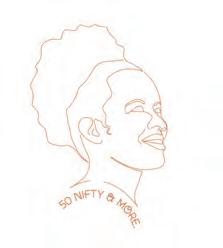

Wearededicatedtosharingresources coveringfinance,wellness,beauty, passion,leisure,andrelationships.
Ourtopicsaimtoupliftand encourageauthenticdiscussionand connection-sopleasejoinus!


Hello!
Weinviteyoutojoinusinbuildingthiscommunity. Afterall,YOUarethepillarsofthis,andsomanyother communities...
Tolearnmoreaboutus: ScanaQRcodewithyoursmartphone 1. 2. 3.



OpentheCameraappfromtheHomeScreen, ControlCenter,orLockScreen.
Selecttherear-facingcamera.Holdyourdeviceso thattheQRcodeappearsintheviewfinderinthe Cameraapp.
Tapthenotificationtoopenthelinkassociatedwith theQRcode.

BarbaraSullivan+AingeelTalley
FiftyNiftyandMoreLLC
https://bit.ly/43qQhY9
info@fiftyniftyandmore.com
@fiftyniftyandmore

Africa’s Richest Man Launches $20 Billion Refinery to Revive Nigeria’s Oil Industry
 By Aisha Salaudeen
By Aisha Salaudeen
NIGERIA ON MONDAY, May 22nd commissioned the Dangote Oil Refinery — considered a ‘gamechanger’ in ending the country’s fuel imports.

Outgoing President Muhammadu Buhari commissioned the 650,000 barrels per day capacity refinery at the Lekki free trade zone area of the commercial hub Lagos, in an event attended by some West African heads of state - Ghana, Togo, Senegal, Niger, and Chad.
Worth $20 billion the giant refiner y built by the
Dangote Group, which is owned by Africa’s richest man Aliko Dangote, aims to produce up to 53 million liters of gasoline per day, as well as 4 million liters of diesel and 2 million liters of aviation jet fuel daily.
Speaking at the event,
L-R: President/Chief Executive, Dangote Industries Limited, Aliko Dangote; President of Federal Republic of Nigeria, Muhammadu Buhari; President of Ghana, Nana Akufo-Addo; President of Senegal, Macky Sall; President of Niger, Mohamed Bazoum; President of Togo, Faure Gnassingbe, at the commissioning of Dangote Petroleum Refinery and Petrochemicals FZE, in Lagos on Monday, May 22, 2023.

Dangote described the refinery as “the world’s largest single train refinery.”
The refinery is expected to solve some of Nigeria’s petroleum issues. Despite being an oilproducing nation and one of Africa’s largest oil producers, Nigeria lacks the capacity to refine its oil.
16 July-August 2023 DAWN www.africabusinessassociation.org
Business
A large number of these products that exist in the West African country are imported from other nations like India, Belgium, UAE, and the Netherlands.
Between 2015 and 2019, the cost of importing refined petroleum products exceeded the exports by $58.5 billion, according to OPEC, a group of major oil producers.
Nigeria’s lack of refining capacity presents many challenges such as spending billions of dollars on imports yearly and exposure to disruption of domestic fuel supply.

The Dangote refinery is significant because it plans to solve these problems by doubling the
country’s refining capacity, as well as increasing demand for fuel domestically and generating foreign exchange for the country through exports.
“There will be constant availability of high-quality fuels for our transportation sector, the refinery will also make available to our industries vital raw materials for a wide range of manufacturing,” said Dangote, who partly financed the construction of the refinery.
Around 50% of the funds used to build the refinery came from Dangote’s equity investment while the other half came from debt finance from banks such as Access and Zenith banks.
“We have built a refinery with a capacity to process 650,000 barrels per day in a single train — which is the largest in the world … We decided on a plant designed with state-of-the-art technology and a scale in a capacity that will be a game-changer in Africa and the global market,” Dangote added.
The complex also has a 435-megawatt power station, a deep seaport and a fertiliser unit.

The refinery sits inside the Lekki Free Zone, a 16,500-hectare free trade area, the masterplan for which also contains a proposed airport, a start-up community, and commercial and residential areas.
Head of Nigeria’s Central Bank Godwin Emefiele said the refinery “is more than able to meet all of Nigeria’s domestic fuel consumption, given its processing capacity.”
Emefiele explained further that: “Nigeria can be self-sufficient in all products that we consume and at the same time export our excess output to the rest of the world.”
Ghana’s President Nana Akufo-Ado, who was also present at the event, described the Dangote refinery as a “spectacular project” which “makes West Africa better and stronger.”
The refinery size is seven times the size of Lagos’ Victoria Island, sitting on over 2000 hectares of land.
Edited by Dawn team
https://www.msn.com/en-us/money/markets/ africa-s-richest-man-launches-20-billion-refineryto-revive-nigeria-s-oil-industry/ar-AA1bxsBD
Image credit: The Oracal, yohaig.ng, thebridgenewsng.com
17 July-August 2023 DAWN www.africabusinessassociation.org
Jay-Z's Roc Nation Aims to Establish Caesars Palace in Times Square
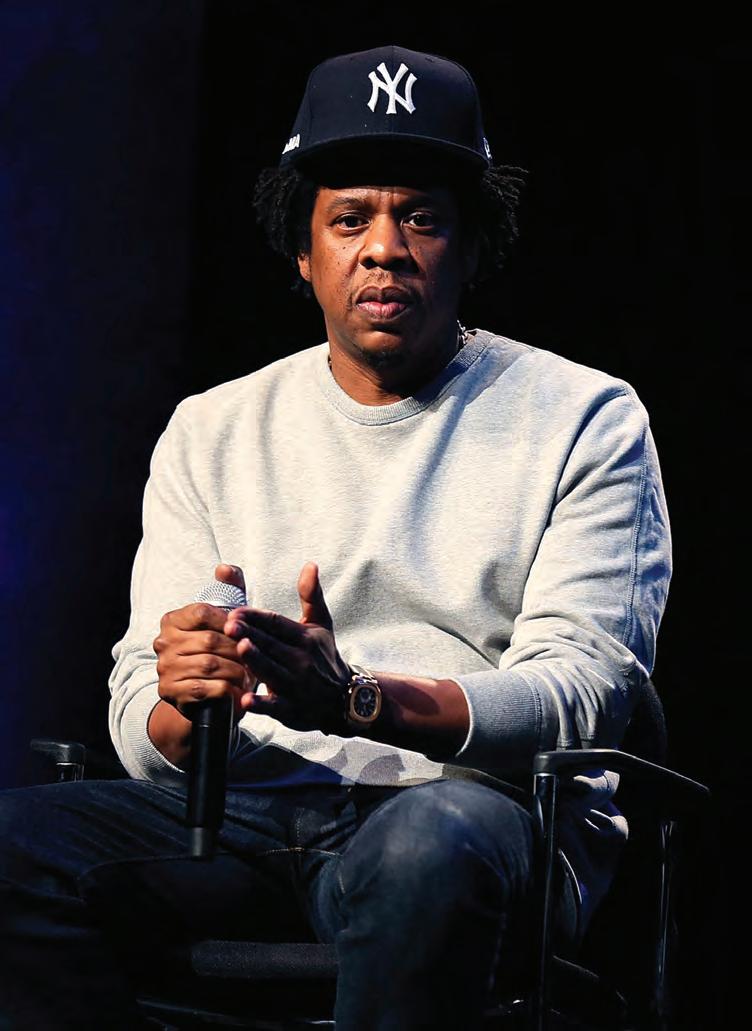 By Rafael Peña
By Rafael Peña
NEW YORK CITY IS CLOSE to embracing the world of gambling, and several billionaire investors are vying for a chance to hit the jackpot. After much deliberation, elected officials have granted authorization for a solitary casino license in the bustling metropolis. The move has ignited a fierce and, at times, contentious bidding war among affluent contenders.
One notable party interested in this high-stakes endeavor is Jay-Z and his entertainment company, Roc Nation The renowned entrepreneur has joined forces with SL Green and Caesars Entertainment to propose the construction of a Caesars Palace in the heart of Times Square. In an open letter titled “It’s Time, Times Square,” shared on Roc Nation’s Instagram and Twitter accounts, the company made a compelling case for why they should be bestowed with New York City’s coveted gambling license.
“The winning group must have a proven track record of turning words into actions—prioritizing New York City and its diverse residents, regardless of race, religion, ethnicity, gender, sexual orientation, or socioeconomic status,” the statement proclaimed. “Our proposal outlines an innovative plan that will not only attract additional tourists to our city but will also enhance the lives of everyday New Yorkers.”
Creating Opportunities For NYC Businesses
Jay-Z’s ambitious plan pledges to benefit local businesses, support mass transit, and invest in sanitation and security. The entertainment mogul and his team also plan to “implement a muchneeded transportation strategy,” among other commitments.
“Our bid allocates $115 million for inclusive theater programs, including childcare services for Broadway workers and their families,” the letter further detailed.
New York voters had given their approval for Las Vegas-style casinos in 2013. However, it was only last year that Albany’s elected officials authorized casino licenses for downstate New York. This region includes New York City, Long Island, and Westchester County.
Business DAWN www.africabusinessassociation.org
18 July-August 2022
Billionaires Bidding For Casino
Several billionaires are now eagerly vying for the title of the King of New York casinos. Alongside Jay-Z, other contenders include Steve Cohen, owner of the New York Mets, John Catsimatidis, scion of Gristedes supermarket, and Stephen Ross, developer of Hudson Yards.
According to a source cited by The New York Post, “Every billionaire wants a casino. Owning a casino epitomizes success in the United States.”
However, these billionaires diverge in their visions of where to situate their casinos. In partnership with Hard Rock, Cohen envisions a casino near Citi Field in Queens, where the Mets play. Catsimatidis sets his sights on Coney Island, renowned for its boardwalk, amusement park, and hot dog eating contest. Ross, collaborating with Wynn, seeks to establish the casino in the recently developed Hudson Yards.
Amidst this fierce competition, allegations of a misinformation campaign have surfaced.
The Roc Nation letter, which also appeared as advertisements in the New York Post, New York Daily News, and Amsterdam News, accused certain “conflicted parties” of spreading falsehoods, clarifying their stance in the letter.

Roc Nation refrained from specifying the parties involved. However, some speculate they were referencing a coalition comprising Broadway theater owners and producers, the midtown Manhattan community, and tenant organizations collectively known as No Times Square Casino.
Deadline reported that this coalition opposes the construction of a Caesars Palace in Times Square. The group is citing concerns about increased traffic congestion, economic disruption, and the potential diminishment of its family-friendly atmosphere.

https://travelnoire.com/jay-z-roc-nation-aims-toestablish-caesars-palace-in-times-square
Image credit: NEW YORK, NY - JANUARY…, Jose Francisco Fernandez
19 July-August 2023 DAWN www.africabusinessassociation.org
Saura
Simon Sinek on the 7 Eternal Truths of Entrepreneurship
By Christine Lagorio-Chafkin
IN 2009, Simon Sinek delivered a TED Talk that explored his notion that all great leaders share a trait--what he called "knowing the why." It has become the third-most-watched TED Talk of all time. Some 14 years later, the best-selling author's ideas continue to resonate with entrepreneurs
1. Make Room for Blank Space.
Like so many of us, I'm recovering from feeling like I have to be productive every moment of every day. I started building in blank time in my day, random two- or three-hour blocks when no one could schedule anything. When we constantly engage our "thinking" brain, we have access only to our conscious thoughts. Accessing our unconscious brain--often the source of our best ideas--takes blank space. You have to allow gaps for the mind to ruminate.
2. Never, Ever Stop Learning.
When you start a business, you suddenly find yourself being a leader, and that's a skill that needs to be learned. It typically comes through trial and error, a road that's often longer and bumpier than it need be. For a smoother path, the best leaders read, they watch talks, and they talk to other leaders--not just about fundraising, but also about leadership.
3. Have a Purpose, Not a Slogan.
Every business seems to have a purpose statement or vision statement on its website. Not because they actually have a purpose, but because it's fashionable. Instead, it should be the standard by which you uphold your ethics
and integrity, and by which you make financial decisions. Otherwise, you end up doing things that violate the very purpose on which your company is purportedly built. It's insidious.
4. Go Beyond Growth.
I do not understand the obsession with growth. Why does your company exist? Growth is not the answer. It's a result. To build a company solely for growth means you're going to make decisions only to grow. And integrity, ethics, quality-- all of those things will necessarily suffer as a result. Growth is a dial, it's not an absolute. It is also not a way to build a long-lasting, successful business.
5. Always Show up to Give.
When someone walks onstage and starts telling you all their credentials and their URL, that means they want followers, they want business, they want clients. That's the biggest lesson I teach in public speaking: Put your ambitions aside, and care about enriching the people in front of you.
6. Optimism is Ideal; Pessimism is Necessary.

Every pessimist I know says, "I'm not a pessimist. I'm a realist." And they all think optimists are naive. Let's be clear: I'm not against pessimists. I'm against only a pessimist who stands on the sidelines and jeers. You should want to work with people who see a problem and then roll up their sleeves to help solve it.
7.
You Don't Need to Know Everything.
When I started my business, I thought I had to have all the answers. I believed my credibility relied on my intelligence and understanding of everything. That's so stupid. The biggest lesson I learned was to say, "I don't know," and to ask for help. The effect has been profound.
https://www.inc.com/magazine/202305/christinelagorio-chafkin/simon-sinek-on-the-7-eternal-truths-ofentrepreneurship.html
Image credit: blogspot.com
20 July-August 2023 DAWN www.africabusinessassociation.org Business - Commentary
Mellody Hobson: My Class on Strategic Decision-Making



AS FUTURE LEADERS, We all make hundreds of decisions every day in both our professional and personal lives. But how do you act when faced with one big decision that could determine your future—and the future of your company and your coworkers?
Between my longtime leadership at Ariel Investments and my work on corporate boards, I have learned strategies to help me consider monumental choices. This accumulated knowledge comes both from personal experience and from seeking the advice of some of the world’s most brilliant and successful business minds.
In my class, I’ll walk you through two complicated and emotional business decisions I faced in my career. The first case focuses on my firm’s response to the devastating 2008 market crash. The second case concerns fielding offers for DreamWorks Animation SKG while serving as board chair amid tremendous media sector disruption in 2016.
I believe taking care of business and taking care of people are intertwined. You will see how these two
challenging situations involved deep consideration of financial realities and human outcomes. I will break down pivotal moments to help you consider how you might handle similar scenarios. This class is intended to help you grow the leader within you; by the end, you will have a framework for future strategizing when confronted with a difficult choice.
Tough decisions are a part of life. Hopefully, deciding to take my class will provide you with the tools to help make your next decision easier and more informed.
REGISTER HERE:
https://www.masterclass.com/classes/mellodyhobson-teaches-strategic-decision-making?utm_ source=Email&utm_medium=Blast&utm_ term=AAP&utm_content=053123_Email_Blast_ ClassLaunch_MHobInstructorLetter_AAP&utm_ campaign=MHobInstructorLetter.

Source: MG Media
Image credit: Master Class, logo-designer.co

21 July-August 2023 DAWN www.africabusinessassociation.org
Business - Advertorial
M M
Black Businesses Projected to see $1B in Loans from the Small Business Administration
By Jeffrey McKinney
FOR YEARS, RAISING CAPITAL has been a struggle for Black businesses that often need the funds to scale up.
A vast number of those entrepreneurs list overcoming hurdles to gain financing among their top and largest operating challenges. It’s not shocking that those business owners generate less revenue and profits than their non-diverse peers and end up with more shutdowns.
However, in a new and surprising development, roughly $401 million more in heavy-duty financial help is perhaps in store for those proprietors through the U.S. Small Business Administration.

Based on a calculated analysis by Creative Investment Research, the SBA’s 7(a) Loan Program, the agency’s main and most common lending program, is projected to lend Black firms and businesses $1 billion this year, a whopping jump from $599 million in 2017.
The Washington, D.C.-based firm figured 7.76% of SBA loans were issued to Black business owners from October 2022 through mid-June 2023, versus 3.86% in 2017. It reports the percentage of loan dollars to Black entrepreneurs in that time frame rose to 4.41% from 2.36%.
Black businesses can use the SBA loans for many purposes, including working capital, acquiring land, or purchasing equipment. The cash can also be used for expansion, acquisitions, innovation, and hiring.

William Michael Cunningham, an economist and owner of Creative Investment Research, says his firm’s study illustrates a promising trend in the lending climate for Black American businesses. He
tells BLACK ENTERPRISE that it is a sign of the continued progress that Black entrepreneurs are making while operating in a challenging economic environment. He says the report was based on an examination of SBA data in honor of Juneteenth.
“Access to capital is the key that unlocks the door o economic empowerment and unleashes the true potential of entrepreneurs,” an SBA spokesperson said in response to the report. “That’s why it is a top priority for the Biden-Harris Administration to improve equity within our lending programs, and strengthen direct outreach to historically underserved communities, including Black entrepreneurs.
“The SBA also recognizes that supporting aspiring entrepreneurs has the potential to advance economic equality and growth in communities across our nation by growing their businesses, creating jobs, and building generational wealth.”
However, Cunningham says that SBA (7a) loan allocations in 2023 for White-owned businesses were 11 times higher than for Black businesses. “This emphasizes the persistent financial gaps that Black entrepreneurs face in pursuit of business growth,” he explains.
He says historically racial discrimination in employment has often fueled Blacks to become their own bosses through entrepreneurship. “Our report uniquely identifies the relationship between small Black business lending to Black entrepreneurs
22 July-August 2023 DAWN www.africabusinessassociation.org
Business
and record-low Black unemployment.”
Though the study’s findings reveal a trend toward more inclusivity tied to SBA lending activities, they too showcase the need for continuous and focused efforts.
Cunningham says more work is needed given the existing racial disparity gap as the nation’s Black population is about 14% but that group is only getting just 4.41% of the dollar loan volume in 2023. In contrast, for example, Cunningham says Asians account for 5.7 percent of the U.S. population but received 19.2% of SBA (7a) loans in 2023 based on dollar volume.
Cunningham says the study finds a potential connection between the willingness of 7(a) loan participants to identify their ethnic background. During the Trump administration, which faced criticism for its stance on diversity and equality, there was an increase in “unanswered” responses regarding ethnicity.
Contrarily, Cunningham says there has been a major drop in this objection after the murder of George Floyd and the subsequent societal focus on racial justice.
More details of the report are here https://www.blackenterprise.com/analysis-sbaprojected-to-supply-black-businesses-1-billion-inloans-this-year/


Image credit: womenonbusiness.com
Solopreneurs: Know Your Niche
By Maura Walters
SOME OF THE LEAST productive language I used to market myself when I first started my business as a copywriter was, "If it involves words, I do it!"
No wonder I had such a tough time getting leads.
My network didn't know if I specialized in website copy, if I wanted to draft press releases, or if I was still writing articles for magazines. I was trying to be everything for everybody -- and I ended up speaking to no one.
This is why it's so important to have a niche when you work for yourself. Self-employed folks who specialize become experts in their area, and guess what? Clients love experts -- especially high-end, high-paying clients. If you want to stand out, you need to pick a lane.
Having a niche isn't about having the most unique idea in the entire world or about being the only person that does what you do (that would actually be a very difficult thing to market). Niche doesn't mean "so out there nobody has ever done it." Niche just means specific. Think about how many millions of coffee shops there are in the world: In New York, where I live, there's one on every block. But each of them does things a little bit differently. They all have different menu offerings, different music, different interiors, and different vibes. And they all attract their people.
Having a niche makes your life simpler as a business owner. It makes your choices easier, helps you identify your dream clients, and brings a sense of calm to your work. If you are newly self-employed, you may be a generalist simply because you don't yet know where to focus. That's OK! But sooner or later, you'll want to establish your niche.
Here are some strategies that will help you get see page 24
23 July-August 2023 DAWN www.africabusinessassociation.org
Business - 1st Person
Solopreneur from page 23
clear about your services and help you bring in more clients.
Focus on What You Love, and Stick to It
The first step in finding your niche is to home in on what you love doing and get really good at it. Learn all the ins and outs of this specific service and keep offering it to your clients. Focusing on what you love breeds confidence and competence, and makes that annoying little thing called imposter syndrome disappear. Solopreneurs with a focus become confident through the power of experience, and clients can always sniff out who knows their stuff and who's faking it. Would you rather go to a yoga class that's taught by an experienced instructor or one that's taught by a personal trainer who dabbles in a bunch of different workouts?
When you're a master of a few specific services rather than a jack of all trades, clients feel more comfortable hiring you.
Who Is Your Client?
Think about the best project you ever had: What was the work like? What was the timeline? What was the budget? Most importantly, what was the client like to work with? Remember that ideal clients aren't necessarily types of businesses or subject matters. Often, they're people who possess a certain set of traits that you really jive with. My ideal clients are mission-driven, collaborative, and care about telling great stories. Consider how your ideal clients describe what they need and why. What words and phrases are music to your ears? (For example, nothing delights me more than hearing a prospect say, "We know our website could be working harder for us.") This will help you figure out the kind of work you love doing most, and who you love doing it for.
What Do Clients Come to You For?
Very often, your niche will find you. As you begin to work with more clients, be attentive to the requests that come up over and over again. Ask yourself questions like: "Of all the services I offer, which one is being requested most often? What do people seem to be the most perplexed
about? What do they need the most help with?" Anticipate the needs of your clients, and evolve your business to satisfy those needs. Get crystal clear on the problems you solve for your ideal clients and elevate that messaging in your website and marketing materials as much as possible.
When I first launched my business, I used generic phrases like "copywriter for brands" on my website. Today, my messaging is targeted and unambiguous: "I create passionate, purposeful content for mission-driven businesses and nonprofits." And those are the types of clients I attract.
There's a reason why people go into business for themselves: so they can do work that lights them up, for clients they're excited to support. Having a niche is the bridge that takes you from freelancer to business owner. "
https://www.inc.com/maura-walters/solopreneursknow-your-niche.html
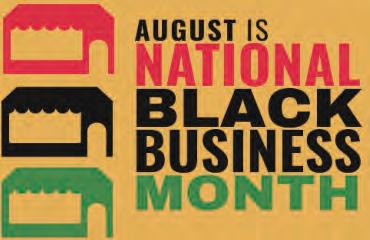
Supporting Our Own During Black Business Month Created in 2004 by founders John William Templeton and Frederick E. Jordan Sr., the original intent of the 31-day effort was to drive the USA policy agenda impacting more than two million African-American businesses. Read the rest of this ESSENCE story here: https://www. essence.com/news/black-business-month-keenanbeasley-interview/ 24 July-August 2023 DAWN www.africabusinessassociation.org
Business - 1st Person
This 33-Year old is Making History as the First Black CEO of P.F. Chang's
By BLACK ENTERPRISE Editors
MEET DAMOLA ADAMOLEKUN , the CEO of P.F. Chang’s China Bistro, a popular Asian casualdining restaurant chain based in the U.S. Since 2020, he has been leading the company to ensure its continued growth and success.
Damola, who is now 33-years old, has been essential in the evolution of P.F. Chang’s, one of the largest and most famous restaurant chains across the globe. Even though the brand is still strong, he believed that it is necessary to embrace change to adapt to the uncertain future.
As P.F. Chang’s CEO, Damola worked on revamping the dining rooms and revising the menu items. He also initiated the inclusion of delivery and to-go orders which was viewed as unfitting to the brand before. Now the chain operates a number of small fast-casual-type of locations around the country.
True enough, the business survived even when the pandemic hit. What’s more, he led the company to a 31.7% increase in sales in 2021 compared to the year before, according to Top 500 chain data from Restaurant Business sister firm, Technomic.
Moreover, Damola is a partner at Paulson & Co., which became one of the principal owners of P.F. Chang’s which was bought for $700 million in 2019.
He was also on the board of directors at the International Tower Hill Mines LLC. Adamolekun earned his bachelor’s degree in Economics from Brown University and his Master of Business Administration from Harvard Business School.
Damola is among only a handful of Black CEOs, and we may know the secrets to his success.
“My life is my work. My work is my life”, he said in
an interview with Fortune. Happily welcoming the lack of separation between business and personal in his every day, Adamolekun says he’s always found pleasure in dedicating himself to what he loves. And those feelings predate his appointment at P.F. Chang’s, going back to his career in private equity. “I thought it was fun. So it wasn’t like I had to go in on a Saturday,” he said.
Some of his ability to see his grueling work duties as extensions of his personal life may be due to his dedication to a daily routine.
Adamolekun starts each day at 4 a.m. with a seven to eight-mile run to maintain his “calm, relaxed, autonomous nervous system,” according to Fortune. For the now 34-year-old, an early morning exercise helps him show up to work at P.F. Chang’s headquarters in Scottsdale, Arizona, with a shaped mind and natural energy. His work day begins at 7 a.m. with meetings with both the COO and CFO of the Asian chain restaurant before delving into a day full of external and internal conversations that lead him to a 6 p.m. departure. If he doesn’t have to do the business of hosting dinners after-hours as CEO, he prefers to head home and relax with a cigar on the patio; thereby ending his day in the same way he starts it by activating his parasympathetic nervous system, according to Fortune.
It all seems to be working for Adamolekun as last year, shortly after taking over as CEO, he announced that he and his team had already overseen the remodeling of over 80% of P.F. Chang’s locations..
https://www.blackenterprise.com/33-year-old-ismaking-history-as-the-first-black-ceo-of-p-f-changs/ https://www.blackenterprise.com/damola-adamolekunceo-of-p-f-changs-says-my-work-is-my-life/?traffic_ source=Connatix
Image credit: Blackbusiness.com
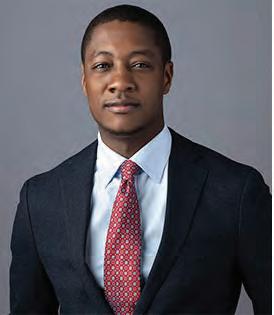
25 July-August 2023 DAWN www.africabusinessassociation.org
Business
Damola Adamolekun
These Skills and Jobs Will Be Most in Demand as AI Churns the Market
By Vanessa Bates Ramirez
THER E’S LONG BEEN CONCERN about automation and AI making jobs obsolete, and the release of ChatGPT and similar large language models has only fueled that fire. But AI isn’t the only trend that will affect the future of work, it’s one of several. The World Economic Forum’s Future of Jobs Report 2023, released this week, details the additional factors shaping how jobs and the economy will look in the coming years.

The cliffs notes: Almost a quarter of jobs will change in the next five years, but not just due to AI. In fact, AI and other technologies are expected to have a net positive impact on job creation, while economic issues like inflation and supply shortages will be the biggest wrench in the spokes of the labor market’s growth.
803 companies were surveyed for the report, and they represented a diverse mix of industries and regions. They predicted that of the 673 million jobs in the survey’s dataset, 83 million will be eliminated,

while 69 million new jobs will be created. This would yield a net decrease of 14 million jobs, or 2% of current employment.
But before we start chanting “death to AI,” let’s dig into the anticipated causes of job growth and elimination. Though the report does show that technology and digitization will cause labor market churn, big data and AI will drive more job growth than anything else, with the most in-demand jobs being data scientists, machine learning specialists, and cybersecurity professionals. Demand for these roles is expected to grow an average of 30% by 2027.
There’s a flip side to the coin, though: up to 26 million clerical, record-keeping, and administrative jobs will be eliminated by AI and other digital technologies. 75% of the companies surveyed plan to adopt AI systems that will be able to perform these tasks. They’ll need employees to run those systems, of course, which may be why technological literacy
26 July-August 2023 DAWN www.africabusinessassociation.org Business - Future Job Market
was ranked sixth-most important this year, but expected to move up to the top spot in coming years. For now, analytical and creative thinking are the top two most important skills for employees to have (take that, AI!).
Engineering skills will be in high demand in the near future too, particularly those related to energy
For all the talk about transitioning to green energy, the US actually has a shortage of the types of labor needed to make it happen. It’ll be hard to go allelectric without enough electricians, for example. More than half the companies surveyed said they plan to put some amount of investment toward sustainability, climate change mitigation, or the energy transition, and will see corresponding job growth.
The final two areas that will have the highest job demand are, somewhat surprisingly, education and agriculture. With robots and drones that can plant, monitor, and harvest crops, and computer programs that can teach students at any age, you’d think these would industries would be vulnerable to automation and AI. But the report found that jobs in education should grow by about 10% (that’s three million new jobs for teachers spanning from grade school all the way through university), and a
15 to 30% increase—that’s 4 million new jobs—for agricultural equipment operators, graders, and sorters
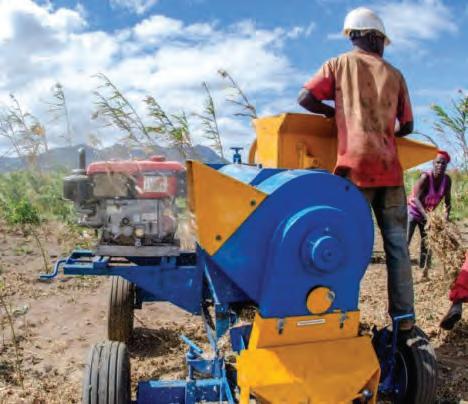
The report forecasts that over 60% of workers will require some sort of retraining in the next five years, whether that’s a total overhaul of their current role or just taking their existing skills up a notch. However, only half of workers currently have access to good training. This means companies and governments need to start investing big in reskilling and education.
“Acceleration in digitalization, AI, and automation are creating tremendous opportunities for the global workforce, but employers, governments, and other organizations need to be ready for the disruptions ahead,” said Sander van’t Noordende, CEO of Randstad. “By collectively offering greater skilling resources, more efficiently connecting talent to jobs, and advocating for a well-regulated labor market, we can protect and prepare workers for a more specialized and equitable future of work.”
https://www.thestreet.com/travel/forget-airbnb-hyattmay-solve-a-massive-hotel-and-business-problem Image credit: mamopanel.org, greeneconomy. media
27 July-August 2023 DAWN www.africabusinessassociation.org
Top 7 AI Tools Everyone Should Use
By Suzuki Shillsalot
AS EXPECTED , the adoption of AI has been the most rapid in those industries that have reaped the benefits of artificial intelligence.
The finance industry was among the first to use AI tools for fraud detection and customer support. AI-powered chatbots are now widely utilized for customer service, and it is also used to detect fraudulent transactions.
AI has been used in healthcare for a variety of purposes, including detecting medical disorders, devising treatment programs, and analyzing medical imagery. AI has also been used to create predictive models for diagnosing diseases early and remotely monitoring patients.
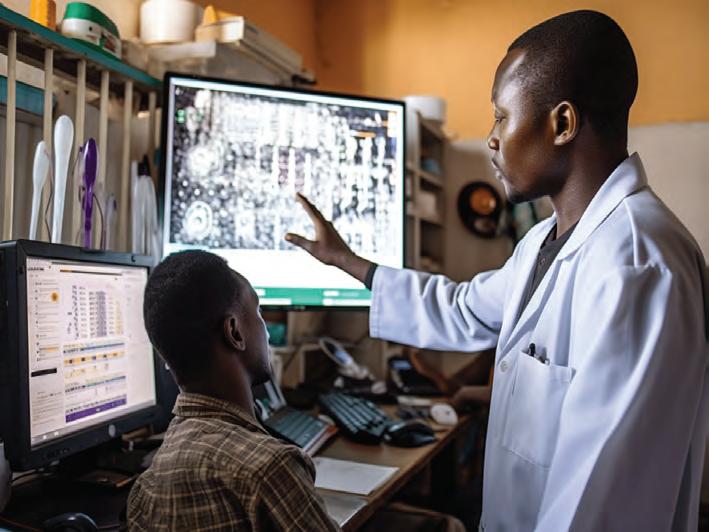
Moreover, artificial intelligence is now being used in the retail industry to improve customer experience and sales. Chatbots, recommendation engines, and visual search are being used by retail professionals to give personalized service.

AI has been used in the manufacturing industry to optimize production processes, increase quality control, and reduce costs. Robots and drones powered by AI are employed to execute monotonous activities more effectively and accurately, while predictive maintenance algorithms are used to reduce downtime.
Additionally, the transportation industry uses AI for a variety of applications, including selfdriving vehicles, route optimization, and demand forecasting. Self-driving cars have the potential to increase safety, decrease accidents, and enhance traffic flow.
However, as technology continues to evolve, we can anticipate more industries adopting AI in the near future.
Let us now explore the top seven AI tools you should look out for:
ANY SUMMARY
Any Summary is an AI-powered tool that summarizes text using the GPT-3 language model in a concise and accessible way. It quickly summarizes lengthy audio or video interview files. Moreover, you can make a customized summary format that includes bullet points, quotes, and a full abstract with the help of Any Summary. It supports a wide range of file formats, including photos, audio, video, text, and CSV files.
SNACK PROMPT
Snack Prompt is an AI-based tool that offers curated prompts, community-driven rankings, and organizational features to improve your ChatGPT experience. The best AI prompts from its community of prompters can be upvoted, saved, and shared by others.

CHATBASE
Chatbase is an AI-based tool that allows customers to train an AI chatbot on their own data. Users can submit a PDF document that will be
28 July-August 2023 DAWN www.africabusinessassociation.org Business - AI Tools
used by the chatbot to answer questions about the document’s content. Users can provide their website’s homepage or sitemap URL, and it will generate a chatbot for your website based on the information on your web data.
Using NLP and ML technologies, the platform also gives chatbot analytics and insights. It enables chatbot developers to track user interactions and engagement, discover faults and development possibilities, and optimize chatbot performance.
SONGR

SongR is an AI-based music composition tool that employs ML algorithms. It allows users to customize music tracks for multimedia projects by inputting parameters such as mood, genre, and instrumentation. It offers user-friendly features such as a three-click process, a variety of genres, customizable lyrics, and multiple voice options.
SongR has gained some interest in the music, entertainment and advertising communities. Its potential to streamline the music production process and democratize access to music creation has the potential to make it a more popular tool in the future.
WONDER DYNAMICS
Wonder Dynamics is an AI-based tool that automatically animates, lights, and composes CG characters into a live-action scene. It employs ML techniques to automate the creation of visual effects (VFX) for cinema and video
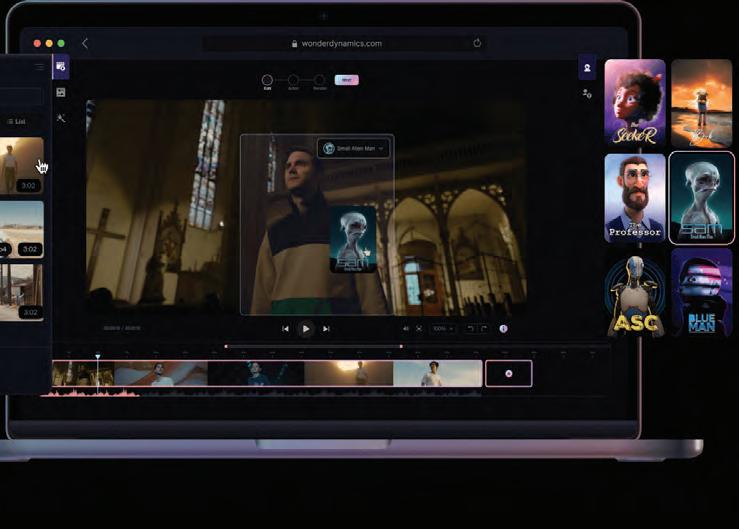
The technology enables filmmakers and video producers to generate high-quality VFX quickly
and easily, minimizing the time and expenses involved with traditional VFX production.
The film and video production sectors have taken notice of Wonder Dynamics. It has the potential to become a popular tool in the future due to its ability to expedite the VFX production process and democratize access to high-quality VFX.
MONICA
Monica is a ChatGPT-powered copilot that answers your questions and writes your email. It is a tool that comprehends and employs the ChatGPT API to comprehend and respond to chat messages, write copywriting based on specified templates, and translate, rephrase, and explain text on any web page. It is available on all websites, and users can use it for free with basic capabilities before upgrading to a paid version with greater features.
Monica’s unique data management method and sophisticated AI capabilities have the potential to make it a popular tool in the future.
INSIGHTBASE
InsightBase is a market intelligence tool powered by AI that provides insights and predictions on industry trends, customer behavior, and market competition indicators. It lets businesses analyze and comprehend their target markets, find prospective possibilities, and make data-driven decisions that drive revenue and growth.
The tool creates dynamic dashboards that automatically refresh and can be easily shared. It ensures privacy and strives to assist organizations in improving marketing ROI and increasing sales.
InsightBase has grown in popularity and is adopted among firms of all sizes, especially in the B2B sector. Because of its ability to deliver in-depth market insights and predictions via advanced AI and machine learning algorithms, it has become a vital tool for sales and marketing teams, as well as other company operations.
How is the global industry reacting to the entry of AI?
One cannot argue with the fact that AI has the see page 30
29 July-August 2023 DAWN www.africabusinessassociation.org
AI Tools
from page 29
potential to transform industries, improve efficiency, and reduce costs. However, the introduction of AI does raise legitimate concerns about job displacement, ethical issues, and potential biases.
Healthcare and finance, for example, are embracing AI as a tool to improve decisionmaking and automate operations. For example, AI-powered diagnostic tools can assist doctors in making faster and more accurate diagnoses, while chatbots in the banking business can provide client assistance around the clock.
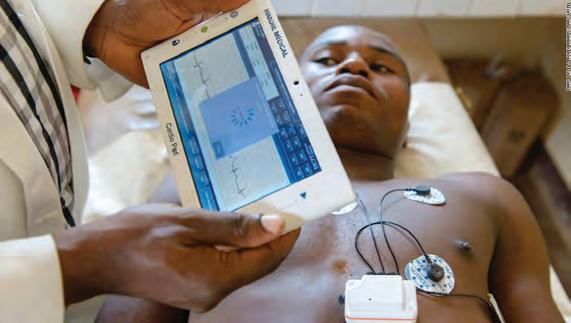
AI is now being used in other industries, such as manufacturing and transportation, to enhance productivity and cut costs. Robots and drones powered by AI can do repetitive tasks more effectively and accurately, while self-driving vehicles can increase safety and minimize the need for human drivers.
However, there are fears that AI will put human workers out of jobs and worsen income inequality. As a result, several companies are taking a cautious approach to AI, focusing on using it to augment rather than replace human capabilities.
An industry’s reaction to AI is determined by the industry’s individual challenges and prospects. While some industries embrace AI, others are more cautious, weighing the potential benefits of AI against its potential risks.
https://ambcrypto.com/top-7-ai-tools-everyoneshould-use
Image credit: https://opentools.ai
Barack Obama says Using this 6-Word Phrase will Accelerate your Success
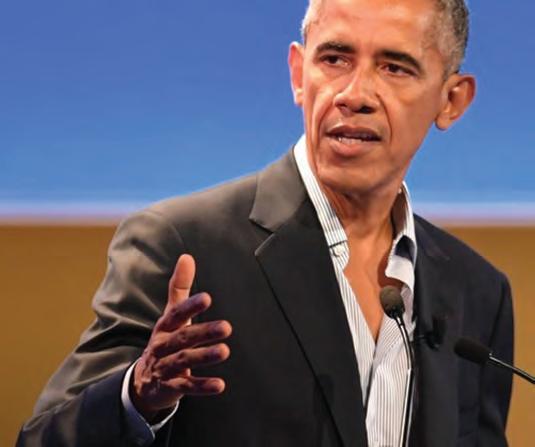 By Minda Zetlin, Author of 'Career SelfCare: Find Your Happiness, Success, and Fulfillment At Work'
By Minda Zetlin, Author of 'Career SelfCare: Find Your Happiness, Success, and Fulfillment At Work'
WHAT'S THE BEST CAREER advice former president Barack Obama has for new graduates, entrepreneurs, and anyone looking to achieve extraordinary success? Just learn how to get stuff done.
Obama shared this advice during an interview with LinkedIn editor in chief Daniel Roth, in conjunction with the former president's new Net flix limited series Working. Roth and Obama chatted about many aspects of working life, and how A.I. is about to upend that life for legions of knowledge workers. And then, late in the interview, he shared the career advice he gives to young people--that is also good advice for every entrepreneur or anyone looking to achieve success.
30 July-August 20232 DAWN www.africabusinessassociation.org
Business
African innovations that could change the world
Barack Obama, former US President Huff Post
"I've seen at every level people who are very good at describing problems, people who are very sophisticated at explaining why something went wrong or why something can't get fixed," he explained. "But what I'm always looking for is, no matter how small the problem or how big it is, somebody who says, 'Let Me Take Care Of That.' "
Let me take care of that. In most instances, your customer, or investor, or boss doesn't need or want to know why a problem is challenging or how it came about. What they do want to know is that the problem will be solved, and that they can rely on you to solve it. If you project that attitude that whatever it is, you can handle it--and then you do handle it--that will make you stand out, he said. "People will notice, 'That's somebody who can get something done,'" he said.
Choose what you want to do, not what you want to be
Obama shared a second excellent piece of advice: "Worry more about what you want to do than what you want to be." He often encounters people who want to be a member of Congress by the age of 30, or have made a certain amount of money by a certain age, he said. Those are certainly good goals. But while it's great to focus on your desired end result, it's also important to ask yourself if you'll enjoy doing the work to get there.
For example, an aspiring entrepreneur may dream of heading up a billion-dollar company someday, without thinking about the hours and years of working and scrambling it takes to start a company and build it to that level. When my book Career Self-Care: Find Your Happiness, Success, and Fulfillment at Work came out, many people who had never written much of anything told me they wanted to write a book too. What they really meant was that they wanted to have a book with their name on it, do book signings, and other things that go with having a book come out. I'm not sure they would enjoy spending the hundreds of hours of sitting alone in a room researching and writing that it takes to create a book. They were focused on the results, not the process it took to get there.
But, whether you start a business or write a book or do something else entirely, the process is how you'll spend most of your time. So, Obama says, it's best if it's something that really appeals to you. "The people I find that are most successful are the people who say, 'I'm really interested in computers and figuring this stuff out.' And then they end up being a Bill Gates," Obama said. Or, he said, they're really interested in curing some disease. They may or may not win the Nobel Prize, but they love their careers because they were interested in the thing itself.
If you choose work that you find absorbing, "you're going to get really good at it," he said. "And whether you're recognized or rewarded, or you get the positions that you want or not, the journey will have been a good one."
https://www.inc.com/minda-zetlin/barack-obamasays-using-this-6-word-phrase-will-accelerateyour-success.html
Image credit: kartunanakbangsa.blogspot.com

31 July-August 2023 DAWN www.africabusinessassociation.org
Afreximbank’s Africa Trade Gateway
By Hope Moses-Ashike
THE AFRICAN EXPORT-IMPORT BANK
(Afreximbank), in collaboration with the AfCFTA on Tuesday in Accra launched the Africa Trade Gateway (ATG), a suite of five digital platforms that have been designed as a single window to enable the Bank better deliver on its mandate by providing critical services to support and promote African trade and the implementation of the African Continental Free Trade Agreement (AfCFTA).
Launched by Kanayo Awani, executive Vice President, Intra-African Trade Bank, of Afreximbank on the sidelines of the ongoing 30th Afreximbank Annual Meetings (AAM2023), in the presence of Ernest Addison, governor-Bank of Ghana and Emily Mburu-Ndoria, director-directorate of Trade in Services, Investment, IPR and Digital Trade, AfCFTA who represented Wamkele Mene, Secretary General, AfCFTA , the gateway digital ecosystem comprises the MANSA (due diligence platform), the Pan-African Payment and Settlement System (PAPSS), the TRADAR Club, the Africa Trade Exchange (ATEX) and ATG Connect.
Addressing guests at the launch, Awani said that Afreximbank’s digital evolution was part of its deliberate strategic response to address Africa’s key challenges to accelerate the pace of development and foster economic prosperity for Africans using and applying digital technologies and business models.
“Each one of our digital interventions is designed to address clearly identified challenges and barriers for those seeking to engage in African trade
and investment. I am pleased that each intervention has been successfully transformed from concept to reality and commend the hard work of our colleagues and partners in achieving these milestones. But to consolidate results, maximize net effects, achieve greater efficiencies, drive higher synergistic value, quicken regional integration, extend and create new access markets and accelerate digital economy in Africa, the Bank is introducing customer-centric Africa Trade Gateway.”
She described ATG as the gateway into a definitive digital ecosystem made for Africa’s trade, supported by Afreximbank and the AfCFTA in collaboration with their partners, to answer the needs of businesses, governments and stakeholders by enabling trade, commerce and investment.

With the ATG, customers could complete all their transactions within one window, explained Ms. Awani.
MANSA , Africa’s due diligence platform, provides a single source of primary data required for the conduct of customer due diligence on African entities, financial institutions, corporates and SMEs. It also provides complementary collection of information on investment in Africa, country profiles and traded products/services of African countries.
PAPSS was established to enable efficient pay-
32 July-August 2023 DAWN www.africabusinessassociation.org Business
ment for intra-African trade in national currencies, promoting intra-African trade, minimising risk and contributing to financial integration across Africa. In July 2019, African Union heads of state meeting in Niamey, adopted PAPSS as the payment and settlement system to support the implementation of the AfCFTA. It currently operates out of Cairo.
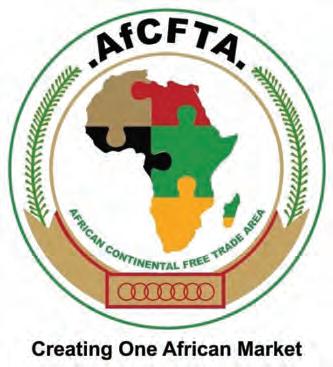
TRADAR Club, is member-driven network aimed at empowering international businesses and executives to transform trade and investments in Africa through trusted trade intelligence and advisory services through innovative digital tools and networking opportunities, helping members to discover new markets; grow their business; save time; access dedicated expert support; post and respond to new business opportunities; network; meet business/trading partners, etc. Membership is open to global industry leaders, African and foreign businesses, intergovernmental organisations, policy makers and others committed to unlocking growth and development in Africa. (see page 34)
ATEX is a B2B and B2G e-commerce platform launched at the 54th Conference of African Ministers of Finance, Planning and Economic
Development in Dakar in May 2022, to help small and medium scale and large African businesses to tap into new markets in Africa and to facilitate the optimisation of their supply chains. It enables procurement in bulk for basic commodities to ensure access to suppliers in a transparent manner.

ATG Connect serves to connect business service providers across Africa. It provides freight and logistics connectivity solutions which allow for frictionless connecting and matching of freight/ logistics requests with freight and logistics providers listed on the platform. Customers can get quotes for the pickup and delivery of goods to and from any location in Africa at a very competitive price.
The launch ceremony included presentations on the services available under the various digital platforms and a panel discussion by the heads of the platforms during which they discussed the services they offered in support of trade across Africa and the implementation of the AfCFTA.

https://businessday.ng/news/article/afreximbanksafrica-trade-gateway/
Image credit: Africa Trade Gateway

33 July-August 2023 DAWN www.africabusinessassociation.org
Afreximbank Launches TRADAR Club
African Export-Import Bank (Afreximbank) on 15 December 2022 in Cairo operationally launched the Afreximbank TRADAR Club, a prestigious member-driven network aimed at empowering international businesses and executives to transform trade and investments in Africa through trusted trade intelligence and advisory services

According to Afreximbank, TRADAR Club will deliver innovative digital tools and networking opportunities, helping members to discover new markets; grow their business; save time; access dedicated expert support; post and respond to new business opportunities; network; meet business/ trading partners; and more. (see page 32)
TRADAR Club is anchored by Afreximbank’s Trade Intelligence Solutions Unit. The Unit was conceived to address one of the key barriers to intraAfrican trade – the lack of comprehensive African trade and investment information. Afreximbank’s Trade Intelligence Solutions is an end-to-end, integrated trade intelligence offering – supporting clients that are seeking to enter new markets in Africa or expanding into the continent. TRADAR Club and the Trade Intelligence Solutions it champions represent the single authoritative resource and forum for trade and investment related insight on the African continent.
Afreximbank described TRADAR Club as the primary gateway through which exporters, importers and investors will access curated trade intelligence and advisory services to support their market expansion decisions and network with other businesses.
TRADAR Club membership is open to global industry leaders, African and foreign businesses, intergovernmental organisations, policy makers and other influential stakeholders committed to the shared objective of unlocking growth and development in the African continent. TRADAR Club offers four membership packages, including a free Basic membership. The Standard, Gold and Platinum memberships packages attract annual membership fees. Further details about TRADAR Club can be found at www.tradar.africa
The operational launch event featured a highlevel panel discussion on ‘Why better African trade data is needed to deliver enhanced decision making and growth for businesses.’ A free six-month trial membership was extended to all participants who attended the operational launch..
https://businessday.ng/news/article/afreximbanksafrica-trade-gateway/ Image credit: bizwatchnigeria.ng
34 July-August 2023 DAWN www.africabusinessassociation.org Business
The Oldest Company in (Almost) Every African Nation - That is Still in Business
By Mark-Anthony Johnson
IN CASE YOU missed it: These are the oldest companies in Africa still in business today: A huge continent needs a solid postal service, so it’s no surprise that half of the top 10 oldest businesses in Africa are postal companies. Oldest of them all is Mauritius Post, opening all the way back in 1772, when Mauritius Post was still under French rule. The new service started small with eight messengers and rural post offices were established in 1790. Fast forward to 1814 and Namibia also gets its own postal service. NamPost are still managing the post over 200 years later.
Food production and exports is also big business in Africa. Premier FMCG is a South African food
#manufacturer and their story begins all the way back in 1820, with the formation of a humble bakery. They now own many well-known South African food brands, including Blue Ribbon and Lil-lets.
See the companies still in business today in the image agobe.
https://www.linkedin.com/in/mark-anthonyjohnson-55615926/

Business - History
35 May-June 2023 DAWN www.africabusinessassociation.org
Inspiring Creativity with Our Unique Illustrations of Black People
By John D. Sanders, Black
Illustrations
UNFORTUNATELY, FOR TOO LONG, black people have been underrepresented in mainstream art and media. Our illustrations seek to change that by providing a platform for black voices and experiences to be seen and heard.
In this blog, we'll take a closer look at our illustrations and the creative process behind them. We'll also explore the impact our illustrations have on our customers and the broader community, and discuss the importance of representation and diversity in the art world. We hope this blog will inspire you to celebrate diversity and find your own sources of creativity and inspiration.


The Beauty of Black Culture
Black culture is incredibly diverse and rich, encompassing a wide range of experiences, traditions, and perspectives. Did you know that there are over 2,000 languages spoken across Africa alone? Or that black people have contributed to countless genres of music, from jazz and blues to hip-hop and R&B? The breadth and depth of black culture is truly remarkable, and we're honored to be able to showcase that diversity through our illustrations.
Our illustrations capture the essence of black culture in a way that is both authentic and inspiring. Each artwork is designed to highlight the beauty and uniqueness of black people and their experiences, from the way they dress and dance to the way they interact with each other and the world around them. Our illustrations showcase a variety of black experiences, from intimate family moments to vibrant street scenes and everything in between.

36 July-August 2023 DAWN www.africabusinessassociation.org
Business - Advertorial
Some of the most popular illustrations in our collection include those that showcase the diversity of black hairstyles and fashion, as well as those that celebrate the importance of community and family. Each illustration is created with great care and attention to detail, and we believe that the beauty of black culture truly shines through in each and every one of them. Whether you're a black person looking to see your experiences reflected in art or someone from a different background looking to learn more about black culture, our illustrations are sure to inspire and delight.
The Impact of Our Illustrations

First and foremost, our illustrations provide representation and celebrate the diversity of black experiences. For many black people, seeing themselves and their experiences reflected in art can be incredibly empowering and affirming. It's important for everyone to see a wide range of experiences represented in art, and our illustrations help to fill that gap.
We've received a lot of positive feedback and testimonials from customers who have been inspired by our illustrations. Many people have shared that our illustrations have helped them feel seen and heard, and have even inspired them to create their own art. We love hearing these stories and are proud to be able to make a positive impact in people's lives through our artwork.
In addition to the personal impact our illustrations have, we believe they also promote representation and diversity in the art world. By showcasing the beauty and diversity of black experiences, we hope to inspire other artists to do the same. We believe that representation matters, and our illustrations are just one small part of a larger movement to make the art world more inclusive and diverse.
Conclusion
We hope that this blog has inspired you to celebrate diversity in art and to explore the beauty and richness of black culture. Our

unique illustrations capture the essence of black experiences in a truly special way, and we're honored to be able to share them with the world.
Throughout this blog, we've discussed the importance of diversity in art and the impact our illustrations have on our customers and the broader community. We've also shared some interesting statistics about the diversity of black culture, highlighted some of our most popular illustrations, and shared feedback from satisfied customers.

We encourage you to explore our collection of illustrations and discover your own sources of creativity and inspiration. Whether you're a black person looking to see yourself and your experiences represented in art or someone from a different background looking to learn more about black culture, our illustrations are sure to inspire and delight.

Finally, we want to end on a positive and uplifting note. Art has the power to bring people together, to inspire positive change, and to celebrate the diversity of human experiences. We're proud to be a part of that movement and we hope that our illustrations will continue to inspire and empower people for years to come. Thank you for reading!
We've created hundreds of illustrations of Black people that you can download to add diversity to your designs and projects! Click HERE to download our illustration packs and start incorporating cultural sensitivity into your designs today!
https://www.blackillustrations.com/blog/inspiringcreativity-with-our-unique-illustrations-of-blackpeople
Image crecit: Black Illustrations
37 July-August 2023 DAWN www.africabusinessassociation.org
Idris Elba and Marc Boyan Partner to Launch Global Marketing and Content Business, SillyFace

 By Nick Sonnenberg
By Nick Sonnenberg
ACTOR, FILMMAKER AND MUSICIAN , Idris Elba, and Marc Boyan, founder of Miroma Group, one of the largest independent marketing groups in the world, today announced the launch of their new international business venture, SillyFace. A global marketing and content business, SillyFace aims to unearth new storytellers and reinvigorate creativity and fun in brand marketing through ideation, creation and distribution of both long and short form content.
There is a growing sense of ‘purpose-fatigue’ amongst consumers, according to research by GfK¹, making it more difficult for brands to gain and hold the attention of their targeted audiences.

With this backdrop, brands need to adopt new approaches to garner attention from consumers.
“On a daily basis, I work alongside global brands who are struggling to understand the intersection between modern cultural trends, brand identity and its consumer base. It is creating apprehension and hindering creative storytelling”, said Marc Boyan, founder and CEO of Miroma Group. “SillyFace has been created to lean into culture and new global trends, offering a fun environment to get creative rather than be afraid. Idris and I are both from underrepresented backgrounds and we see the world a little differently. We’re aiming to bring our thinking to brands to give
Business 38 July-August 2023 DAWN www.africabusinessassociation.org
Miroma Group founder and the actor seek to unearth new storytellers and reinvigorate the creativity and fun in marketing for brands
people a voice and share stories that resonate with the consumer, whilst keeping the brand safe from criticism.”
Idris Elba added, “I’m at my creative best when I am relaxed, not anxious or considering all the ‘what ifs’. However, this isn’t always the atmosphere that creatives are faced with when brand building. SillyFace is here to bring back that feeling of creative excellence.
“We want more voices, more views and open, mutually respected ideation. This new venture will give me the ability to create powerful marketing campaigns. Campaigns that will truly resonate and engage with the people I want to connect with. It will also allow me to share my knowledge and experience with other brands and co-create campaigns we’re all proud of. This is just the start for us. I can’t wait to get started.” he added.
Born in response to demand for a new approach by marketers and consumers, SillyFace will bring together a team of global, creative marketers and content creators – under the expert guidance of Elba and Boyan – all with different perspectives and backgrounds, to ensure they add the excitement back into brand building. The first new hires for SillyFace include Rahul Chopra as chief strategy officer, Miroma Group, who recently joined from Instagram where he was director, Reels and Camera, and was previously at Facebook app and Snap Inc in senior roles. SillyFace also welcomes Margot Hauer-King, as chief client and revenue
officer, who joins from Beentheredonethat and was previously at WPP. Both will be based in New York.
Possessing an extensive understanding of gen-z and millennial demographics that many brands are hoping to serve and connect with, SillyFace will specialise in creative ideation, content creation and distribution; helping clients deliver authentic campaigns with cultural value.
As a staple in popular culture through his SAG and Golden-Globe winning work as an actor, as well as his work as a producer, director and musician, Idris has a great understanding of the fashion and lifestyle industry, and experience in the brand building process, having worked to build campaigns with international brands such as Gucci, Christian Louboutin and Tanqueray and most recently developing a new wellbeing brand, S’ABLE with his wife Sabrina Elba. Idris has consistently been involved with projects that are both purpose oriented and move at the speed of culture and wants to bring this expertise to brands around the world.
Miroma Group also has its own deep ties to modern culture through its network of businesses that create cutting edge sports, music, fashion and entertainment campaigns and stories for brands including Spotify, Adidas and Netflix, as well as its history as an early investor in SB.TV, founded by the late Jamal Edwards MBE, and unearthed talents including Ed Sheeran.
SillyFace will operate as part of Miroma Group on a global scale, with the first three offices opening in London, New York and Los Angeles in 2023.
https://www.lbbonline.com/news/idris-elba-andmarc-boyan-partner-to-launch-global-marketingand-content-business-sillyface
Image credit: Miroma Group
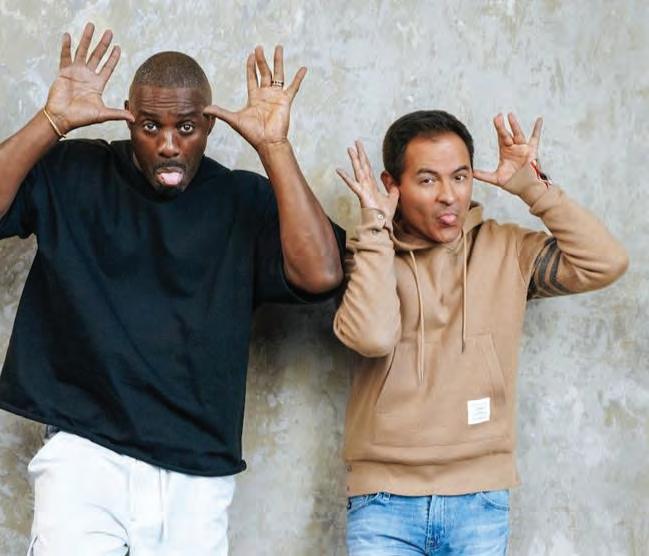
39 July-August 2023 DAWN www.africabusinessassociation.org
SOLAR POWER IS KEY to a clean energy future, but many people don’t want large-scale solar farms in their backyard. In the U.S. alone, at least 75 solar farms were rejected last year, in large part because of their size and visual impact on the landscape.
This predicament is the reason why floating solar farms are becoming increasingly popular, why California is covering some of its canals with solar panels, and why South Korea, France, Kenya, and others are elevating solar panels on stilts and growing vegetables underneath.
But soon, countries racing to reach their netzero goals could have another option to choose from, because a Swiss start-up called Sun-Ways has come up with the idea to slot solar panels in between train tracks. The panels would be installed (and uninstalled for maintenance) by a specially built train that would “unroll” them like a carpet. This would happen during the night, when fewer trains are running.
As wild as it all sound, Sun-Ways actually has two competitors. Greenrail and Bankset Energy, respectively located in Italy and England, are
already testing similar concepts. But Sun-Ways stands out in two ways. For one, it uses standardsize panels, whereas the others use smaller panels that are placed on top of crossties. And unlike its competitors, Sun-ways doesn’t require manual installation. It has a train for that!
Sun-ways is putting this idea to the test during a $560,000 pilot project in Western Switzerland. The pilot, which is slated for this summer, will trial a version of the mechanism using a regular train that’s been retrofitted for the occasion. Running on a 140-foot stretch near the city of Neuchâtel, the train will install about 60 solar panels, turning the gap between train tracks into a reflective black ribbon.

Joseph Scuderi, a marketing executive with a background in the energy industry, founded Sun-Ways after he first got the idea while staring down at the tracks while waiting for a train. “It’s unused space,” says Baptiste Danichert, Scuderi’s cofounder.
Bill Nussey, who is the founder of the Freeing Energy Project, whose mission is to accelerate the shift to cleaner, cheaper energy, says that the
40 July-August 2023 DAWN www.africabusinessassociation.org Development
Turning the Gap Between Train Tracks into a ‘Solar Carpet’

 By Elissaveta M. Brandon
By Elissaveta M. Brandon
idea is intriguing and that “there are many ways it can work but [Sun-Ways] will have to overcome a number of big challenges, including debris from trains, the geographic distance between panels and the point of interconnect to the grid.”
For now, 100% of the electricity generated by the solar panels will go straight to the grid to power nearby households. But eventually, the team is planning to use some of that electricity to power the very trains that run above the panels. According to Danichert, 5,000 kilometers of “solar rails” (which is the current length of the entire Swiss railroad network) can generate 1 gigawatt of energy per year, or enough energy to power about 750,000 homes.
Considering there are over 1 million kilometers of railway tracks worldwide, the potential could be huge, even if the system can’t be installed on every one of those tracks. But most importantly, it wouldn’t take up any space from farmland or forests, and it
wouldn’t
ruin any landscapes.
For the upcoming pilot, the team is using an existing train, but eventually, the team is planning to use a custom train made of two carriages—one will be used to store the solar panels before they get installed, the second will be used to install them. The panels will then remain on the tracks indefinitely, or until any maintenance is required, in
which case that same train will go over the tracks and follow the same process, but in reverse. And while it may seem more efficient to repurpose existing train carriages, Danichert notes the custom train will help considerably speed up the process, from 250m per hour to 1km per hour.
For the pilot program, a retrofitted train will install solar panels in groups of three, latching the panels between tracks before stopping and loading up another trio of panels. When Sun-Ways completes its customized train, the company will be able to “unroll” interconnected panels without the train ever needing to stop.
https://www.fastcompany.com/90888672/ switzerland-turning-the-gap-between-train-tracksinto-a-solar-carpet
Image credit: Sun-Ways
41 July-August 2023 DAWN www.africabusinessassociation.org
Development - Positive Prospects for Africa
TheGlobalEconomy’s FutureDependsonAfrica
By Jack A. Goldstone and John F. May
WHAT NEW ENGINE
OF

GROWTH
will fill the role that China has played in the last 40 years? India is often touted as the “next China,” but that remains an unlikely prospect because India will soon face many of the same demographic constraints now hobbling its fellow Asian giant. Instead, the world will have to look to the continent of Africa.
The most recent UN estimates project that Africa’s population, driven by both falling mortality and high fertility, will grow from 1.4 billion today to 2.5 billion by 2050. With China, Japan, Korea, and European countries all likely to experience a sharp decline in young workers, the world economy is set to slow sharply unless it receives a productivity boost from the billion young people being added to Africa’s population in the next quarter century. The dynamism of Africa’s youth is central to the future of the global economy.
The Baby Bust
In the next 30 years, China will have to deal with harsh demographic trends. Thanks to its one-child policy, which has driven down births since 1980, the Chinese prime-age workforce will fall by 40 percent from its 2010 peak by 2050, declining by 300 million workers. The existing workforce will grow older, and the population of seniors aged 65 and older will double. There is virtually nothing that China can do about this: even a sudden increase in births next year would do little to reshape the labor force for at least 15 to 20 years.
All eyes have, therefore, turned to India, whose population has just overtaken that of China. Yet this optimism is misplaced, as it overlooks the reasons for India’s continued population growth: not high fertility, but longer life expectancy. India has an extraordinary number of young workers, but its population, like that of China, is growing older. Just as in China, India’s birth rate has plummeted, with fertility falling from four children per woman in 1990 to just two today. In fact, India’s population
of 15- to 24-year-olds—the more educated youth cohort that will drive rapid productivity growth— has already peaked in 2021 at 255 million and is projected to decline by 15%, or 40 million, by 2050.
The United Nations estimates that India’s population of 1.43 billion will increase to 1.61 billion by 2040, a gain of 180 million people. But primeage workers between the ages of 15 and 49 will make up less than one-quarter of that increase, accounting for just 43 million people. Meanwhile, the number of Indians who are aged 60 or older will increase by over 100 million between today and 2040, more than twice the size of the primeage workforce. That is hardly a recipe for rapid economic growth. After 2040, India’s prime-age workforce will start to decline, joining China in this downward trend.
Many other countries are grappling with this problem. Over the next 20 years, most of the world will face declining youth cohorts and shrinking labor forces, while having to care for an exploding number of seniors. With total fertility rates ranging from 0.8 to 1.3 in East Asia, from 1.5 to 1.7 in Europe and the United States, averaging 1.9 in Latin America, and now dropping to 2.0 in India, there is virtually no region of the world in which a rapidly aging population and a dwindling number of young people will not be dominant features of the next several decades.
The Outlier
Except for Africa, that is. Fertility in Africa, at 4.3 children per woman, is roughly twice that of the rest of the world. That high fertility rate reflects, at least in part, a lack of access to education. Many demographers expect that if quality secondary education became universal for African women,

42 July-August 2023 DAWN www.africabusinessassociation.org
fertility would dramatically decline. But at present, African countries have some of the lowest secondary school enrollment figures in the world, especially for women. According to the World Bank, only four in ten women of high school age in sub-Saharan Africa are enrolled in secondary education. In half of Africa’s 54 countries, including major states such as Angola, Ethiopia, and Uganda, less than one in five women have completed secondary education; in 11 states, including Ghana, Mozambique, and Niger, it is less than one in ten.
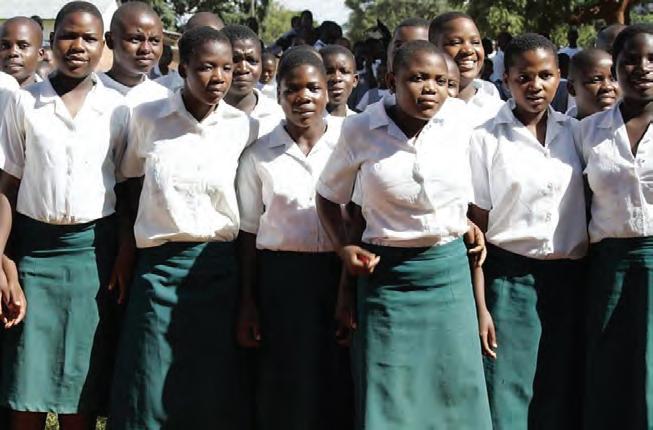

But those high fertility rates are turning African countries into the world’s last great harbor of young people. This year, one out of every three children born in the entire world will be born in Africa. In 2040, as a result, one of every three people in the world between the ages of 15 and 24 will be an African. By 2050, the prime-age working population of Africa will be five times as large as that of Europe, and larger than that of India and China combined. Another way to view the coming decades is to note that the entire world’s primeage working population will increase by 428 million between 2020 and 2040. Of that increase, 420 million will be in Africa; 8 million will be the net increase in that age group in the entire rest of the world. In the coming era, African youth will account for 98 percent of all the net labor-force growth in the world.
In the West, these data and projections are often used to arouse fear of uncontrolled immigration and of Europe being overwhelmed or transformed by non-Europeans. That is a rather unfortunate way of seeing the continent. Africa’s youth are not a threat, but a remarkable opportunity upon which the prosperity of the entire world depends.
Africa’s fertility rate is roughly double that of the rest of the world.
It is important to recall that in 1980, China was desperately poor and even less developed than Africa is today. China’s 1980 GDP of $423 billion was barely larger than that of the Netherlands, and its GDP per capita was $431 per year, just half of Ethiopia’s today. Over the next 40 years, China expanded its prime-age working population by over 200 million people, equipped them with the tools to be more productive, drew in global investment, and expanded its economy 30-fold. In the next 20 years, African countries will increase their prime-age working population by 400 million workers. If over the next 40 years even half of them achieve the same productivity gains as China (or all of them achieve on average half of China’s productivity gains), Africa would increase its GDP 15-fold, a gain of $52 trillion, which would produce a 60 percent increase over the world’s total GDP in 2021.
Of course, it may seem unlikely that the 54 diverse countries on the continent could together produce a productivity miracle like that of China. But in 1980, the idea that communist China would soon have an economy rivaling that of all of Europe or the United States would have seemed ridiculous. At the same time, Bangladesh was dismissed as a hopelessly overcrowded and impoverished “basket case”; yet Bangladesh, despite lacking any of the natural and energy resources that Africa has in abundance, has grown its GDP fivefold in the last 30 years; its GDP per capita is now greater than India’s. If Africa can achieve even Bangladesh-level growth over the next 30 years, it would add $15 trillion to
see page 44
43 July-August 2023 DAWN www.africabusinessassociation.org
Development - Positive Prospects for Africa

from page 43
the global economy— about the same contribution as China made from 1980 to 2020. Such rates of growth are not fantastical. From 1980 to 2020, sub-Saharan Africa tripled its GDP from $600 billion to $1.9 trillion. From 2000 to 2020, Nigeria nearly tripled its GDP; Ethiopia’s has grown fivefold in that period. If these countries can build on this performance and carry other African economies with them through greater regional integration, a generation of young Africans can create a global boom. No other region of the world can produce anything like the potential growth of Africa.
Greener On The Other Side
The world economy needs Africa’s economic growth; but it also needs Africa to take a different path than did China. The Asian giant followed the West’s pattern of early industrialization: grow quick and dirty and worry about the consequences later. Driven for years by coal, China’s economic success has also been an environmental disaster. Since 2005, China has been the world’s largest emitter of greenhouse gases. Although Africa’s carbon emissions today are tiny, its development could rapidly add dangerous levels of greenhouse gases to the atmosphere, undoing the benefits that come with reductions made by other countries.
Growth in Africa must be clean, both in terms of generating energy and not despoiling the continent’s landscape and natural resources. Fortunately for Africa, the continent not only has plentiful sources of hydro, solar, wind, tidal, and
geothermal power, it can also reap the benefits of technological advances that have lowered the price of clean energy by an order of magnitude from just a decade ago. Indeed, in most places, renewable power is now cheaper than burning coal. New methods of large-scale energy storage, from stored hydropower and pressurized gas to improved batteries and capacitors, will soon make it possible to overcome the intermittency problems that plague solar and wind power. African leaders already recognize the need for clean development. The Kigali Communiqué, “Ensuring a Just and Equitable Energy Transition in Africa,” signed by ten African countries in May 2022, and the African Common Position on Energy Access and Just Transition, led by the African Union Commission, both present a vision for Africa’s energy future of development and job creation based on clean energy, powered by sustainable electricity production. With sufficient support from multilateral and external sources, including private investment, African leaders will be able and willing to pursue this vision.
The energy and environment expert Kelly Sims Gallagher has suggested establishing a Green Bank, an institution similar to the World Bank that would specialize in financing green energy projects in developing countries with grants and low-interest loans. Today, most efforts to tackle climate change focus on reducing the emissions of the largest greenhouse gas producers. Although those reductions are essential, they will also be futile unless the world’s fastest growing populations and most rapidly growing economies find a cleaner path.
https://www.msn.com/en-xl/news/other/the-globaleconomy-s-future-depends-on-africa/ar-AA1bteL9
Source and artcle continuation: https://www. foreignaffairs.com/africa/global-economys-futuredepends-africa
Image credit: pxhere.com, BBC, The Christian Science Monitor, mercyworld.org
44 July-August 2023 DAWN www.africabusinessassociation.org
Africa is "Next China"
AtAge14,WilliamKamkwamba Built a Windmill to Generate ElectricityinMalawi—Now,He's SupportingYouthInventions
By Ngozi Nwanji
“When your crops are caught on fire, you don’t wait for somebody to put it [out]. You are the one who faces the heat.”
THE PROVERB from William Kamkwamba’s grandmother lit a fire in him to strive to take action himself to create solutions. From a very young age, the Malawi native’s mind was always filled with curiosity. His vivid imagination as a child had him taking apart radios because he initially thought tiny people were talking inside of them.
While successful in putting them back together, Kamkwamba faced the challenge of having no electricity at home. What’s more, from 2000 to 2001, Malawi had a drought that caused withering crops, which left the residents facing hunger. Due to the drastic impact on the country, Kamkwamba’s parents also couldn’t afford his studies, leading him to drop out of secondary school. However, his thirst for knowledge was still alive and well.

“I started going to the library where I found a book that had pictures of a windmill on the cover,” Kamkwamba recalled to AfroTech. “When I opened the inside, they said windmills pump water and generate electricity. Pumping water really attracted my attention because I [thought] if I can build a windmill to pump water, I can solve the problem.”
However, he didn’t have the parts to create a windmill that pumped water. So instead, at age 14, Kamkwamba built a windmill from spare parts and scraps to generate electricity. The teen watched the impact of his creation firsthand as people in his village began using it to charge their cell phones and showed an interest in learning how to build a windmill for their own homes. Kamkwamba’s true story birthed his New York Times bestseller, “The Boy Who Harnessed the Wind: Creating Currents of Electricity and Hope,” which was published in 2009.
Prior to the book’s release, Kamkwamba had a TED Talk titled, “How I Built a Windmill,” in 2007.
Then, the TED fellow returned for “How I Harnessed the Wind.” Connecting with the TED community led him to co-found the Moving Windmills Project . The organization aims to give youth the opportunity to grow their innovative design ideas through the support of mentorship. In addition, Kamkwamba and his team are working to build an innovation center for children across Malawi
“We want to build this space where we are gonna be able to bring in young people from all over the country to build a community of changemakers,” he said. “Solutions sometimes don’t have to come from somewhere else, but solution is within us. If we can be able to work together as a community, we can be able to figure out what best solution works for our challenges.”
On Kamkwamba’s list of efforts, he is working with the young people on using electric motorcycles to help bring people from different areas to his organization to receive learning and guidance.
“It’s changing the way we are doing our work,” Kamkwamba shared. “And we are hoping by continuing to do that, we are gonna also be involved a lot in designing farming tools. They’re gonna be electric and we can charge using the solar power so that everything will be renewable.”
https://afrotech.com/william-kamkwamba-windmillmalawi
Image credit: Bobby Longoria
Development - Fostering Inventions 45 July-August 2023 DAWN www.africabusinessassociation.org
William Kamkwamba
African Diaspora Leadership for the Growth to 2.5 Billion: An Opportunity for Engagement
By Nii Simmonds and Gabrielle Gueye
THE PAST YEAR HAS BEEN challenging and turbulent for many frontier markets in Africa. In 2022, African economies met headwinds of inflation, the aftermath of the COVID-19 pandemic, and sovereign debt challenges. This led to a decrease in demand for African goods and services, as well as reduced investment in the continent. In addition, many African countries rely heavily on exports of raw materials and commodities, which are subject to global price fluctuations, making their economies vulnerable to external shocks. Overall, while Africa has made significant progress in recent years, it still faces significant challenges in terms of trade and economy. Due to all of these challenges, the estimated average real GDP growth rate fell from 4.8% in 2021 to 3.8% in 2022.
Despite this, a large number of Africans living abroad continue to support, provide technical assistance, and transfer money to their home nations for trade and development. Given this reality, the African diaspora ought to be leading the drive for the continent’s economic development. In addition, African countries should establish mechanisms to engage their diasporas as a force multiplier for sustainable development. In this piece, we look at four areas where the African diaspora could support the continent’s sustainable development: trade, especially under the African Continental Free Trade Area; innovative research and development; investment; and peace and security.
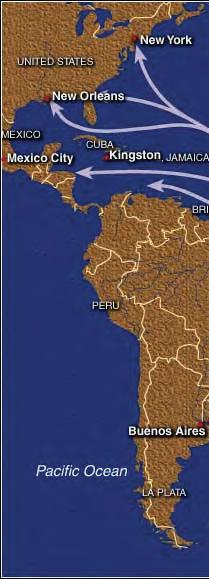
African trade and AfCFTA
The new African Continental Free Trade Area (AfCFTA) has ushered in the potential to connect a vast continent through a free trade zone.
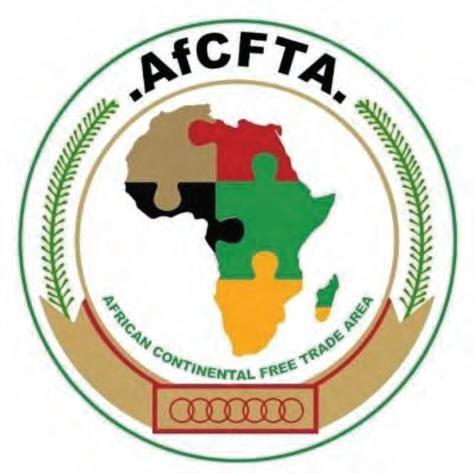
Furthermore, many believe that the AfCFTA will be a crucial step in the growth of commerce and employment prospects in Africa. The AfCFTA aims to create a single market for goods and services across the continent, allowing for greater trade and investment flows between African countries. In reality, African consumers, entrepreneurs, and enterprises would be free to trade and conduct business among all 54 countries duty-free, leading to increased economic growth and job creation across the continent.
The agreement is also expected to boost intraAfrican trade, which has historically been low due to tariffs, non-tariff barriers, and lack of infrastructure. By removing these barriers and creating a more integrated market, the AfCFTA could help African countries to become more competitive and to diversify their exports. The agreement is also expected to promote industrialization in Africa, as it would allow countries to take advantage of economies of scale and to develop new industries. More jobs would be created as a result, and youth would gain new skills all throughout the continent.
Development - Commentary 46 July-August 2023 DAWN www.africabusinessassociation.org
For the AfCFTA to be successful, it is essential to ensure visa-free access and frictionless travel, logistics, and supply chains. Several diasporans with international expertise can help with this; it will be essential to ensure that AfcFTA achieves the desired goals of boosting trade and employment by offering advice and technical support on logistics and supply chains.

Supporting 2.5 billion people by 2050 through innovative R&D
African countries must build innovative research and development (R&D) capabilities in order to become self-sufficient by 2050, when the continent's population will approach 2.5 billion people. To support the 2.5 billion future dwellers, it will be essential for African countries to produce new crop varieties for food and nutrition, ensure food security through cold storage and warehousing, and develop African solutions in medicine and health. Several Africans living abroad have supported efforts to secure food on the continent by moving back to the continent
and offering technical assistance and investment. One example is Jerry Parkes, the managing director of Injaro Investments, a private equity company that focuses on agriculture and other rapidly expanding industries.
Diaspora-led investments: venture investing, scaling entrepreneurship, and emerging technologies
Despite a global downturn, African venture financing (debt and equity) grew by over 8 percent to US$6.5 billion in 2022. Many new venture funds are managed and run by African diaspora professionals, working between highincome countries and African capitals to make business deals. The diaspora starting businesses with venture capital will spur job growth, increase disposable income, boost GDPs, and bolster tax revenue for social assistance and the poorer members of society. As a result, new businesses in fintech, agtech, media, health, and medical sectors are being developed using cutting-edge emerging technologies like artificial intelligence (AI).
To meet and achieve the SDGs, African countries must invest in early-child development, healthcare, and create meaningful jobs for young adults. Some people who have returned from the diaspora are creating jobs through business and entrepreneurship, like the Ghanaian Fred Swaniker. who founded The Room, a talent firm that connects, vets, and trains freelance software engineers, cloud developers, financial analysts, and administrative talent.
The diaspora can play a significant role in achieving the SDGs, harnessing AfCFTA, bolstering African economies, and helping African countries weather the shocks they encounter because of uncertainties and global events through impact and social investment. While the African diaspora is seen as an important stakeholder in development, members of the diaspora are seldom seen as impact and social investors. The global
see page 48
47 July-August 2023 DAWN www.africabusinessassociation.org
Engagement from page 47
impact investing market is $1.164 trillion; imagine how that number could grow if investors from the African diaspora were considered significant contributors. This impact capital has the potential to create livelihoods, drive economic advancement, and tackle challenges that are underfunded by
The African continent will need to develop African solutions for African challenges and engage its diaspora professionals more than ever as its population increases from 1.4 billion to 2.5 billion by 2050. Ireland, Israel, and India have all successfully utilized their professional diasporas as a force multiplier. The world now knows that India is the number one producer of vaccines.
development and philanthropic dollars. In order to actualize diaspora led investment on the African continent, the impact investing market must acknowledge, trust, and collaborate with those investors to change the perceptions of risk and value in investing in emerging markets.
Securing Africa’s Future: fragility and security
From coups in Burkina Faso and Guinea, to conflicts in Mali, the Democratic Republic of Congo (DRC), and Somalia, the year of 2022 ushered in instability and stagnant growth in these countries and their neighbors. While the African continent has been relatively stable compared to the 1990s, it still has a way to go to support peace and security. The diaspora should play a role in sustaining peace, and very well can by importing expertise, know-how, and resources from their host countries. For instance, a diasporan with experience in the military and peacekeeping could promote and advance widely recognized democratic values to reduce instability and conflict.
Ongoing diaspora engagement
How did India do this? The answer lies in the India diaspora—the Indian nationals who brought back their skills, know-how, finances, and gumption to take risks in life sciences, industrials, technology, chemicals, and telecoms to make India a global economic power. The divide between the rich and poor in India remains large, but India’s middle class has grown in the last couple of decades. If India can engage its diaspora professionals to great effect, why can’t African countries do similar?
Disclaimer
CGD blog posts reflect the views of the authors, drawing on prior research and experience in their areas of expertise. CGD is a nonpartisan, independent organization and does not take institutional positions.
https://www.cgdev.org/blog/african-diasporaleadership-growth-25-billion-opportunityengagement
Image credit: africabriefing.org, blogspot.com, blogs.umass.edu
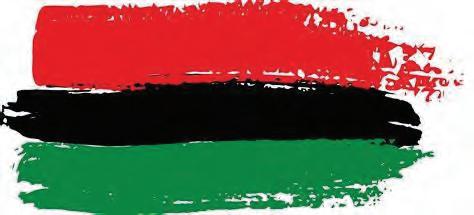
48 July-August 2023 DAWN www.africabusinessassociation.org
Development - Commentary
Nelson Mandela International Day!
July 18th
From the Newsletter of "Nifty Fifty and More"


Greetings Tribe,
TODAY IS Nelson Mandela International Day! We could not let it pass without making mention of this hero.
For today July 18, Nelson Mandela International Day, the leader’s birthday, we spoke with Detroitborn multi-media artist/quilter April Shipp who recalls visiting the Mandela home in Johannesburg with a slight shudder, saying “The bricks are still scorched from the fire-bombing.”
Nelson Mandela was incarcerated for 27 years for opposing the deeply racist apartheid government of his native South Africa. While held in maximum security, he refused numerous offers of freedom in exchange for political compromise. A Xhosa, Mandela was born into Thembu royalty and is remembered in his homeland by his clanname Madiba, and recognized by the world as “Father of the Nation.” Early in life, he surrendered his prestigious title of clan chief to study law and join the African National Congress. Among his hundreds of accolades, Mandela was awarded the Nobel Peace Prize in 1993 and served as South Africa’s first Black President between 1994 - 1995. The titles of his books say it all: “I Am Prepared to Die,” “No Easy Walk to Freedom,” and “The Struggle Is My Life.”
April Shipp made her Mandela quilt in 2014, for a client who bailed on paying her (modestly) for the stunning fabric montage. Then, seemingly by divine design, a mentor invited her to an art exhibit in Johannesburg honoring Mandela’s birthday. Shipp crossed the Atlantic


twice with the quilt, which is still in her possession today.
“I create, as God’s favored daughter,” says the artist. Another of her extraordinary quilts reflecting America’s own apartheid, “Strange Fruit,” displays the embroidered names of Black Americans who were lynched. Each name is embroidered in gold thread, expressing the preciousness of each life so cruelly taken.
To honor Mandela, commit your golden years to social justice. This commitment may take many forms. It can start with demanding accountability and transparency from our government. Active civic engagement follows suit. Invest in Blackowned small businesses versus huge corporate conglomerates. Demand diversity, equity, and inclusion in all aspects of life. Work with your community and others to implement reparations to close the racial wealth gap.
Nelson Mandela broke the back of legal apartheid in South Africa and awakened the world to the looming need for social justice everywhere. And, we’re still on the journey.
Reminder
Follow April Ship @Aprilanue
credit: April Shipp, clipart.info 49 July-August 2023 DAWN www.africabusinessassociation.org
https://fiftyniftyandmore.com
Image
AtlasE-MobilityGroupLaunchingtheFirstAfricanDesignedandEngineeredBEV(BatteryElectricVehicle) Source Carsite
ATLAS E-MOBILITY GROUP (ATLAS), a new global Anglo-Moroccan technology company, has today announced its mission to launch the first African-designed and engineered BEV (Battery Electric Vehicle) and revolutionise the future of affordable zero-emission mobility.
Headquartered in London, UK, with state-ofthe-art manufacturing and development facilities planned for Morocco, one of the world’s fastestgrowing and advanced global automotive hubs, ATLAS will utilise a unique blend of British automotive industrialisation expertise, disruptive Moroccan technology, and proven manufacturing capability.

This combination will be leveraged to create a superior-engineered, affordable, all-electric vehicle inspired by Moroccan design and identity to offer a unique appeal to customers in Europe, the Middle East, and Africa (EMEA) markets initially, with production scheduled for 2026.
ATLAS was co-founded by Mohammed Yehya EL BAKKALI, the company CEO, and Mohammed Hicham SENHAJI HANNOUN, the company’s Executive Chairman and CTO, with substantial private funding.
The pair combine a visionary approach with a strategic understanding of the need for practical, pragmatic, and viable solutions, particularly in emerging markets with little or no EV infrastructure. In addition to creating electric vehicles, the group’s offer will extend to advanced range-enhancing technology, battery and charging networks, further specific details of which will be announced in due course.
The company will shortly announce an advisory board, encompassing globally renowned experts in several key sectors, including luminaries of the automotive industry.
Mohammed Yehya EL BAKKALI, Co-Founder and CEO of ATLAS E-MOBILITY GROUP, said:
“We feel strongly that Africa is being ignored by companies in the EV transition. However, no one should underestimate the continent’s determination to advance nor doubt its ability to produce worldleading zero-carbon-free technological solutions. In the field of transportation, these will prove pivotal to helping limit the rise in global temperatures to less than two degrees Celsius.
“ATLAS was born to harness the Moroccan spirit of endeavour, tech inventiveness, and longstanding reputation for excellence in global vehicle manufacturing. Combined with British automotive industrialisation expertise and utilising a proven EV architecture from an established OEM, ATLAS will create a vehicle that delivers enterprise, environmental and social value to Africa and beyond, and offers the quality, design and features expected by customers across the globe.”
Mohammed Hicham SENHAJI HANNOUN, Co-Founder and Chief Technology Officer, said: “We do not underestimate the magnitude, or the
50 July-August 2023 DAWN www.africabusinessassociation.org Development
complexity of the undertaking required to help end the era of fossil-fuel-dependent mobility in Africa. Simply creating an all-electric vehicle on its own will not prove sufficient.
“That is why ATLAS does not just wish to simply produce EVs – we are determined to go further and be part of a solution that delivers sustainable economic and environmental benefits to Africa and beyond. Together with our global partners, we will deliver a strategic road map to create a wide arc of advanced range-enhancing technologies, battery, and charging infrastructure to render zeroemission mobility a viable proposition for all.
“In the last 20 years and under the leadership of His Majesty King Mohammed VI, Morocco has been growing rapidly as a manufacturing centre for global automotive brands, and now ATLAS will take that to the next stage, with a company built on proud Moroccan heritage and engineering and manufacturing values, exporting an African electric car to the world.”

About ATLAS
Mohammed Hicham SENHAJI HANNOUN (Executive Chairman and CTO). Headquartered in London, UK, with state-of-the-art production facilities in Morocco, the company will introduce the first African-designed and engineered EV to global markets in 2027.
ATLAS is bolstered by an advisory board of seasoned global automotive OEM, technology, manufacturing, and finance senior leaders. The company combines British automotive industrialisation expertise with proven Moroccan manufacturing capability. It will utilise proven OEM EV Architecture and best-in-class global industrial and academic partnerships to create groundbreaking BEVs. Adopting a pragmatic, holistic strategy for the propagation and democratisation of zero-emission mobility, ATLAS will also offer a suite of proprietorial range-enhancing technologies along with battery and charging infrastructure solutions.
https://carsite.co.za/atlas-e-mobility-group/
Background information: https://www. mordorintelligence.com/industry-reports/moroccoautomotive-industry-outlook

 Mohammed Yehya EL BAKKALI (CEO) and
Mohammed Yehya EL BAKKALI (CEO) and
ATLAS E-MOBILITY GROUP (ATLAS) was conceived in 2021 with substantial private funding by
Image credit: moroccolatestnews.com, The Financial Times, Atlas

51 July-August 2023 DAWN www.africabusinessassociation.org
Agriculture - More Mushrooms Needed

5 Things I Ate at an Event for Cutting-edge Vegan Food
By Kristin Toussaint
OYSTERS, WAGYU BEEF, AND BLUE
CHEESE sound like items that belong on the menu at a fine-dining steak house. They were also offerings at the recent Vegan Women Summit, a showcase of plant-based foods recently held in New York City.

The event (which was open to all genders and included companies founded by men) featured panels, book signings, and, most enticingly, tastings—from MeliBio’s vegan honey to MyBacon to more fungi alternatives from Nature’s Fynd Event sponsors Impossible Foods and Tindle were there, so plant-based staples like chicken nuggets and breakfast sausages were also on offer.
It’s increasingly clear that the space for alternative meat and dairy is branching out and trying to replace every animal ingredient in our food system. The industry is growing rapidly, and it has the potential to top $162 billion globally by 2030 with impressive products like these five standouts— and many others.
CLIMAX FOODS CHEESES
Climax Foods is already making a name for itself in the vegan cheese space, having recently partnered with Bel Group, the company behind brands like Babybel, Laughing Cow, and Boursin.
Caroline Sorlin, Bel’s chief venture officer, told me that when she first tried Climax’s blue cheese, she couldn’t distinguish it from dairy—even the quality she’s “used to eating in France.”
I had high expectations, and Climax met them:
Its blue cheese is creamy, with the same bright rivulets of mold running through it that you’d expect from a dairy version, sharp funk included.

It’s almost easier to say what it doesn’t have: no hints of coconut or artificial aftertaste, no grittiness or plastic-y texture. And that was true for all the Climax cheeses I tried: an in-oil feta that melted in my mouth and was the right level of salty; a soft goat cheese that had that familiar tang; and a buttery Brie that even had an earthy rind around its edge. Climax is focusing on artisanal cheeses, and its products are set to appear on some Michelinrated menus in California and Baltimore soon, and eventually in grocery stores and specialty retailers later this year.
PEARLITA OYSTERS
There’s a very tactile experience to eating a raw oyster: squeezing a slice of lemon over the plate, picking up the rough, textured shell, and tipping your head back to slurp it all down. Eating a plant-based oyster from Pearlita hits all those notes. At the event, the oysters, made of mushroom and seaweed, were even served in sterilized, recycled oyster shells (the company also serves them in ceramic shells). Pearlita returns discarded shells to oyster reef restoration projects.
The plant-based oyster certainly looks real, and though it has a distinct mushroom, umami flavor, it’s also pleasantly briny and fresh. Pearlita is working on cultivated oysters too, but in the meantime the mushrooms are a tasty alternative.

52 July-August 2023 DAWN www.africabusinessassociation.org
cheeseiscreamywiththesamebrighht
IMPACT FOOD TUNA SASHIMI
Another raw seafood offering was the tuna sashimi from Impact Food, a plant-based sushi-grade tuna meant to go into poke bowls and sushi rolls. At the summit, the tuna was served with a soy-ginger marinade and with pieces of corn and edamame.

The tuna chunks are a bright beet red, and chewy but also firm. There’s a slightly fishy taste, though not in a bad way; that flavor comes from algae, which also gives the plant-based tuna omega3s. Pea protein and vegetable juice are the other main ingredients. The texture here is key: soft and smooth but with a firm enough bite, something that’s hard to replicate with tofu, which tends to be spongy, or with vegetables, which are my go-to sushi fillings.
That’s a plight Impact Food’s founders understand: “People don’t want to go to a poke restaurant or a sushi restaurant and just order the avocado roll,” cofounder Kelly Pan told me. Impact’s tuna is already on the menu at Onigilly, a San Francisco-based (and not entirely vegan) Japanese restaurant.
OHAYO VALLEY WAGYU
Ohayo Valley is also working on cultivated meat, but starting with wagyu, the Japanese beef known for being soft, fatty, and flavorful. “I thought that creating a highly decadent, flavorful product would be an interesting challenge,” says Ohayo Valley founder Jess Krieger, who has been working on cultivated meat since 2010. “The holy grail of cultivated meat is steak, so we’re focused on developing a wagyu steak product.” At the summit, Ohayo Valley offered a wagyu burger, and
I’ll admit I was nervous to try it; I haven’t eaten real meat in more than 15 years.

Ohayo Valley takes tissue biopsied from a cow and grows that tissue using cell culture technology, but its wagyu burger is also blended with plantbased protein and fat, which provides structure and mouthfeel, Krieger says. That fattiness comes through—the wagyu is almost buttery and melts in your mouth—as does the beef flavor, and without the strange aftertaste you might get with an all-soy burger.
NEGGST FRIED EGG

WhenVerónica García Arteaga, CEO of Berlin-based Neggst Foods, fried up my egg, she tipped a container of plant-based egg white and yolk that oozed into the pan. But in the future, you might be able to crack an actual shell to begin cooking a Neggst egg; the company is working on a biodegradable eggshell in which to encase its peaprotein and fava-bean-protein eggs. (Neggst has made prototypes but doesn’t yet have a machine to mass produce the shells.) The goal is to offer a vegan egg that has as many real applications as those from chickens: scrambled, fried, used in baking.
I tried a Neggst egg fried over a piece of toast, and the white was slightly thick and firm, with a mild flavor. The yolk, which includes sweet potato, wasn’t the same sort of gooey as the poached egg from Yo Egg, but was still creamy and rich. It wasn’t overly egg-y, but it was definitely reminiscent of the real thing, and almost had a mayonnaise-like flavor and consistency.
https://globalpressjournal.com/africa/democraticrepublic-of-congo/wheat-prices-rise-universitystudents-reimagine-breakfast-staple/ Image credit: Author, Dreamstime
53 July-August 2023 DAWN www.africabusinessassociation.org
Unilever Pivots to African Suppliers as Forex Pressure Mounts
By Seun Sanni and Richa Naidu
BUSARI KASALI once lived with the fear that his cassava - a staple crop in his native Nigeria - would spoil before it got to market. Today, the 76-year-old says his main concern is keeping up with growing demand from consumer goods giant Unilever.

"Things have changed," Kasali said, as his workers loaded trucks with a bumper harvest of the starchy roots destined for processing into toothpaste. He said his earnings have nearly tripled in the past two years.
"We now plant as much as we want ... We know where to sell it."
Amid pandemic-provoked supply chain disruptions, soaring costs and growing currency volatility, Unilever is working to make its African operations more self-reliant, ramping up local sourcing in part to reduce its foreign exchange exposure.
That spells a potential boon for farmers and processors in several parts of Africa, experts say.

Like many global companies, Unilever has grappled with rising energy and raw material costs for the past two years. The war in Ukraine exacerbated supply chain logjams and manufacturing issues that began with the COVID-19 pandemic.
Unilever - which owns brands including Knorr, Hellmann's and Ben & Jerry's - took a more than 4 billion-euro ($4.40 billion) hit on net material inflation last year. And it expects prices for some commodities to surge further the first half of this year.
Managing foreign exchange costs is largely what is driving a pivot to African suppliers, Unilever said, even though sourcing from the continent can cost more than buying from parts of Asia.
Growing debt woes in many African nations have put pressure on foreign reserves and created currency volatility that makes it harder and more expensive to ship in inputs.
"Over 95% of the brands we sell to our (African) consumers are made in African factories," Reginaldo Ecclissato, Unilever's chief business operations and supply chain officer, told Reuters.

"But, until quite recently, we could only source under a third of the inputs we need from within Africa."
Unilever declined to share figures on the scale of its shift in Africa or the overall economic impact.
Today more than two-thirds of the ingredients that go into Unilever products sold in African markets come from the continent, the company said.
54 July-August 2023 DAWN www.africabusinessassociation.org Agriculture
A farmer pulls out cassava during a harvest on a farm in Oyo © Thomson Reuters
A view of the Unilever factory floor in Lagos © Thomson Reuters
A farm on a fa
In particular, it is ramping up sourcing of sorbitol and spiceswhich were previously imported from India and China - from suppliers in countries including South Africa and Nigeria.
Unilever is not alone. Tedd George, a supply chain consultant specialising in Africa, said other companies including Nestle and Danone are also delving deeper into Africa, drawn in part by its rapidly growing consumer market.
They are also seeking to reduce their dependence on China to avoid a future repeat of the paralysis caused by Beijing's tight pandemic lockdowns, he said.
Nestle did not respond to a request for comment for this story, while Danone declined to comment.
"What is happening in China is pushing people to find alternatives," said Pierre-André Térisse, a former Danone executive who ran the dairy giant's Africa business from 2015 to 2018.
"That's an opportunity for Africa."
'GARGANTUAN' POTENTIAL
While Unilever launched its push to boost sourcing from Africa four years ago, the plan accelerated during the pandemic, Ecclissato said.
In South Africa, for example, it's developed a smallholder farmer network to grow coriander and chilies for its local Roberstons spices brands, Rajah curry blends and Knorrox bouillon cubes, replacing spices previously sourced in India.
In Nigeria, where its Lagos factory produces 10,000 to 14,000 tonnes of CloseUp and Pepsodent toothpaste annually, Unilever is ramping up local sourcing of sorbitol, an ingredient previously brought in from China that can be extracted from cassava.
Yemisi Iranloye, whose company Psaltry International in Oyo State processes cassava from
around 10,000 farmers including Busari Kasali, is cashing in on the shift.
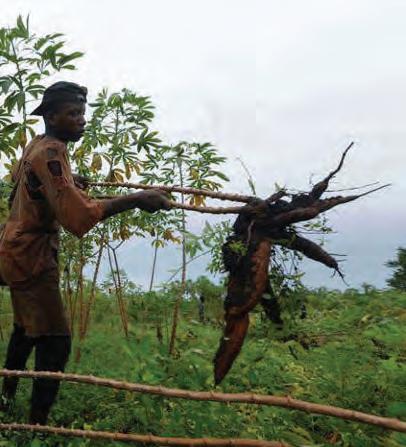
Having started supplying Unilever with sorbitol only late last year, the multi-national now buys around 70% of Iranloye's sorbitol production, accounting for some 40% of Psaltry's total turnover.
Unilever's Ecclissato said buying local allows for closer supplier partnerships, shipping savings and a reduced carbon footprint. Importantly, it also reduces the foreign exchange required to pay for imports.
For a company like Unilever, whose Nigeria business alone reported turnover of 70.5 billion Nigerian naira ($153 million) in 2021, the cost of sourcing those dollars can add up fast.
Iranloye, who also supplies Nestle and Danone, thinks that desire to hedge against dollar scarcity and local currency fluctuations is fueling demand from all her customers. She expects Psaltry's turnover to more than double this year.
"It also means better livelihood for the populace on the continent, especially the farmers," she said, as, nearby, machines washed a newly arrived load of cassava.
Still, while Unilever's size and reach could make it a transformative force in Africa, some, like Tedd George, argue it's not yet clear whether the company is leveraging its full might.
"Where is it on the scale of African trade? Where is it on the scale of Unilever's supply chain?" he said. "Because the thing is Unilever, they're absolutely gargantuan."
Africa's own capacity to produce raw materialsparticularly agricultural commodities - may also be a limiting factor, at least for now.
Iranloye recently upgraded her cassava processing facility to keep up with growing demand, including from Unilever. But it's currently only operating at around 60% of capacity.
"We still don't have enough cassava," she said. "Raw material is a challenge. Farmers need to be properly funded.
($1 = 460.0000 naira) / ($1 = 0.9084 euros)
https://www.msn.com/en-us/money/markets/unileverpivots-to-african-suppliers-as-forex-pressure-mounts/ ar-AA1bW3Na
55 July-August 2023 DAWN www.africabusinessassociation.org
mer pulls out cassava during a harvest arm in Oyo © Thomson Reuters
Nestlé has Changed its Mind About Using Offsets to Become Carbon-neutral
By Michelle Cheng
UNDER PRESSURE TO TAKE ACTION on its environmental impact amid worsening climate change, Nestlé, the world’s biggest food manufacturer, is ditching the practice of purchasing carbon offsets. Instead, it will make investments to cut greenhouse gas emissions in its own operations and supply chains.
Nestlé still aims to hit its net-zero emissions target by 2050. The Swiss food giant says it’s working on sourcing 50% of its key ingredients via regenerative agriculture by 2030, as well as investing in more sustainable logistics, packaging, and manufacturing.
Regenerative agriculture
Our Net Zero Roadmap shows that nearly twothirds of our greenhouse gas emissions come from agriculture, so addressing these emissions is essential. One of the most important things we are doing is introducing the concept of regenerative agriculture – an initiative with incredible potential for helping address climate change while supporting communities and protecting, preserving and restoring natural resources.
Regenerative agriculture is an approach to farming that aims to improve soil health and soil fertility – as well as protecting water resources and biodiversity. Restoring soil health helps capture increased levels of carbon from the atmosphere in soils and plant biomass. Healthier soils are also more resilient to the impacts of climate change and can increase productivity of crops, helping improve farmers’ livelihoods and enhancing food security.
Regenerative agriculture at Nestlé
We know that regenerative agriculture plays a critical role in improving soil health, restoring water cycles and increasing biodiversity. These outcomes form the foundation of sustainable food systems and contribute to achieving our ambitious climate targets. This is why Nestlé is investing CHF 1.2 billion by 2025 to spark regenerative agriculture across our supply chain.
In 2022, we developed the Nestlé Regenerative Agriculture Framework, guided by agro-ecological principles and practices. It is a holistic model that considers healthy, organically rich soil as a nexus to protect and restore land.
Our strategy begins with pilot studies at farms to validate new technologies and nature-based solutions. As pilots prove successful, we expand into reference farms of ‘agripreneurs’, or entrepreneurial farmers, in different countries and regions, as soils and climate requirements differ. From reference farms we aim to scale the approach to the larger agripreneur community, helping to further advance and improve their business models. We plan to roll this approach out at scale through our Farmer Connect program.
We are also encouraging industry alignment on common frameworks and metrics for regenerative agriculture.
A just transition
Regenerative food systems put people at the center, supporting solutions that are right for their regions and crops. This is why our 700+ sourcing specialists and more than 5500 support staff are assisting with the transition. The aim is to provide resilient and fair livelihoods and dignified work
56 July-Augustl 2023 DAWN www.africabusinessassociation.org Agriculture
that enable people across the world to support themselves and their families.

The path to achieving more regenerative agriculture systems is a long-term journey. This is why we continue to help farmers by offering investment, rewarding good practices and offering technical and scientific guidance. This, together with the respect and promotion of human rights, will contribute to a just transition to regenerative food systems.
We're working hard to support farmers through the transition to a regenerative food system, by:
• Protecting and promoting human rights
• Providing state-of-the-art science and technical assistance
• Offering investment support
• Paying premiums for regenerative agriculture goods
Our income accelerator program for cocoa farmers and pilot financial support scheme for coffee farmers in Mexico, Côte d’Ivoire and Indonesia are good examples.
https://qz.com/nestle-has-changed-its-mind-aboutusing-offsets-to-beco-1850592939
https://www.nestle.com/sustainability/natureenvironment/regenerative-agriculture
Image credit: Nestle
This article was edited by the Dawn Team
57 July-August 2023 DAWN www.africabusinessassociation.org
Tap African Knowledge and Culture for Congo Basin Fore Conservation (Commentary)
By Sylvie Djacbou Deugoue, Mongabay
WHEN GROWING UP in the Congo Basin forest, I witnessed the consequences of forest destruction by logging and industrial agricultural plantations. In some areas, Indigenous communities used to live alongside a rich ecosystem, but now they have been displaced and the wildlife has disappeared. But the authorities are doing little to prevent this corporate violence.

This devastation is happening on a global level, too. In March 2023, the final installment of the Intergovernmental Panel on Climate Change’s (IPCC) Sixth Assessment Report, was released. This report details the devastating consequences of rising greenhouse gas emissions around the world — the destruction of homes, the loss of livelihoods, and the fragmentation of communities, for example — as well as the increasingly dangerous and irreversible risks, should we fail to change course.
That global problem has a local solution. We need to tap into our African culture to save the Congo Basin forest.
One of the key ways to save the Congo Basin forest is to engage the local communities which live in and around the area. African culture is deeply rooted in the land, and local communities have a strong connection to the forest. We must embrace our African and forest communities’ culture and traditional knowledge. Educating them about the importance of the forest and how their actions can impact its health is crucial to its survival. Involving them in conservation efforts, such as climate policy design, sustainable forestry and eco-tourism, can provide alternative livelihoods while preserving the forest. That is one of the ways we can stop the forest destruction in the Congo Basin, and it’s how we can address the challenges of climate change, communities’ rights, biodiversity loss and damaging economic development models.
Another key way also involves emphasizing
the spiritual connection to nature. Many African cultures have a strong spiritual connection to nature and view the forest as a sacred space. By emphasizing this connection, the importance of preserving the forest for future generations can be highlighted. This approach can be particularly effective in reaching out to traditional leaders and religious groups, who can play a significant role in promoting conservation efforts. In the meantime we must make sure that communities that are already suffering and paying the price of climate change have access to rapid and adequate financial resources to continue efficient conservation efforts.
Another key way should be the promotion of traditional knowledge and practices. African cultures have a rich history of traditional knowledge and practices related to natural resource management. By promoting these practices, such as agroecological farming and communitybased conservation, the forest can be managed sustainably while preserving local livelihoods. For instance, our forest communities’ technologies and knowledge include the aboriginal practice of lighting
58 July-August 2023 DAWN www.africabusinessassociation.org Agriculture-Conservation Commentary
special fires that are small, low and relatively cool. They are also specialized in farming techniques that are seasonal and generational. If we can learn from this fascinating and complex knowledge that is attuned to nature, and if we enable the communities of our ancient forests to manage their own lands, those ecosystems can thrive once more and the planet can become resilient to the climate crisis.
While promoting these alternative traditional knowledge practices, we should also encourage eco-tourism. Tourism can provide a valuable source of income for local communities while promoting the conservation of the rich Congo Basin forest. By highlighting the unique cultural and natural heritage of the Congo Basin forest, eco-tourism can create a sense of pride and ownership among local communities while providing an economic incentive to conserve the forest.
Our African culture is built on the sense of togetherness, so we must work together with local NGOs, conservation groups and youth associations within the basin to prevent the crises facing the forest and its people. By partnering with
these groups, we can help leverage their expertise and experience while building local capacity. That’s how to save our forest and its people too.
By tapping into African culture and engaging local communities, the conservation of the Congo Basin forest can be achieved in a sustainable and effective manner. For this change to happen, it’s also crucial to change the current, damaging development growth model to a more inclusive and sustainable one.
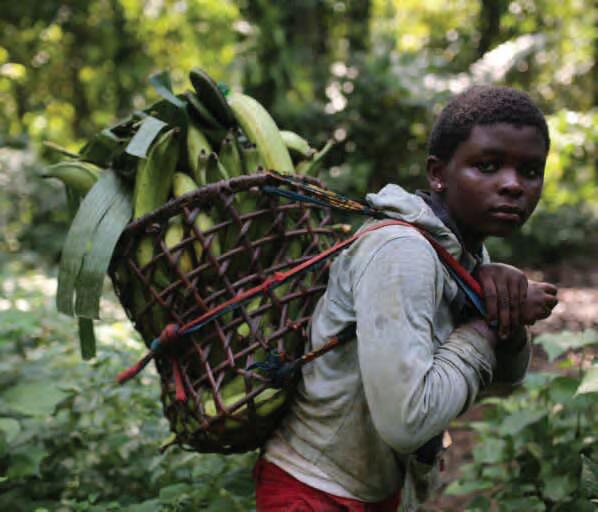

That means prioritizing the forest communities’ economic, social and environmental interests – not neo-colonial exploitation by corporations. Africans have always lived in harmony with nature, and any development plan should enable that – not try to end it.
Forests are priceless.
https://www.msn.com/en-us/news/world/tap-africanknowledge-and-culture-for-congo-basin-forestconservation-commentary/ar-AA1caaUx
Find more coverage of community-based conservation here

est
59 July-August 2023 DAWN www.africabusinessassociation.org
◄ Aerial view of Congo forest at Lokolama/ Penzele around Mbandaka, Équateur province, Democratic Republic of the Congo. Image courtesy of Daniel Beltrá / Greenpeace. © Mongabay
▲ A girl carries sustainably foraged fruits back to her village. Image courtesy of John Novis / Greenpeace. © Mongabay
▲ Farmer Abianga Celine, 40, extracts cocoa beans on a farm in Dikomi-Bafaws. Image by John Novis, Greenpeace.. © Mongabay
Kenya's Tea Pickers are Destroying the Machines Replacing Them
By Martin K.N Siele
KENYAN TEA PICKERS are destroying machines brought in to replace them during violent protests that highlight the challenge faced by workers as more agribusiness companies rely on automation to cut costs.

At least 10 tea-plucking machines have been torched in multiple flashpoints in the past year, according to local media reports. Recent demonstrations have left one protester dead and several injured, including 23 police officers and farm workers. The Kenya Tea Growers Association (K TGA) estimated the cost of damaged machinery at $1.2 million (170 million Kenyan shillings) after nine machines belonging to Ekaterra, makers of the top-selling tea brand Lipton, were destroyed in May.
In March, a local government taskforce recommended that tea companies in Kericho, the country’s largest tea-growing town, adopt a new 60:40 ratio of mechanized tea harvesting to handplucking. The taskforce also wants legislation passed to limit importation of tea harvesting machines. Nicholas Kirui, a member of the taskforce and former CEO of KTGA, told Semafor Africa 30,000 jobs had been lost to mechanization in Kericho county alone over the past decade.
"We did public participation in all the wards and with all the different groups, and the overwhelming sentiment we were hearing was that the machines should go," Kirui said.
In 2021, Kenya exported tea worth $1.2 billion, making it the third-largest tea exporter globally, behind China and Sri Lanka. Multinationals including Browns Investments, George Williamson and Ekaterra — which was sold by Unilever to a private equity firm in July 2022 — plant on an estimated 200,000 acres in Kericho and have all adopted mechanized harvesting.

Some machines can reportedly replace 100 workers. Ekaterra's corporate affairs director in Kenya, Sammy Kirui, told Semafor Africa that mechanization was “critical” to the company’s operations and the global competitiveness of Kenyan tea. As the government taskforce established, one machine can bring the cost of harvesting tea down to 3 cents (4 Kenyan shillings) per kilogram from 11 cents (15.32 shillings) per kilogram with hand-plucking.
Analysts partly attribute Kenya's unemployment rate — the highest in East Africa — to automation in industries, including banking and insurance. Some 13.9% of working age Kenyans (over 16) were out of work or long term unemployed in the final quarter of 2022.
Automation is only going to continue at a breakneck speed, not just in rural Kenya but other sectors in nations across Africa — particularly as artificial intelligence becomes more common. Rage in tea-picking regions could just be an early sign of future tensions if governments and companies don’t find ways to help workers.
The majority of pickers are young, many are women, and they often lack the opportunities and skills to thrive outside the tea sector. Retraining farm workers, as well as creating more jobs and diversifying economies in tea-growing communities, will be key to countering violence and growing anger. "My ministry is keen on opening up the
60 July-August 2023 DAWN www.africabusinessassociation.org
Agriculture
labor market to boost employment opportunities for Kenyans," Labor Cabinet Secretary Florence Bore said during a trip to Kericho, days after the latest wave of attacks in May. She added that efforts were under way to resolve the dispute between locals and tea companies.
The private sector can also play a role in retraining workers. Kirui told me Ekaterra is keen on partnering with local communities on projects including technical and vocational education and training centers (TVETs).
Mechanization makes business sense for tea producers and they are unlikely to ditch teaharvesting machines that lower their costs. But the trend is likely to continue hurting rural communities where farm workers are central to economic activity. Workers and residents will continue to oppose these changes because they lack alternative employment options.
China is the world's largest tea exporter. In a paper calling for more efficient mechanization of tea harvesting in China, published in March, Wu
Luofa of the Institute of Agricultural Engineering at the Jiangxi Academy of Agricultural Science noted that manual tea picking accounts for more than half of the cost of tea production.
"Developing and popularizing tea-picking machines is beneficial to increase labor productivity, reduce labor cost, enhance the market competitiveness of tea products and promote the sustainable development of the tea industry," he said.


Adopting technology and mechanization is key to unlocking the potential of agriculture across Africa and should therefore be embraced, despite the frustrations of some workers, according to Tabitha Njuguna, managing director of African commodities exchange AFEX in Kenya.

"We find that potential disruptions caused by the integration of technology and mechanization can seem initially threatening, however, it is important for all stakeholders (agricultural organizations, farmers, processors) involved to see these as increasingly imminent and unavoidable," she told Semafor Africa.
https://www.semafor.com/article/06/13/2023/ kenya-tea-pickers-destroy-machines
Image credits: finance.uonbi.ac.ke, floridasunreview.com, theguardian.com, dreamstime.com
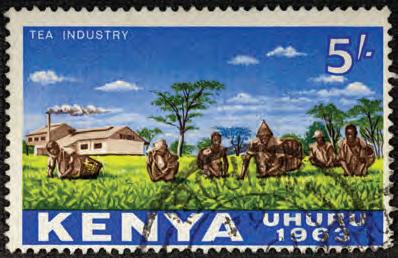
61 July-August 2023 DAWN www.africabusinessassociation.org
Tea Plucking Machine
Pfizer's RSV Vaccine Promise to the Global South is Already Several Years Behind Schedule
By Annalisa Merelli
IT TOOK DECADES, but vaccines for Respiratory Syncytial Virus (RSV), a common respiratory virus that can be serious or deadly in infants and older people, are finally becoming available. On May 3, the US Food and Drug Administration (FDA) approved Arexvy, the first RSV vaccine for adults aged 60 or older, made by GSK.
A second candidate follows closely: Made by Pfizer, it would cover older people and pregnant ones, functioning as a maternal vaccination that would cover children in the first months of life when RSV is most dangerous. The vaccine is expected to be approved in the US by August and become available in Europe a few months after that.
But, despite Pfizer’s promises to do better with regard to vaccine equity after covid, it increasingly looks like the vaccine won’t be available in lowand middle-income countries in the near future. The vast majority of the yearly 100,000 to 200,000 global infant deaths due to RSV occur in the Global South, making the virus the second leading cause of deaths in children below five, after malaria. Yet it may take as long as seven years for the maternal vaccines to be available there.
Pfizer’s long delay
Pfizer expects the global market for its RSV vaccine to be about $2 billion. It received a $27.5 million grant from the Gates Foundation to support the vaccine distribution in low- and middle-income countries, for purchase by governments and international organizations.
Yet it will likely take years for that to happen. In order to be distributed outside rich countries, the vaccines need adjustments—multi-dose vials, for instance, which are cheaper and more efficient to
distribute in areas where transportation may be a challenge. The vials require preservatives, so there is a need for specific trials to ensure efficacy and safety are maintained.
Pfizer, Reuters reports, is only starting to plan for its low-income country distribution now. When contacted by Quartz, the company declined to provide a timeline for making RSV vaccines available in the Global South, but pointed out that it launched a program in August 2022 to make all its vaccines available in 45 lower-income countries on a not-for-profit basis. The program doesn’t have a specific timeline attached to RSV.
Too little too late
The challenges of distribution in lower-income countries are real, but in no way new. Nor are they new for Pfizer. Since 2010, the company has been sitting on the board of the Gavi, the international organization that subsidizes vaccine distribution for low- and middle-income countries, so it is definitely aware of what’s required. Further, Pfizer is currently facing the same hurdles it encountered a decade ago with its pneumococcal vaccine. First approved by the FDA in 2010, the vaccine took several years to be distributed in the Global South. One would hope Pfizer learned lessons about faster vaccine delivery from that process.
62 July-August 2023 DAWN www.africabusinessassociation.org Health
“They should have started planning this from day one when they thought that vaccine was successful,” says Nina Schwalbe, a professor at the Mailman School of Public Health at Columbia University. The high mortality rate of RSV in lowincome countries should have made it a priority, she says.
Pfizer likely started planning RSV vaccine introduction in the US as soon as the candidate showed promise, and should have done the same when it comes to the Global South, starting trials for multi-dose vials, cold chain stability, and other needs long before it received the Gates Foundation grant, says Schwalbe.
“It’s an issue of priorities and incentives within the company about what matters—and what matters is prioritizing profit again,” she says.
https://www.msn.com/en-us/health/medical/ pfizer-s-rsv-vaccine-promise-to-the-global-southis-already-several-years-behind-schedule/arAA1aRGiX

Origin article; https://qz.com/rsv-vaccinepfizer-global-south-1850401425?utm_ source=email&utm_medium=Quartz_Daily_ Brief_US&utm_content=1850413287
Image credit: About.com Health
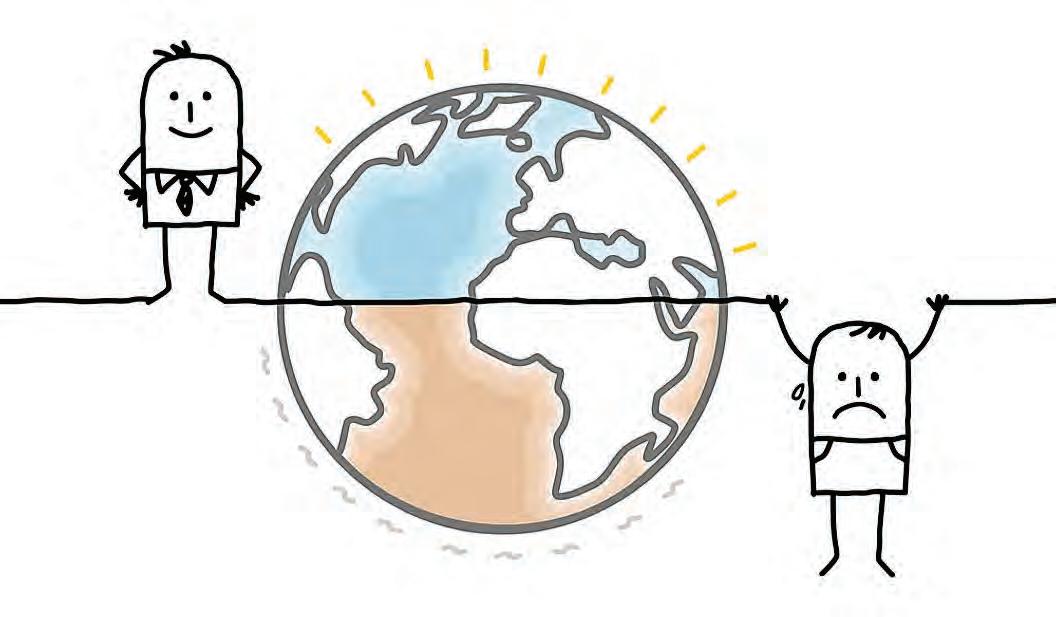
63 July-August 2023 DAWN www.africabusinessassociation.org
What Is The Global South?
How Africa Can Take Charge of Its Drug and Vaccine Supplies
By Janice Kew
AFRICAN COUNTRIES depend on foreign suppliers for as much as 90% of their drugs and 99% of their vaccines, a situation that created widespread shortages during the Covid-19 pandemic.
A robust homegrown industry would help Africa ensure adequate supplies of critical treatments, according to Lamia Tazi, chief executive officer of Société de Thérapeutique Marocaine, Morocco’s biggest pharmaceutical company. Known as Sothema, the drugmaker produces medications through licenses from major pharma companies as well as some of its own compounds.

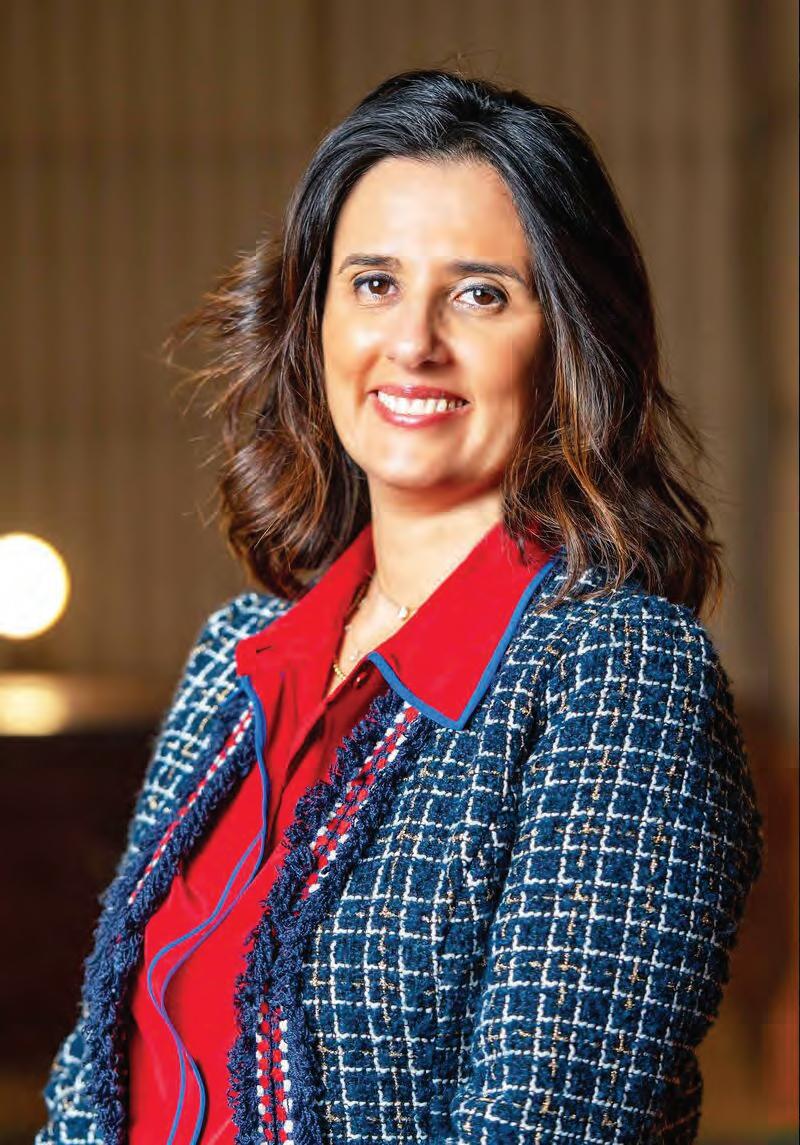
We sat down with Tazi, a 48-year-old pharmacist— and daughter of the company’s founder—to discuss the industry in Africa and Sothema’s plans to expand across the region. This interview has been edited for clarity and length.
What are the biggest challenges facing pharma companies in Africa?
Western companies concentrate on their own markets, meaning Africa has limited access to the pharmaceuticals and vaccines it most needs. So the biggest challenge is to develop that capacity on our own. Having autonomy to manufacture is very important, but it’s not possible to discuss equity and sustainability without talking about intellectualproperty protections, especially when it comes to chronic and endemic diseases. It’s very hard for African countries to develop products at prices that would be acceptable until the patent expires, and that usually takes 20 years.
How did Sothema emerge in such a difficult landscape?
In the 1970s my father, who was also a pharmacist, decided he wanted to sell more than the creams he’d developed. He wanted to create an industrial company. So he went to find partners in Western countries. The first was Eli Lilly & Co. Thanks to this partnership, Sothema became Morocco’s first producer of insulin, and it’s still the only insulin made by an African company in West Africa and the
64 July-August 2023 DAWN www.africabusinessassociation.org Health
Lamia Tazi, CEO of Sothema. Source: Sothema
Maghreb. Over time, we saw the value of exporting our range to the rest of Africa.
What is Sothema’s strategy for overcoming research and development challenges?

What we’ve been doing for almost 50 years is form partnerships for the transfer of new technologies. We now have more than 30 licenses with big multinationals in the US, Europe, Japan and China. As Sothema grew, we started our own generics and biosimilars—our own development. It was very important to us, because once you have enough expertise, you can do it on your own. We are now also manufacturing in Senegal and distributing in nearby countries. Our next challenge is to go into East Africa and Southern Africa. These regions are different from West Africa, with different regulations and climates. But we know there are opportunities there because many countries have limited pharma industries. There it’s more just distribution, and it’s mostly linked to suppliers from India.
How can Africa develop the skilled workforce needed to nurture the sector?
Africa doesn’t need technology. We have that. But we need to work with Western and Asian countries to get the know-how. While Africa doesn’t have budgets for research, it could specialize in other parts, such as clinical trials to show a medicine is safe and effective for humans, and so-called fill and
finish, the final steps of production. This would create many thousands of jobs for African pharmacists, biologists and innovators. African countries also need to get better data on the diseases affecting their people.
What can African governments do to gain greater control over pharmaceutical supplies?
When we talk about vaccines, Morocco did clinical trials with Sothema and manufactured the Covid-19 vaccine—not with AstraZeneca or Pfizer, but with China’s Sinopharm Group. Developing things such as vaccines must happen via true public and private partnerships, because the private sector has the expertise and the public sector has the market. The vaccine alliance Gavi can’t be the final option for Africa, because it’s not pushing for autonomy in African countries. Governments must take responsibility in ensuring local uptake, in creating the demand, in deciding not to merely rely on Gavi or Unicef, but to buy what is produced locally. Another way to boost demand is through universal health insurance, giving people access to funds and the ability to choose where they get care.
https://www.bloomberg.com/news/ articles/2023-07-07/moroccan-drugmakersothema-sot-aims-to-sell-drugs-and-vaccinesacross-africa
Image credit: Sothema, SCMT
65 July-August 2023 DAWN www.africabusinessassociation.org
Allensworth Finds a ‘Source’ for Clean Water
By Reggie Ellis
When former slave turned U.S. Naval officer Col. Allensworth founded the town that bears his name in the southwestern corner of Tulare County, California in 1908, water was gushing just below the surface fed by the Tulare Lake, at one time the largest lake west of Mississippi. The town, located just a few miles from the former lake bed in Corcoran, was prospering with its train station and ample supply of water but its success, and water supply, would begin to run out.
According to the California Department of Parks and Recreation’s history of Allensworth, tributaries of the lake were diverted and the marshes of the former lake were drained and converted to agriculture production in the early 19th Century. Arsenic was soon discovered in Allensworth and the need to drill a well deeper arose. Allensworth himself was working on a plan to negotiate for a deeper well when he was hit by a motorcycle and killed in 1914. Then the community was hit with a drought from 1929-1934, which coincided with the Great Depression and the loss of many jobs for
those in the town who were forced to move to larger cities to look for work. By the 1940s, Allensworth became home to mostly migrant farm workers, who didn’t settle there long and the homes began to deteriorate. By 1972 the population had shrunk to less than 100 and the town was
almost abandoned until 1976, when it was named a state historic park and interest in preserving the town was renewed.
“In Allensworth, we know all too well that water is an issue of social equity,” said long-time resident and community leader Kayode Kadara. “When Colonel Allensworth founded the town, the first in California established and governed exclusively by African Americans, he was told help for the area’s water issue was coming, but it never came.”
TAPPING THE SKY
After 100 years of looking for solutions below their feet, Allensworth is now looking to the sky overhead.

Allensworth is currently collaborating with Source Global, a public benefit corporation whose mission is to innovate drinking water solutions, to out fit the community with two hydropanels.
The panels use solar energy to turn fans that draw ambient air into a hygroscopic, a patented waterabsorbing material, that traps water vapor from the air, according to their website www.source.

66 July-August 2023 DAWN www.africabusinessassociation.org
Health Solar
[natureisourfirstpriority.blogspot.com)
Water Panels
Allensworth lh3.googleusercontent.com
co. The water vapor is then condensed into a liquid that collects in a small tank attached to the panel. Minerals are then added to filter the water and to provide it with the flavor most people are familiar with. The panels can be piped to deliver the water directly to a faucet or fridge dispenser.
The hydropanels are being piloted in Allensworth to allow residents to taste the water and evaluate the technology, and residents are collecting water for their homes from a dispenser at the community center. Two hydropanels can produce 20 bottles of water per day, and enough drinking water for four to six people per year.
Based in Scottsdale, Arizona, Source’s technology works entirely off the grid and in nearly every climate, making it well suited for places like Allensworth, a small community with little infrastructure, limited resources and a hot, arid environment. The panels are customized for the climate, such as areas with low sun and humidity, and can even work in the most arid deserts in the world, according to the company. Source claims its panels are being used in more than 40 countries, including Colombia, South Africa, United Arab Emirates.
“Applying thermodynamics, materials science, and controls technology, our hydropanel needs only sunlight and air to make perfect drinking water for schools, homes, worksites, communities, and more,” the website reads.
Looking forward, community leaders and Source plan to apply for a California Drinking Water State Revolving Fund grant that will fund panels for every home in this approximately 600-person community.
Kadara said that as a potential long-term option for the supply of arsenic-free drinking water in underserved communities around world, the system will be incorporated into the Summer Work Program administered by community leaders. The science involved with the Source system will enhance area student’s STEM (science, technology, engineering and math) experience and education and help them grow into leaders and stewards of the environment.
“Allensworth is considered ‘the community that refuses to die,’ and with the resilience and vision of the people here, we are taking control of our future and ensuring that we consider all sustainable and regenerative processes in our decision making,” Kadara said. “Source hydropanels fit into the community’s plans for a viable option for the delivery of sustainable drinking water.”
UNCLEAN
Allensworth is not alone in its fight for clean drinking water. Tulare County has the largest number of systems without safe drinking water, according to local nonprofit Community Water Center’s Drinking Water Tool. The most common contaminants found in these water systems are arsenic, nitrate, lead, copper, Uranium, and E. Coli. Over 450,000 California residents, most living in the San Joaquin Valley, are served by a community water system serving less than 10,000 people and exceed the MCL for at least one of these contaminants. Across the nation, 40% of America’s 50,000 community water systems have had water quality violations, according to the EPA.
Evidence also shows that American households facing water insecurity and poor water quality are likely to have lower incomes and live in areas where infrastructure has been systemically underfunded. According to a recent study commissioned by Source, just one-third of the American public feels confident about the quality of water coming out of their tap.
“While we typically think of the U.S. as having good water quality, access to safe drinking water isn’t a given for tens of thousands of communities in the nation over a million California residents,” said Rob Bartrop, chief research officer of Source Global. “As the divide between urban and rural communities gets wider and funding for infrastructure is increasingly allocated to cities, we expect to see more small towns face water challenges. Beyond that, the economic recovery of these areas, already hit hard by COVID-19, is likely to lag well behind the rest of the country, making a difficult situation worse.”
https://thesungazette.com/article/ news/2021/04/14/allensworth-finds-a-source-forclean-water/

m 67 July-August 2023 DAWN www.africabusinessassociation.org
Is California Giving Reparations for Slavery? Here’s What You Need to Knowlutions
By Taryn Luna
CALIFORNIA’S REPARATIONS TASK FORCE
voted on Saturday, June 3rd, to recommend that the state issue a formal apology for slavery and potentially provide billions of dollars in cash payments, moving forward a historic effort to enact remedies and compensation for descendants of African Americans who were enslaved in the U.S.
The vote at a public meeting in Oakland marks the beginning of the end of the nine-member panel’s two-year process to craft a report recommending reparations for slavery, which is due to the state Legislature by July 1.
The report will act as a manual for lawmakers and Gov. Gavin Newsom, who established the task force in 2020 to study and gather evidence of the harms of slavery and lasting discrimination, as state elected officials begin to debate righting the wrongs of the past.
The task force has heard testimony from more than 133 witnesses, such as scholars detailing California’s racist history and economists who offered suggestions for how to quantify compensation for health disparities, mass incarceration and housing discrimination against descendants. Families affected by slavery shared their own experiences and called for various forms of remedies in 28 hours of emotional public comment at dozens of monthly meetings since the task force first gathered in June 2021.
As the group concludes its work, convincing lawmakers to pass the recommendations into law and provide hundreds of billions of dollars in reparations at a time when California is facing a budget deficit could be the biggest challenge yet.
“I’m optimistic that they’ll take a look at our proposals and engage in a good faith effort to
implement them,” said Kamilah Moore, the chair of the task force.
Though California banned slavery in its 1849 Constitution, the state had no laws that made it a crime to keep someone enslaved or require that they be freed, which allowed slavery to continue. A disproportionate representation of white Southerners with pro-slavery views held office in the Legislature, state court system and in its congressional delegation.
California’s Fugitive Slave Law of 1852, which authorized slaveholders to use violent means to capture enslaved people who arrived in California
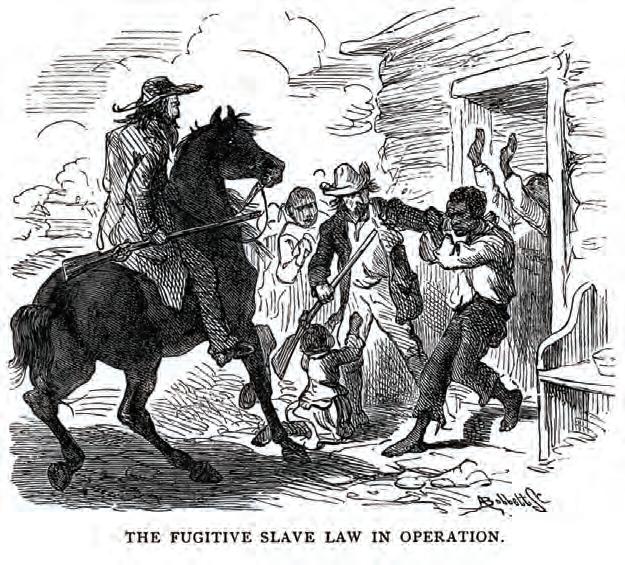
68 July-August 2023 DAWN www.africabusinessassociation.org Governance
Capturing fugitive slaves in California, ca. 1856 Public domain image
before its statehood and escaped, or refused to return to slave states with their enslaver, was rare among free states. Racial hierarchy continued to take root in California when slavery was abolished federally by the 13th Amendment in 1865. The task force’s findings detail the lasting consequences of segregation and discrimination against Black people in the state’s political, legal, health, financial, educational, cultural, environmental, social and economic systems, leading to both physical and mental health disparities and a racial wealth gap.
Who is eligible for reparations?
The question of eligibility has been among the most controversial issues for the task force. Some advocates made the case that all Black Californians should be eligible for reparations, though legal scholars provided testimony that broad race-based solutions could face legal challenges.
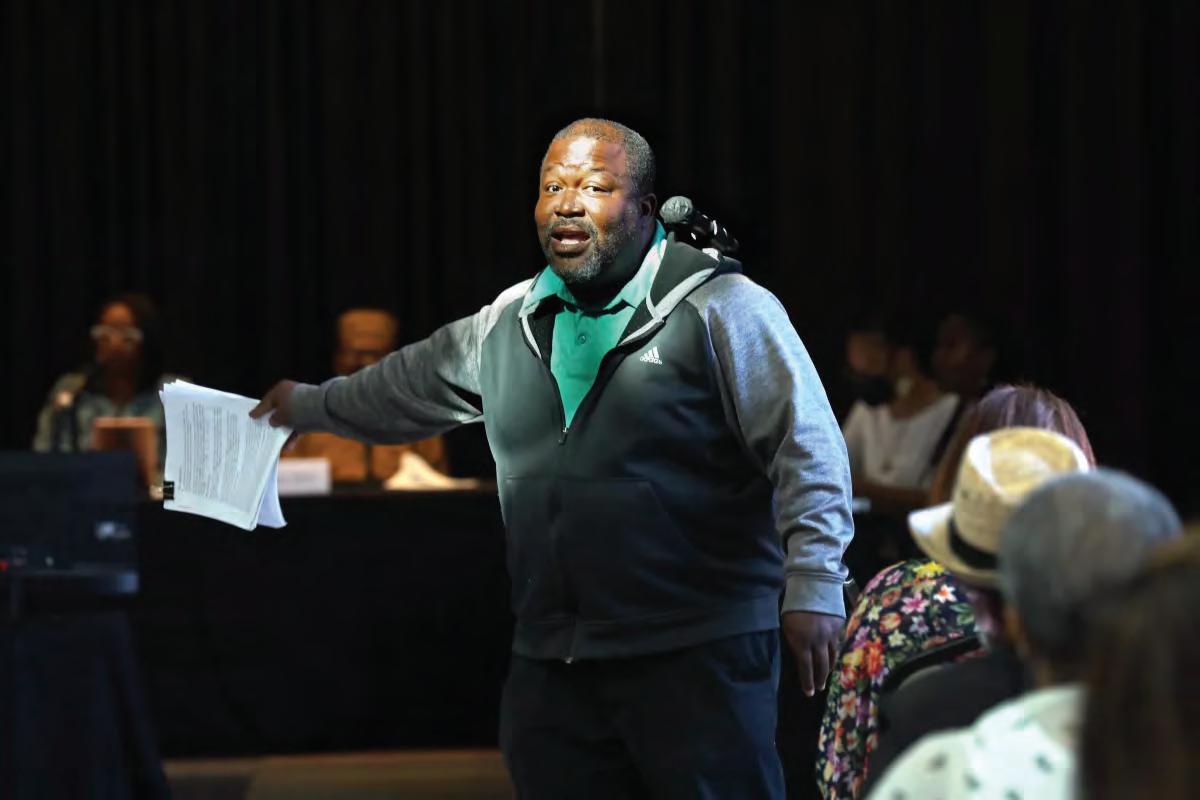

The task force ultimately restricted eligibility based on lineage as “determined by an individual being an African American descendant of a chattel enslaved person or the descendant of a free black person living in the United States prior
to the end of the 19th century.”
In its compensation models, the task force cited population estimates from 2020 of less than 2
see page 70
69 July-August 2023 DAWN www.africabusinessassociation.org
Amos C. Brown Jr., vice chair of the California Reparations Task Force, right, holds a copy of “Songs of Slavery and Emancipation” during a group photo at the Capitol in Sacramento in June. (Rich Pedroncelli / Associated Press)
Kenneth Henderson makes a statement before the California Reparations Task Force in September at the California Science Center in Los Angeles. (Carolyn Cole / Los Angeles Times).
Reparations from page 69
million non-Hispanic African American residents who lived in the state.
How do I prove eligibility?
That hasn’t been entirely answered yet.
proof that they suffered individual harms in each category.
• Compensation for health disparities: $13,619 for each year of residency. This figure was derived by comparing life expectancy between Black non-Hispanic and white non-Hispanic Californians.
• Compensation for mass incarceration and over-policing of African Americans: $2,352 for each year of residency in California during the war on drugs from 1971 to 2020.
The task force recommends that the Legislature create a new California American Freedman Affairs Agency dedicated to implementing the task force’s recommendations that are adopted into law, including determining eligibility and helping people prove their lineage. The agency should have a “genealogy branch to support potential reparations claimants by providing access to expert genealogical research to confirm reparations eligibility,” according to a draft of the final policy recommendations.
How much money will people receive?
Economists calculated preliminary estimates of monetary losses in three categories of community harms: health disparities, African American mass incarceration and over-policing, and housing discrimination.
The amounts each individual receives would be determined by the number of years they have resided in California for a minimum of six months. The money would be given to every eligible recipient and no one would need to provide
• Compensation for housing discrimination: $3,366 for each year between 1933 and 1977 spent as a resident of the state of California.
The proposal calls for additional compensation for unjust property takings and the devaluation of African American businesses, which have not yet been quantified. The task force also suggests the Legislature adopt an individual claims process to provide reparations for those who can prove particular harms.

The report recommends that the Legislature provide initial down payments to begin the process, with more payments to follow, and prioritize the elderly as the first in line for compensation. The task force also noted that the amounts are conservative estimates and not final.
What else is the task force recommending?
A draft of the final report recommends “a range of policies needed to guarantee restitution, compensation, rehabilitation, satisfaction, and non-repetition,” included, but not limited to:
• Repeal or amend Proposition 209, a measure
70 July-August 2023 DAWN www.africabusinessassociation.org Governance
Reparations proposal in California will include a new ‘Freedmen’s Bureau’ © Levi Sumagaysay/MarketWatch
approved by California voters that banned affirmative action in 1996.
• Analyze laws, policies and ordinances from the local to the state level for racial impact prior to passage and after implementation.
• Amend the California Constitution to prohibit involuntary servitude.
• Pay fair market value for jail and prison labor.
• Abolish the death penalty.
• Fund community wellness centers in African American communities.
• Strengthen the Bane Act by eliminating the requirement that a victim of police violence show that the officer “specifically intended” to commit misconduct.
• Declare election day a paid state holiday.
• Restore voting rights to all formerly and currently incarcerated people.
• Implement rent caps for historically redlined ZIP Codes.
• Increase grants and financial assistance to improve homeownership rates among African Americans, including subsidized down payments and mortgage payments to those who reside in formerly redlined neighborhoods
• Allow descendants who reside in formerly redlined neighborhoods to transfer the assessed value of their primary home to a newly purchased or constructed primary residence.
• Provide free college tuition for all California residents eligible for monetary reparations.
• Build more parks in African American communities.
• Identify and remove Confederate monuments, markers and memorials.
• Create a guaranteed income program for descendants of an enslaved person.
• Automatically increase minimum wage on a regular basis to adjust for increases to the cost of living, including inflation.
• Provide interest-free loans to owners of small businesses in African American commercial areas.
• End the cash bail system.
• Repeal the “three strikes” law.
• Adopt universal single-payer healthcare coverage and a healthcare cost control system.
• Increase Medi-Cal reimbursement rates to match reimbursement rates of private insurance.
What’s next?
The task force meets one last time in Sacramento on June 29 before sending its recommendations to the Legislature. Two lawmakers who sit on the task force, state Sen. Steven Bradford (D-Gardena) and Assemblyman Reginald Jones-Sawyer (D-Los Angeles), are expected to lead efforts to convince their fellow lawmakers to provide reparations.
The Legislature widely approved the creation of the task force at a time when state revenues neared historic highs. Now that the state is in the midst of an economic crisis, it’s unclear whether Democrats will support reparation payments that could ultimately cost more than twice the annual state budget, or when the task force’s recommendations could come up for a vote.
Moore said the recommendation to provide initial down payments to eligible descendants and follow-up payments later could help offset those immediate budgetary concerns.
She pointed out that Newsom recently acknowledged California’s role in slavery during a national interview.
“He’s been kind of quietly letting us do our work, which I respect but ... I took that as a sign that he is essentially supportive of the work that we’ve been doing,” she said.
Any reparations or policies approved by lawmakers would require Newsom’s signature to become law.
https://www.latimes.com/california/ story/2023-05-06/californias-reparations-taskforce-recommendations-heres-what-you-need-toknow
71 July-August 2023 DAWN www.africabusinessassociation.org
African, Caribbean Nations Joi Call for Reparations for Slavery
By Reuters
REPRESENTATIVES FROM various African and Caribbean entities joined forces at a historic event this week, July 24-27, in the capital of Barbados, Bridgetown, to demand reparations for slavery and its legacy in today’s society.
The University of the West Indies (UWI), the Economic, Social and Cultural Council of the African Union (AU), Barbados’ government, grantmaking network Open Society Foundations and the Caribbean Pan African Network teamed up to “call for reparations for historical crimes”.
The meeting in Bridgetown, from Monday to Thursday, included strategy sessions and plenaries and marked the beginning of an “intercontinental campaign”, the UWI said in a statement, describing it as “ground-breaking”.
Attendees included ambassadors and representatives from AU member states and the Caribbean Community political and economic union (CARICOM).
“This is a historic moment… humanity cannot go forward with all the toxic interferences of colonisation,” Hilary Beckles, head of the CARICOM reparations commission, told a news
conference on Thursday. “We have to clean up this mess to allow humanity to function.”
The CARICOM reparations commission, which was set up to seek reparations from former colonial powers such as the United Kingdom, France and Portugal, “sees the persistent racial victimisation of the descendants of slavery and genocide as the root cause of their suffering today”, it said in its 10-point reparation plan.


Outcomes of the meeting include a proposal for a roadmap for cooperation between the AU and CARICOM, the UWI statement said.
“It is crucial to recognise how slavery, colonialism and racism intersect and impact the lives of Black people around the world,” said AU official Youssouf Mandoha.
From the 15th to the 19th century, at least 12.5 million Africans were kidnapped and forcibly transported by European ships and merchants and sold into slavery. Those who survived the brutal voyage ended up toiling on plantations under inhumane conditions in the Americas, mostly in Brazil and the Caribbean, while others profited from their labor.
Barbados, where the meeting took place, received 600,000 enslaved Africans between 1627 and 1833, who were put to work in sugar plantations, earning fortunes for the English owners.
The Caribbean island ditched Britain’s late Queen Elizabeth as head of state in 2021 and renewed its
72 July-August 2023 DAWN www.africabusinessassociation.org Governance
Forces to
campaign for reparations. The idea of paying reparations or making other amends for slavery has a long history but the movement is gaining momentum worldwide.

The EU said earlier this month that Europe’s slave-trading past inflicted “untold suffering” on millions of people and hinted at the need for reparations for what it described as a “crime against humanity”.
https://www.cnbcafrica. com/2023/african-caribbeannations-join-forces-to-call-forreparations-for-slavery/

Reparation Conference
Videos:
https://www.youtube.com/ watch?v=zL0edvB3G9c&t=31s https://www.dailytelegraph.com. au/news/world/barbados-hostsinternational-summit-on-slaveryreparations/video/09ac6d3e2809
1c2054c99097b6de6599

https://theglobalherald.com/news/ barbados-hosts-internationalsummit-on-slavery-reparations/
Image credit: Bussa's Rebellion
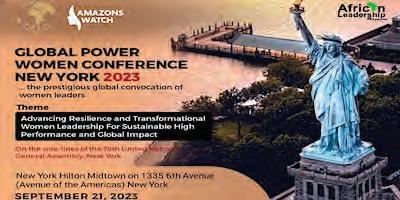
Thursday, September 21, 2023 7:00 PM EST GLOBAL POWER WOMEN CONFERENCE (GPWC) 2023 New York Hilton Midtown, New York INFORMATION/TICKETS HERE in
ry
DAWN www.africabusinessassociation.org 73 July-August 2023 https://www.edgereg.net/er/Registration/StepRegInfo.jsp
ERITREA HAS REJOINED a regional East African bloc it left 16 years ago, its information minister said, in the country's latest move to rebuild ties with its neighbours.
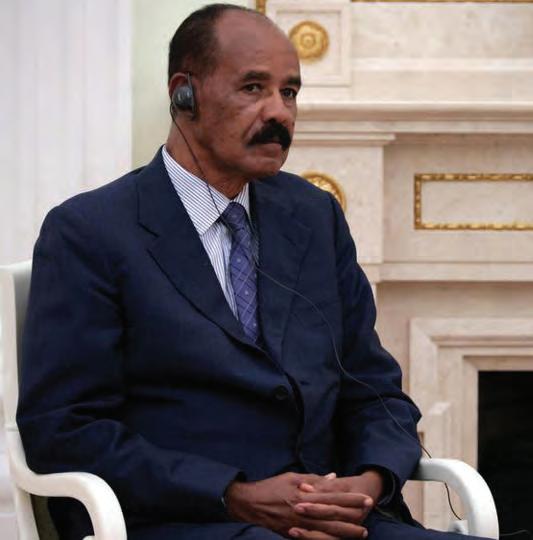
The Asmara government quit the Intergovernmental Authority on Development in Eastern Africa (IGAD) in 2007 to protest Ethiopian troops' entry into Somalia to force out its Islamist rulers.
"Eritrea resumed its activity in IGAD and took its
Eritrea Rejoins Regional East African Bloc After 16-year Absence
By Reuters
seat at the 14th Ordinary Summit in Djibouti," Information Minister Yemane Meskel wrote on Twitter late on Monday after the summit. He did not say what had prompted the decision but said Eritrea wanted to join other IGAD members and help advance peace and stability in the region.
It is also under U.S. and EU sanctions for alleged human rights abuses.
However, it has taken steps in recent years to repair regional ties.

In 2018, it signed a peace deal with Ethiopia that formally ended the state of war that had existed since the border conflict, restored diplomatic ties with Somalia and normalised relations with Djibouti.
It has also strengthened ties with Kenya, which announced earlier this year that it would open an embassy in Asmara.
Still, human rights groups say Afwerki's rule remains as repressive as ever, pointing to forced military conscription that continues to drive thousands to flee the country each year.
Eritrea also drew international condemnation for alleged atrocities committed by its soldiers during the 2020-2022 war in northern Ethiopia's Tigray region, where they fought in support of Ethiopian troops against Tigrayan forces.
Eritrea has denied those allegations.
https://www.msn.com/en-us/news/world/eritrearejoins-regional-east-african-bloc-after-16-yearabsence/ar-AA1cumnu
Source article includes a video Image credit: eac.int
Governance
DAWN www.africabusinessassociation.org
74 July-August 2023
Eritrean President Afwerki in Moscow © Thomson Reuters
SOAD (State of the African Diaspora) Partners with the Rosenthall Group, LLC to Create a Bullion Bank in Africa
 By Mitchelmao
By Mitchelmao
IN A UNIQUE and formidable collaboration, SOAD signed an MOU with The Rosenthall Group LLC, USA to create a Bullion Bank in Africa.
The Rosenthall Group (TRG) is an international development company that forms coalitions with governments, companies, civil society groups, trading platforms, investors and international organizations. TRG provides design/build, construction, engineering and funding opportunities for large projects ($100 million to $50 billion+) as well as humanitarian development for governments and private developments.
Africa’s two most profitable mineral resources are gold and diamonds. In 2008, Africa produced about 483 tons of gold, or 22% of the world’s total production. South Africa accounts for almost half of Africa’s gold production. Ghana, Guinea, Mali, and Tanzania are other major producers of gold.
Africa having the most abundant and precious resources on the planet has, over the millenia, been exploited and subjugated for its resources with particular emphasis on gold and diamonds and other precious resource such as Coltan.
Nations outside of Africa who have acquired Africa’s gold, builds its own precious mineral reserves and uses this resource to leverage millions, if not billions, of dollars of financing to invest and develop their countries whilst keeping the gold in their own country or depositing it in safekeeping in Switzerland, Germany, Dubai etc. which is then monetised over and over again. Then, why cannot Africa do the same?
The mission of The Rosenthall Group LLC and The Bullion Bank Of Africa (BBA) working with SOAD is to create a new platform of providing technology, education, technical assistance, world trade, one currency and financial services to lead African countries to financial self-sufficiency and economic independence by comprehensive and strategic management of natural resources that includes monetizing and leveraging assets to benefit the people of the 54 countries of Africa.
VPM Keturah Amoako finalising the collaboration said:
“We have been privileged to have been introduced to Mr Rosenthall a few years back through our Minister of Education, Vimbai Chiwuswa. Today, we are happy that we are now well-positioned to be able to make a positive contribution towards this unique opportunity to create a Bullion Bank in preserving and keeping the wealth of Africa firmly in Africa. The time is now for Africa to be able to monetise its own resources and have the confidence and enjoyment of being able to leverage funds to invest and build its own sovereign wealth and implement its own projects of national and community development. We are elated to be working with The Rosenthall Group to enable Africa to achieve this goal. This is truly PanAfricanism in Action”
https://thestateofafricandiaspora.com/soadpartners-with-the-rosenthall-group-llc-to-create-abullion-bank-in-africa/
DAWN www.africabusinessassociation.org 75 July-August 2023 Governance
African Stock Exchange/Bourse
• Algeria Algiers Stock Market
• Angola
• Botswana
• Cameroon
Angola Stock Exchange and Derivatives
Botswana Stock Exchange
Douala Stock Exchange
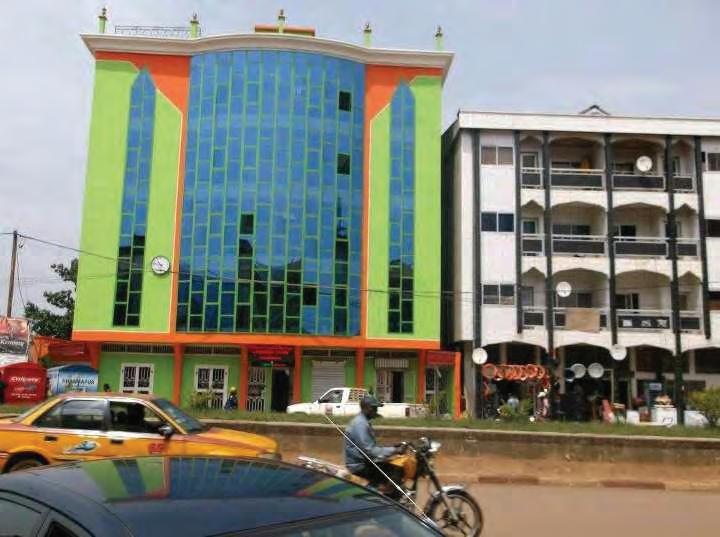
• Cape Verde Islands Bolsa de Valores of Cape Verde (in Portuguese)
• Cote de Ivoire Bourse Regionale des Valeurs Mobilieres - UEMOA (Abidjan)
• Egypt
• Ethiopia
• Ghana
• Kenya
• Libya
The Egyptian Exchange
Ethiopia Commodity Exchange
Ghana Stock Exchange
Nairobi Stock Exchange
Libyan Stock Market
• Malawi Malawi Stock Exchange
• Mauritius Stock Exchange of Mauritius
• Morocco
Casablanca Stock Exchange
• Mozambique Bolsa Valores de Mocambique
• Namibia Namibian Stock Exchange
• Nigeria Nigerian Stock Exchange
• Rwanda
• Seychelles
Nigerian Stock Exchange
Rwanda Stock Exchange
Seychelles Securities Exchange

• Somalia Somali Stock Exchange
• South Africa
Bond Exchange of South Africa
Johannesburg Stock Exchange
Johannesburg Stock Exchange
• South Sudan
• Swaziland
• Tanzania
• Tunisia
• Uganda
• Zambia
• Zimbabwe
Khartoum Stock Exchange
Swaziland Stock Exchange
Dar es Salaam Stock Exchange
Tunisia Stock Exchange
Uganda Securities Exchange
Lusaka Stock Exchange
Victoria Falls Stock Exchange
• Zimbabwe Zimbabwe Stock Exchange
african-exchanges.org
https://african-exchanges.org/download-category/newsletters/
76 May-June 2023 DAWN www.africabusinessassociation.org Investment
Pinterest g
Bamende, Cameroon
Rise of the Black Investor Class: How Black VC Firms and Investors are Pushing Black
Business Forward
By Derek Major
BLACK INVESTMENT GROUPS , venture capital firms, and individual investors have been rising like a tidal wave in recent years.
Many Black men and women used the COVID-19 Pandemic to educate themselves about money, invest in businesses, and even purchase real estate. The pandemic also led to a rise in the number of Black entrepreneurs and business owners, as the Black Lives Matter movement and Juneteenth brought a new focus on racial equity.
“It’s amazing, the fact that it’s cool so it’s not even just podcasts, people are learning financial literacy through music,” entrepreneur, investor, and podcaster David Shands told BLACK ENTERPRISE. “There’s never been a time in history where rappers are injecting financial literacy into their music and now it’s cool. The whole culture is shifting to you’ve got to be smarter you’ve got to be more responsible with your money. I think it’s absolutely amazing.”
Investing has been on the rise in the Black community in recent years, but several Black people made fortunes investing in businesses and real estate in the 1980s, 1990s, and early 2000s.
If you take a look at the Atlanta skyline, you’ll see the decades-long work of Black CEO and investor, Herman J. Russell.
Russell, whose first property was a vacant lot he bought in 1946, built H.J. Russell & Co. into one of the nation’s largest black-owned construction and real estate firms. In addition to acquiring and developing numerous real estate projects in the Jim Crow South, H.J Russell is one of the largest black-owned companies in the U.S. and is regularly on the BE 100 list
Projects built by H.J. Russell include Hartsfield-
Jackson Atlanta International Airport, the Georgia Dome, Philips Arena, Turner Field (former home of the Atlanta Braves), and Mercedes-Benz Stadium, (current home of the Atlanta Falcons). Russell passed away in 2014 and his sons Jerome and Michael now run the company
In 2014, Russell shared his advice for being a successful Black person in an industry with little minority participation.
“Do not hesitate,” Russell told BE in 2014. “Push for opportunity but most of all be persistent, prompt, and reliable. African Americans make up a huge percentage of the population so it is important that you work hard to increase the percentage of our participation and you should seek it as if your life depends on it.”
The late TLC Beatrice CEO Reginald Lewis, a Harvard-trained lawyer and entrepreneur, was the first Black man to build a billion-dollar company.

The Baltimore native launched his investment firm, the TLC Group, which in 1987 purchased Beatrice International Foods Cos., a manufacturer of processed meats, dairy products, and beverages with 64 food-processing and distribution companies in 31 countries.
“Reggie was not afraid of going beyond what Black business was, which was privately owned companies run by family members to be passed
see page 78
77 July-August 2023 DAWN www.africabusinessassociation.org Investment
Black Investors from page 77
on to family members,” BET Founder Bob Johnson told BE in 2015. “He got access to public capital, which gives you leverage in deal-making.” Johnson is the founder and chairman of The RLJ Cos., a portfolio of companies with holdings in many industries.
These men paved the way in Black investment and are shining examples for a growing chorus of figures and organizations that are pushing to make investing more popular and turn Juneteenth into a holiday focusing on financial literacy, business, and entrepreneurs for Black men and women.
Black Athletes and celebrities are also helping by starting their own VC funds and are investing and assisting minorities- and women-led businesses.
Serena Ventures, the VC fund started by tennis legend Serena Williams, has made numerous investments in women-owned and minority-owned businesses.
NBA All-Star Kevin Durant’s Thirty5 Ventures and Stephen Curry’s Penny Jar Capital also invest in minority businesses, as do the VC firms started by rappers Shawn “Jay-Z” Carter and Calvin “Snoop Dogg” Broadus.
Before he died in 1993, Lewis helped Black Americans gain access to financing on Wall Street. After Lewis passed, his wife Loida Lewis took over, and in the first two years of running TLC Beatrice, the company made more than $3 billion in net sales.
Moving into the 1990s, another Black businessman who paved the way was FUBU CEO, Draymond John.
John, who once sold hats on the street outside the famed Apollo Theatre in the early 1990s, is now a featured investor on NBC’s Shark Tank and has invested in numerous businesses including Bombas socks, Hells Bells Helmets, and Browndages.
Vista Equity Partners CEO Robert F. Smith made national headlines in 2019 when he paid off the tuition and student loans of the graduating class at Morehouse College. However, the Black billionaire has been an investor for more than two decades and sports a portfolio that includes more than $96 billion in assets and includes more than 80 enterprise software, data, and technologyenabled companies that employ over 100,000 people worldwide.
Wall Street veteran and finance coach Shareef “Ross Mac” McDonald has a unique name for this renewed interest for Black men and women.
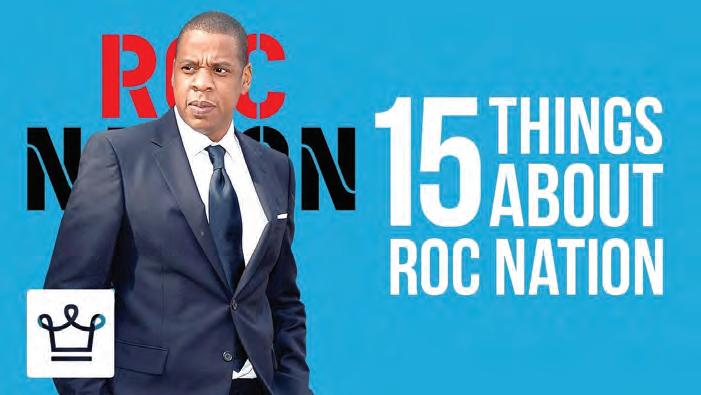
“I love it, we call it the Digital Civil Rights Movement,” said McDonald. “Post George Floyd and during COVID we as a people were more intentional and saying no one’s going to give us anything we need to get it and take it for ourselves whether it’s knowledge or wealth and so I’m excited that people are now doing the things that our ancestors didn’t necessarily have access to even understand or comprehend.
“Now, people have the ability to buy stocks and so I love the fact that people are taking it amongst themselves to be submerged in the information and now you have Black content creators on Twitter, Instagram, and YouTube saying hey now is the time to buy stocks for cheap and so I love being a part of that and part of the digital Black wealth renaissance.”
https://african-exchanges.org/african-securitiesexchanges-association-and-pan-african-paymentsettlement-system-sign-mou-to-enhance-crossborder-trading Image credit: allhiphop.com, iahhm.com
Investment 78 July-August 2023 DAWN www.africabusinessassociation.org
Tracking Africa's Billion-Dollar Companies
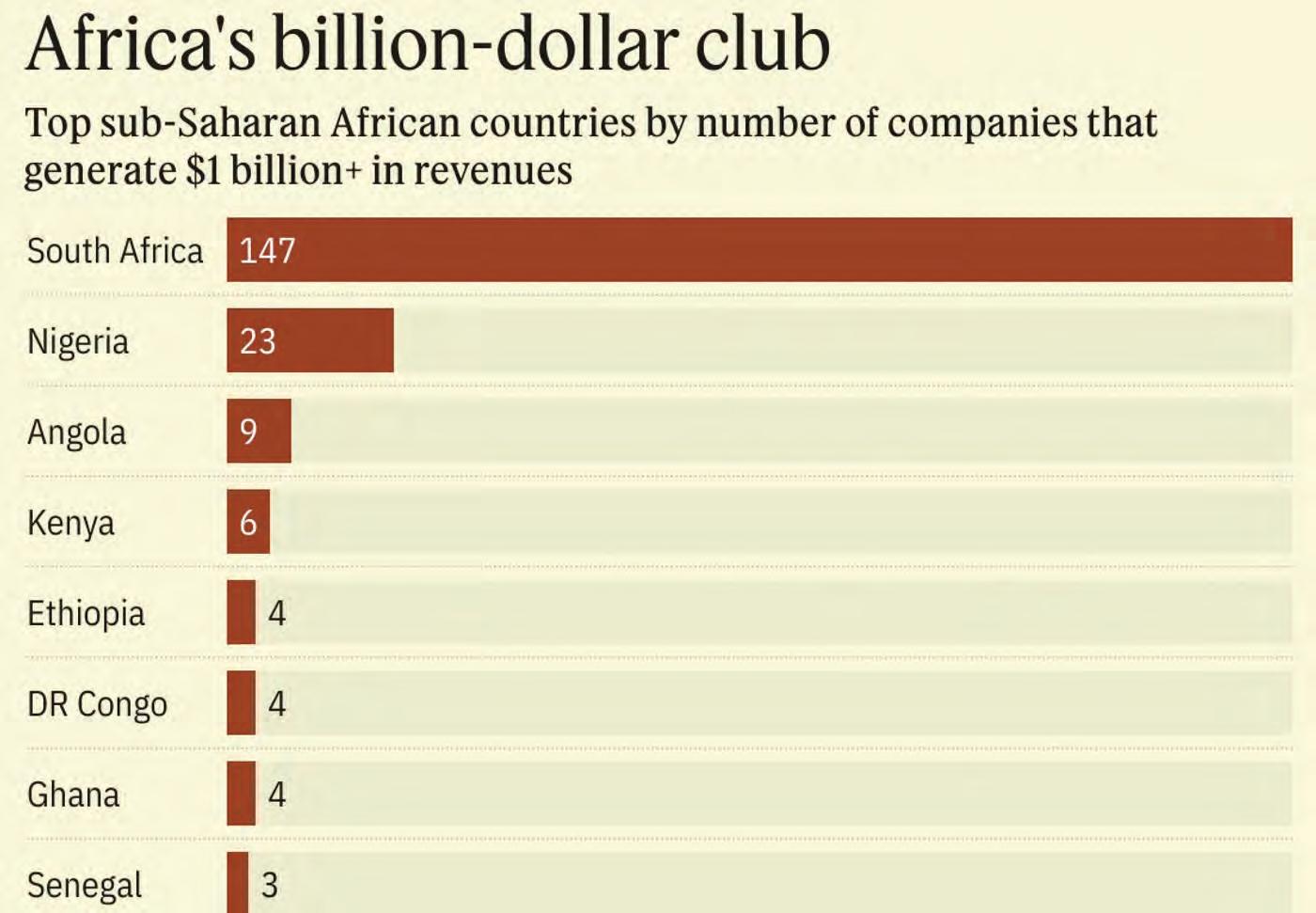 By Alexander Onukwue
By Alexander Onukwue
OUT OF THE 345 COMPANIES in Africa that each generate $1 billion or more in annual revenues, 230 were started in an African country and the founder is often an African, according to a report by McKinsey. South Africa is by far the continent’s leader with 40% of all the billion-dollar revenue companies. Its large companies increased revenues at an average rate of 5.5% a year between 2015 and 2021, while large companies in other countries saw average declines by 1.7% in the same period.
McKinsey estimates that there has been a 7% net decrease in the number of African companies earning $1 billion in revenues since 2015, while Latin America, China, and India have witnessed increases in double digits in the same period. Africa’s billion-dollar companies cut across sectors
but 70% of the revenues come from six lines of business: oil and gas, mining, retail and consumer goods, financial services, manufacturing, and telecommunications.
While revenue growth varies between sectors, Africa’s large companies grew revenues by 4.9% a year on average from 2015 to 2021. Again, South African companies were the standout performers in this period, recording a 5.5% yearly average, McKinsey said. Overall, there is a lot of potential for the billion-dollar club of companies to optimize their processes, seek customers in other markets and make more money. McKinsey projects that the 345 companies could increase their revenues by more than $550 billion by 2030.
https://www.semafor.com/article/06/17/2023/whoare-africas-billion-dollar-companies

79 July-August 2023 DAWN www.africabusinessassociation.org
Investment
Idris Elba and Mo Abudu on Bringing African Talent into Entertainment Mainstream: “It’s Important For Us to Amplify the Voices in The Continent”
By Diana Lodderhose
WHEN TWO BRITISH-BORN POWERHOUSES get together — Idris Elba, an a ctor-director-producer of Sierra Leone, Creole and Ghanaian descent, and Nigerian-rooted Mo Abudu, largely considered the gobetween for African content to the rest of the world — they have a powerful chemistry. Remarkably, though, they’ve never made anything together. This is about to change. In March, the two quietly announced they would join forces to empower and uplift talent from Africa through their respective companies: Elba’s Green Door Pictures and Abudu’s EbonyLife TV. It’s a subject of shared passion for both. Throughout Elba’s prolific career, he’s continued to be involved in stories that are related to the African diaspora, from his early work on TV drama Sometimes in April, or The No. 1 Ladies’ Detective Agency, to his upcoming untitled Ghana project, which he will direct and star in. He’s long championed under-heard voices, and in 2016, he delivered a powerful address to the UK Parliament about the need for greater diversity and representation across the sector.
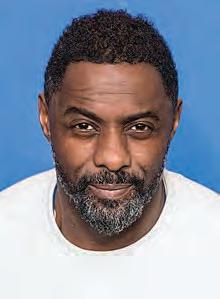
In tandem, Abudu has spent her career trying to

put African stories on the global map. After a career in recruitment, the straightshooter pivoted to become a talkshow host, launching Moments with Mo in 2008 and interviewing the likes of Hillary Clinton and Christine Lagarde in her Africansyndicated show. That show eventually generated EbonyLife Studios and sparked her mission to push African stories to the global market.

When we connect with

Investment
80 July-August 2023 DAWN www.africabusinessassociation.org
Elba and Abudu one Monday in London, it’s the first time they have met in person, but they interact like old friends. With common backgrounds but differing perspectives, it’s clear there’s a unity in their mission: African stories have long been marginalized by the global film community, and they are going to change that.
DEADLINE: What are some of the preconceptions about African content that you’re battling right now?

IDRIS ELBA: General knowledge about the African film industry is anchored around a very specific time. That specific time doesn’t account for what happened prior, such as the Nigerian film explosion in the 1970s and what is happening in the future. Everyone now centers everything that happens in Africa around what is described as “Nollywood.”
MO ABUDU: Do you know the history behind the word? A Canadian journalist came to Nigeria and decided that he was going to give us the name Nollywood, and that was it. It’s stuck since then. I hate the word Nollywood. The term Nollywood itself is a bad genre of filmmaking. We all know what Nollywood is supposed to represent — it’s the VHS films that were made back in the day. So, to still be called Nollywood, for me, is a no. We need to use terms like African filmmakers or Nigerian filmmakers.
DEADLINE: That’s true — it’s a lazy label to group together a huge span of differing cultures on one continent. Many Indian filmmakers despise the term “Bollywood” as well. Let’s talk about you two and this initiative you’re setting up. First, how long have you guys known each other?
ABUDU: Until today, we haven’t physically met. This is our first real-life meeting. We’ve had Zooms and phone calls.
ELBA: I’ve known of Mo and her work for a while. Our circles have been adjacent for years — probably since the early 2000s. When I started to see what she was doing with EbonyLife TV, I saw this woman that was coming up. She’s different; she’s got a voice, and she’s got perspective. I saw that. And meanwhile, I made my first African film, Sometimes in April, and then I went to Botswana for The No. 1 Ladies Detective Agency. So, it felt like
this journey that finds us here today was inevitably going to happen.
ABUDU: I wanted to partner with someone who knows African filmmakers and has the ambition to go further and go wider and take African filmmaking to the international stage. It’s the synergy of Idris having a global perspective and me having a local perspective that works, and we can figure out how we go local for global. I have an obsession with making a big blockbuster that the world is going to see, but putting things into context for Africa, we don’t have the budget. That’s why, no matter what we do in Africa… How global are these films going to be? I’d love for there to be some synergy between our stars and the Hollywood stars. It would help our local projects, incomes and revenues grow.
DEADLINE: Mo, EbonyLife Media has several co-production deals in the works with Net flix, Sony Pictures Television, Westbrook Studios, BBC Studios, Starz and Lionsgate among others. What’s the status of these?
ABUDU: The process of moving from signing development to production can be time-consuming, but we’ve made significant strides with a number of projects. Some of these are being pitched to streamers and broadcasters, while others are going straight from development to production as our partners have their own platforms. But we’re still facing challenges when it comes to gatekeepers who are resistant to new stories from our continent with different backdrops.
DEADLINE: Is this where Idris comes in? Tell see page 82
81 July-August 2023 DAWN www.africabusinessassociation.org
Jill Scott and Idris Elba in The No. 1 Ladies' Detective Agency planetdp.org
Amplyfying the Voices from page 81
me about this initiative between the two of you and your companies and your plans for championing filmmakers coming from the African diaspora.
ELBA: I think where our partnership differs slightly from the sort of agreements that Mo has is that I’m in a position as an actor to be able to greenlight projects based on if I want to be in them and if I like them, on varied budgets.
ABUDU: That’s the power Idris brings. Not only does Idris have a production company, but he’s also a great talented actor that people can relate to. He’s also very accessible — you’re able to call him and discuss ideas with him. Even though he’s very busy, he will make the time. That makes all the difference. He’s a partner that is ready to listen.
ELBA: I’m aware of my position, and I want to bring people into the room. We are identifying stories that Mo and I want to make, and we have a pyramid of them. But to get the right combination, we need to have the right strategic partners. I don’t want to make five films and find that maybe two of them are good. I want to do two or three films that are amazing. This is a long-term partnership.
ABUDU: The other component to our work is capacity-building and upskilling filmmakers. What I’ve done for the last three years is run the EbonyLife Creative Academy in Lagos, funded by the Lagos State Government, for students who can’t afford it. We’re taking that model, and we want to try and roll it across the continent. We’re still trying to sort out how that would work, but we know that in order for Africa to have the best filmmakers, we must give them the tools to do so. So many I’ve met are confident and self-made. If they are given capacity early, they’re just going to fly.

ELBA: Africa needs talent and capacity. It’s important for us to amplify the voices in the continent. If we can build a footprint that is panAfrican, then it allows for more diversity in terms
of what’s on offer to Net flix, Amazon, Disney, Paramount and all of those guys.
ABUDU: This is a market that is totally undiscovered. Kamala Harris gave a speech and said that in 2050 one in every four people will be African. What does that say? We have the youngest youth population in the globe. Look at what we did with the music industry. Afrobeats have totally found their way, and those guys have grown by themselves. They’ve gone out, made music, and become global stars without much support. The film industry is harder. It takes more work because of the length of the process as well as finding talents that people are going to recognize, but it’s possible.
ELBA: Afrobeats is a good analogy. But the interesting thing about Afrobeats, and musicmaking technically, is that the democratization of technology is what has allowed people to make those records: you can make a record with your laptop just as Michael Jackson did in a big studio. You could even do it on your phone. Filmmaking is different, but think of what could happen on this digital highway.
ABUDU: The thing is, these guys can spend a week making a two-minute video. We, unfortunately, cannot — we sometimes have to shoot 10 pages a day on a script to make sure that we stay within budget. In Hollywood, how many pages do you guys shoot in a day?
ELBA: It really depends. For a big-budget film, maybe two or three pages.
ABUDU: Two pages! That’s crazy! Amen to that, because, of course, you’re going to have a betterlooking film if you’re spending one day doing two or three pages.
DEADLINE: What are your thoughts when streamers and anyone else looking at growth in the international sector says that Africa is the next market? It’s a massive market with diverse cultures and countries. What do you think about them trying to infiltrate Africa?
ABUDU: Take K-Drama, for example. A show like Squid Game was budgeted at $2 million an episode, which I think is a decent budget for a series like that. But we still don’t have those sorts of budgets locally yet, and we’re told by our partners that budgets will grow when subscribers
82 July-August 2023 DAWN www.africabusinessassociation.org Investment
grow. But it’s a bit of a chicken and egg situation. Which comes first? How do you get subscribers if you don’t have the shows? We’re told the numbers are growing, and they’re getting subscribers based on the budgets that are being invested in the shows that we do. But we have the same costs in production. It doesn’t cost me any less to rent an area or equipment than it does in, say, England, but our margins are lower.
Another challenge we face is the lack of scriptwriters. Because there has been very little investment in Black filmmakers, there are no writers — and the best writers are busy. The new writers can’t skill up if no one commissions them. Again, it’s a chicken-and-egg situation. It’s all part of the cycle.
DEADLINE: Idris, tell me a little bit about what you’ve been doing in Ghana to improve the access and advance the situation there.
ELBA: In Ghana, for the last three years, I’ve been working with the government to help them understand these incentive packages around filmmaking for Africans and how essential it is to put in policies and mechanisms for filmmakers and creatives that allow them to utilize investments from international partners and stretch it further within Africa. Ghana has committed to — and hopefully, it will be done by June — a policy or system that will mean more money is spent locally. Hopefully, I can use the system for the film I want to shoot in Ghana in December. If we’re looking for streamers to give us more money for film, it’s going to be a while before that happens, so we have to find mechanisms that allow our value to be raised internally. Net flix’s fan base for African films is mostly outside of Africa, so we have to get to a place where subscribers are on the continent.
DEADLINE: Can you explain specifically what Ghana is committing to? Is it a tax credit or a rebate?

ELBA: Economies like Ghana don’t have the money like other film capitals, so they just want the business. What we’ve constructed is something where we won’t charge you taxes, or import taxes, which accumulate to
quite a big part of your budget. I spoke to His Excellency [Papa Owusu-Ankomah], and the specifics are still being ironed out. The Ghanaian Film Authority is also working alongside three partners, and we’re building a studio there. The reason why we’re building this, and why we’re keen on the policies, is because we want to leave a legacy behind and attract these filmmakers.
DEADLINE: What can you tell us about this project you’re shooting in Ghana in December?
ELBA: We’re still figuring out the name of the film [Deadline revealed after going to press that the project would be called Infernus, which Millennium is selling in Cannes], but I’m going to direct and star in it. The story is about a guy who heads up a department of the United Nations that looks after the relocation of refugees, and he finds some refugees where they shouldn’t be. I’m taking part of the storyline to Ghana.
DEADLINE: Let’s talk about the young population in Africa. More than 60% of the continent is under the age of 25. I’ve recently spent some time in Saudi Arabia, which is ramping up its efforts in the international film and TV space, and they have a very young population as well. While their economy is very different from Ghana’s, there’s been some prejudice in the media regarding how it’s perceived from an international perspective. What would you say the challenges are about this on the African continent?
ELBA: Prejudice is a fair word, and sustained prejudice is what has happened to Africa, which we have to fight. There’s a misconception that everything is corrupt, conflict is everywhere, people will get malaria, all of that kind of thing. Stories are where we can make a difference. Mo and I have lots of different types of stories — our creative juices are flowing — and they’re African and about African people, but they have an international appeal. Look at what Korean films have done. We have to start somewhere, and we just want to amplify these voices. That’s why Mo and I are doing this. We’re coming together to move it forward.
ABUDU: It’s really important to find the right people that have a shared vision. Different visions
see page 84
83 July-August 2023 DAWN www.africabusinessassociation.org
Amplyfying the Voices from page 83
can come together and make things work. I’m obsessed with getting a global blockbuster to come out of Africa, something that will put us on the map.
DEADLINE: How can Hollywood and Europe step up their commitment and interest?
ABUDU: What’s frustrating is looking at the amount of content that gets repeated, and meanwhile, we don’t get a chance to be heard. The other day I saw an advert for The Three Musketeers. Again? How many times are you going to make The Three Musketeers? If you take an African historical story to a studio, they tell you, “We’re not sure what to do.” OK, so you don’t want to do African period film, but you want to make The Three Musketeers 50 million times? I don’t get that. We’re not saying you have to make every story from Africa that is pitched to you, but if you’re doing 10 period pieces from Europe, couldn’t you do one or two that are African? Why shouldn’t the world know? And why should it just be limited to the slave trade?
There is more to us than this, and I keep saying it. These commissioners, these gatekeepers, are the ones we need to convince and say, “You need to give us the budgets to do something — you have to take a risk on something.”
DEADLINE: What are some examples of the types of stories coming out of Africa? Obviously, there are many different countries with different languages and cultures, but are there any common threads of storylines that you are seeing emerge?
ELBA: It’s a spectrum. You go to a village, and there are stories based on folklore and tradition. Then there are younger people who are wanting to tell stories about Afrofuturism.
ABUDU: There’s lots of stories of the young women of today. You’ve got Sex in the City set in New York. Why can’t we have our own versions, with young modern women living in Africa, with their own experiences, their own aspirations, their own dreams? They deserve some representation like everyone else in the world.
ELBA: You have to understand that Africa is a continent that has seen a lot of adversity, so we’re not going to write Disney movies. But it’s starting to diversify, and I think it’s important that it does
because you don’t just want to make movies about conflict and hard times. I loved the Net flix show Blood Sisters. It’s a thriller, it’s about the modernization of African women, and it’s dealing with domestic violence. It’s very diverse. If there is a common thread, I’d say that Africans want to tell a version of their truth.
ABUDU: It’s important for the world to understand our culture. Nigerian stories, specifically, can be very melodramatic, but we are melodramatic people. That is our nature. We can’t change who we are and what our culture is just for a film to travel.
DEADLINE: So what are the next steps?
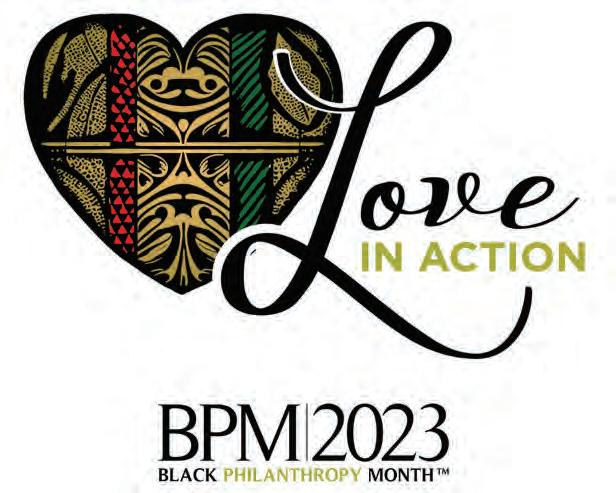
ELBA: The practical next step is to identify a project to greenlight and start shooting early next year. Alongside that, we want to put the school on the map. Then we want to try and replicate the government intervention with Nigeria and make the government participate in some way. People are impatient, but things take time.
ABUDU: But that’s not to say that there isn’t movement. With us, there will be more movement because we’re determined for there to be movement. For now, it’s all hands on deck.
https://deadline.com/2023/05/idris-elba-moabudu-interview-africa-movies-1235360283/ Image credit: YouTube, green door pictures, Wikipedia, th.linkedin.com, ghanaweb.com
84 July-August 2023 DAWN www.africabusinessassociation.org Investment
www.blackphilanthropymonth.com
We invite you to join us at our Annual US-Africa Trade & Investment Conference/Expo, AfrICANDO 2023

The theme for this year's conference is "The Diaspora: Accelerating US-Africa Trade, investment, and technological innovation." We believe that the African Diaspora plays a vital role in fostering economic growth, enhancing trade relations, and driving technological innovation between the United States and Africa.
AfrICANDO aims to bring together key stakeholders, Civil Society Organizations, industry leaders, government officials, and entrepreneurs from both continents to explore opportunities, forge partnerships, and make a lasting impact on US-Africa trade and investment.
Whether you are interested in exploring investment opportunities, expanding your network, or staying updated on the latest trends and innovations, AfrICANDO 2023 is the place to be. It is just around the corner.
REGISTER TODAY!!
The Hotel for AfrICANDO 2023 is DoubleTree by Hilton Hotel at Miami Airport Convention Center (MACC).To reserve your room, CLICK HERE!
New Contract Opportunities
Clean Energy and Critical Minerals Desk Study: SubSaharan Africa
USTDA seeks a U.S. contractor to support its decision-making relative to the funding of activities to support the clean energy and critical minerals sectors in sub-Saharan Africa. Proposals are due August 30. To submit a proposal, visit the SAM.GOV notice.
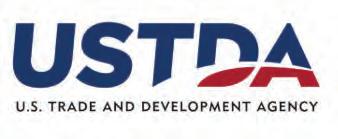
Transportation and Logistics
Definitional Mission: MENA-EE Region
USTDA seeks U.S. contract support in identifying climate smart transportation and logistics infrastructure opportunities in the Middle East, North Africa, Europe and Eurasia region. Proposals are due August 31. To submit a proposal, visit the SAM.GOV notice.
https://ustda.gov/
https://sam.gov/content/home
85 July-August 2023 DAWN www.africabusinessassociation.org
THEME: The Diaspora: Accelerating USAfrica Trade,Investment, and Technological Innovation."
Women in the U.S. are about to Gain Significant Wealth. Here’s What That Means
By Suzanne Schmitt
RESEARCHERS BELIEVE that the greatest wealth transfer in U.S. history is here. Recent estimates suggest that some $84 trillion will be passed down from older Americans to millennial and Gen X heirs through 2045—and that $16 trillion will be transferred within the next decade. A recent New York Times story suggests that wealthy white families will transfer the largest share of this money, and women are expected to benefit significantly.
Over all, women are set to be the largest beneficiaries of the current wealth transfer, and that share is likely to grow in the future, according to a 2020 McKinsey report which points to women as “the next wave of growth in U.S. wealth management.” Women currently control about $11 trillion in assets. By 2030, they are expected to control much of the $30 trillion in wealth that baby boomers possess.
I have worked in the financial services industry for over a decade, and I believe many are under prepared for the ramifications of this significant wealth transfer, and are unaware of the nuances of how women manage their money.
For instance, women report increased feelings of anxiety toward their finances compared to a year ago, and continue to face both historical challenges and impacts of the current macroeconomic environment that could impede their financial stability and confidence.
Against this backdrop, many women are working to make progress against goals like shoring up savings and developing investment strategies. According to data from New York Life’s Wealth Watch survey, more women reported having retirement savings compared to a year ago (32% in December 2021 vs. 36% in December 2022) and 52% of women reported having a financial strategy in place, with an additional 12% interested in developing one.
Employers and financial professionals can play a critical role in helping women prepare today, so that they are in a stronger position to capitalize on this upcoming wealth transfer—while remaining cognizant of how historical disparities and longer time horizons interact with the current economic landscape to create unique financial challenges, and opportunities, for women.
WOMEN INVEST DIFFERENTLY
Women are more likely than men to control household spending, giving them a better understanding of expenses and available assets. Women are also skilled long-term investors who are more likely to stay the course with their investments when markets are volatile, but they also tend to be more risk-averse than men. A survey from GOBankingRates showed that women’s risk-averse attitudes can sometimes prevent them from becoming investors in the first place. Women who find themselves suddenly single following a separation, divorce, or the death of a spouse within the last five years report riskaverse investing behaviors at higher rates than other cohorts of women. In fact, 74% of women who find themselves suddenly single report trying to minimize risks when it comes to investing.
While women’s investment confidence levels vary, there’s a distinct difference in financial priorities between women and men. According to a 2022 study from Ellevest, women are more likely to say their top priority is supporting their family,
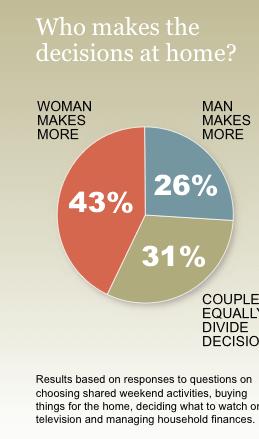
86 July-August 2023 DAWN www.africabusinessassociation.org Investment
while men are more likely to say their top financial priority is to grow their retirement savings.
And of course, women are not a monolith. Depending on their circumstances, career status, and relationship status, women’s financial priorities differ. For instance, women who are suddenly single are more likely to tailor their financial strategy towards ensuring independence. These preferences are often tied to the persistent financial disparities that women face, as well as the impact of current market conditions and ongoing inflation.
HISTORICAL CHALLENGES
Compared with men, women earn less, live longer, have higher educational attainment, and are more likely to have their financial lives disrupted by caregiving responsibilities. The money women earn must be stretched further for longer. Additionally, fewer women are getting married, and those who are marrying are doing so later, meaning many women are facing these challenges with a single income.
While women are making advancements in bolstering their total wealth, Pew Research Center reports that the wage disparity between men and women has remained essentially stagnant for the past two decades. Women earned 82% of men’s earnings in 2022, a mere 2% increase from 2002, when women earned 80% of men’s earnings. In addition, inflation historically most harms those who are on fixed incomes and those who are in debt – meaning, women are most negatively impacted by a high-inflation environment
Finally, changes brought about by COVID-19 have also disproportionately impacted women forcing many women to leave the workforce due to caregiving responsibilities, experiencing burnout, and down-shifting their careers, citing factors like lack of opportunity for advancement or conflicting

demands. Along with childcare, women are more likely to find themselves “sandwiched”—providing care both to children and older loved ones.
The impact of caregiving isn’t just financial—it’s essentially a wellbeing tax on women, impacting their mental, physical, and social health as well. Our team found that 45% of women reported parenting was emotionally much harder than they expected, compared to 35% of men, while 34% of women agreed parenting was socially harder than they had expected, compared to 29% of men.
THE OPPORTUNITY AHEAD
Factors impacting women’s finances, such as the wage gap, higher rates of educational attainment and thus potentially higher instances of outstanding student loan debt, and women’s disproportionate caregiving responsibilities, intersect with macroeconomic factors like inflation and market instability to create unique economic binds for women. As women continue to take ownership of their financial futures, they will likely look for support from employers and financial professionals.
Employers can focus on understanding the specific barriers to financial wellbeing that women face when developing resources and financial wellness education initiatives in order to design inclusive solutions. Engagement, programming, and access to professional guidance to address debt management, family formation and caregiving needs, investment strategies, income protection, and retirement savings can position women to make the most of the upcoming wealth transfer and position employers to attract and retain this critical segment of the workforce.
I strongly believe that financial professionals who deeply connect with female customers and who understand their preferences, priorities, and behaviors, can best help women through the massive wealth transfer that we are now experiencing.
https://www.fastcompany.com/90897283/womenin-the-u-s-are-about-to-gain-significant-wealthheres-what-that-means
Image credit: Pew Research Center, Black Illustrations
.
87 July-August 2023 DAWN www.africabusinessassociation.org
Fifteen Percent Pledge Founder Launches a Fund for Black Founders (exclusive)
By Elizabeth Segran
A DECADE AGO , Aurora James, founder of the luxury shoe label Brother Vellies, was eager to grow her nascent business. She needed a cash infusion to expand production and create a more robust website. But as a Black woman, it wasn’t easy to secure funds.
James wasn’t well connected to the private equity community, and she didn’t have a network of people who could help her vet potential investors, to make sure they were invested in the success of her business. In the end, with few options, James took out a $70,000 loan with very unfavorable conditions that ballooned to well over a million dollars. “There is really predatory capital out there,” she recalls. “But when you don’t have better opportunities, you might turn to something like that.”
Today, James is announcing a new project that she hopes will prevent other Black founders from needing to take a similar path. She’s joined forces with Alisa Williams, a partner at the private equity firm VMG Partners, to tap into an $850-million fund with a new initiative called the Friends and Family Collective that will focus on founders of Blackowned businesses. James and Williams have already started investing $25 million in brands like Ghetto Gastro, Beauty Stat, Melanin Hair Care, Proudly, and Danessa Myricks.
James’ quandary is common among Black founders. As recently as last year, only 1% of all venture capital went to Black-owned companies. “People in private equity and venture capital are making bets on founders that they feel are going to be successful,” says James. “But there’s a lot of unconscious bias in that process. If Mark Zuckerberg or Larry Page is their archetype of a successful founder, where does a Black founder fit in?“
She says that this fund is a natural extension

of her work with the Fifteen Percent Pledge, an initiative she launched in the aftermath of George Floyd’s murder that challenges retailers to devote 15% of their shelf space to Black-owned brands. She’s gotten everyone from Target to Nordstrom to Sephora on board, shifting an estimated $10 billion of revenue to Black-owned businesses.
Over the past three years, she’s built a 17-person team that is devoted to helping retailers bring on more Black-owned brands into stores—then collecting a lot of data about the impact of this work in terms of the revenue going back to Black communities. But she found that many Black founders struggled to scale their businesses and be in a position to partner with a retailer. “We can get all the shelf space in the world, but if we don’t have the resources we need in order to help Black-owned businesses take advantage of the opportunity, then we’re just stuck,” she says.

88 July-August 2023 Investment
DAWN www.africabusinessassociation.org
James and Williams are focused on finding businesses that already have a proven track record, but are at a point when they are ready for some growth. Take, for example, Ron Robinson, who has been a cosmetic chemist for 25 years at companies like Lancôme, Avon, and Revlon. Fifteen years ago, he launched his own company BeautyStat, which has developed a loyal following among professional makeup artists, but the brand still isn’t as well known as James believes it should be. “We wanted to make sure he was equipped with everything possible to make sure he had the best shot at the market,” she says.
They’ve also invested in Ghetto Gastro, which began as a collective of three professionally trained Black chefs who wanted to tell stories through their cooking. They became known for creating impressive events that bring together music, visual art, and food in order to start conversations about race, inclusion, and economic empowerment. Many big companies have hired them to throw events, including Nike, Cartier, and Microsoft. At New York Fashion Week, Marvel hired them to host a Black Panther themed event. “We’re using food as a medium to tell stories our own way,” says Jon Gray, one of Ghetto Gastro’s cofounders. “We created something that spoke to us. If we wanted it to exist in the world, we had to create it ourselves.”
In 2021, Ghetto Gastro expanded into consumer products. The brand has started making syrups

and pancake mixes with striking flavors including toasted matcha and ancestral roots, which combines flavors from Africa, Asia, and the Americas. “We’re really celebrating the idea of cultural collision,” says Gray. “We often think of high cuisine through a Eurocentric lens, but we wanted to have a counternarrative to that.
Last week, the brand launched a collection of small appliances at Target, including waffle makers, toasters, and coffee makers. The infusion of funding from the Friends and Family Collective will help them with this expansion, which will hopefully provide new streams of revenue and help the brand become more of a household name.

James says that a key part of Friends and Family Collective is providing founders with a team of advisers who can support them as they grow. At VMG, James and Williams are building a cadre of experienced entrepreneurs of color who can provide practical help when founders face challenges. “We’re focused on how these founders are going to be supported,” she says.
And this is important, because many Black founders don’t feel like they have the luxury of failing. While there’s a common thinking in the world of startups that it’s important to take risks and fail fast, James says that many Black founders don’t see the world as full of endless opportunity. If they have one shot, they need to take it. “Black founders put their heart and soul into their businesses, and they’re more protective of them,” she says. “There is really no other option.”
But ultimately, James argues that the Friends and Family Collective and the Fifteen Percent Pledge aren’t just good for the Black founders. She believes thriving Black-owned businesses are a boon to the American economy and give consumers a wider array of choices when it comes to products. “Consumers are sick of seeing the same old thing year after year,” she says. “Younger generations want new kinds of products that have different backstories. These Black-owned brands are here to deliver.”
https://www.fastcompany.com/90907784/fifteenpercent-pledge-launch-parity-vc-fund
Image credit: Ghetto Gastro
89 July-August 2023 DAWN www.africabusinessassociation.org
Ghetto Gastro products
WITH A TOPIC OF HOW tech will shape the future of travel, the crowd of a few hundred at Hotelbeds’ MarketHub Americas conference settled in to be entertained with stories about the wonders of artificial intelligence and ChatGPT.

Paula Felstead had bigger things in mind.
Like icebergs.
To Felstead, the chief technology and operating officer at Hotelbeds, technology is like an iceberg. “Everybody focuses on the top, white, shiny stuff — of which chat is probably the peak,” she said during a keynote address preceding a panel discussion on the topic on the closing day of last week’s conference.
“Everybody tries to forget that two-thirds of the iceberg is sitting invisibly underneath,” said Felstead, who’s been at Hotelbeds for nearly two years after previously working for companies that include Visa Europe and Barclays Bank. “It’s that two-thirds of the iceberg that will actually slow down your business or be barriers to moving quickly.”
While the public and, let’s face it, many CEOs and company boards of directors, are beguiled by flashy websites and the latest tech wizardry, the platforms and software carrying out the business — and too often the security shielding all of it — grow outdated, in some cases not just by months or years but decades.
The worst of it, the densest part of the iceberg,
Why it's Time for Travel Companies to Address "Technical Debt"
By Derek Catron
if you will, is technical debt: outdated iterations of new technology that IT departments code around and keep upgrading rather than replacing with technology that could do the job faster, more accurately and more securely.
“Any company that’s had software for the last twenty years — every company — has technical debt,” said Luis Dinis, director of product management at Omnibees and one of the speakers during the panel discussion. “Technical debt is not sexy. It costs a lot of money to solve, a lot of resources. It’s not visible from the outside. … No one likes it, but everyone has it.”
As dull as technical debt may seem, managing it is essential, Felstead said.
“This is one of the things I wanted to make sure anybody sitting there thinking, ‘Oh, my god, I’ve got technical debt.’ You need to face it. You need to address it,” she said. “That’s why I’m so passionate about making sure that you actually invest for the whole of the iceberg rather than just the top.”
Her passion is not an abstract thing. Over the past 10 months, she led an overhaul of Hotelbeds’ entire platform “so that we are able to scale a 2022 platform instead of trying to scale a 1980s platform,” she said.
The company gave its clients, partners and suppliers a year’s notice of the change, hoping they would update their systems as well – and 80% of them did. It was a big ask, knowing Hotelbeds would lose some business, yet Felstead feels vindicated by the data demonstrating performance improvements of a system that’s 30% faster

90 July-August 2023 DAWN www.africabusinessassociation.org
Technology/Science - Industry Challenge
Paula Felstead
and 50% more accurate and can be scaled up immediately.
“The benefits far outweighed the downsides,” she said in an interview following the presentation.
During the formal presentation, she spoke of her efforts to understand what she called travel’s “lovehate relationship” with tech.
“Many of our leading brands in travel are using antiquated systems. I was shocked to my core when I turned off the last ever fax confirmation at Hotelbeds six months ago,” she said. “I was so fascinated by the fact that we were still being asked to send a fax confirmation. I actually went down the list of the hotels. My expectation was they would be in outer Mongolia, where the internet might be a bit quirky. No, these guys themselves were offering free Wi-Fi. And they still wanted a confirmation by fax? Really? Where are we?”
ChatGPT, AI and Cybersecurity Concerns
While the bottom of the iceberg got more attention than it usually does at such events, the panelists also devoted their attention to the new technologies sweeping the industry.
“AI is a great equalizer all of a sudden,” said Joel Spiro, head of product at Rappi. “There are people in Bangladesh, sitting there where a kid on his little computer can run a model that can do exactly what GPT and OpenAI are doing. Maybe it’s not refined. But it’s there, and it works, and every minute it’s getting more and more efficient. You’re going to be able to do things that maybe you had to go and work at Google to do.”
Dinis agreed. “Everyone sooner or later is going to use it,” he said. “The challenge here is how the companies use their own APIs [application programming interfaces] to integrate with ChatGPT.”

While Felstead shared her peers’ enthusiasm –she spoke of Hotelbeds’ commitment to continue investing in AI — she also offered a note of caution.
“My No. 1 rule in technology is always avoid the hype cycle,” she said. “Now I have to say that large language models and chat are truly amazing. As a technologist, I love them to bits.”
But she recalled a quote she’d heard from an AI professor that summed up the technology for her: ChatGPT is amazingly intelligent — but incredibly stupid. “Because it has no common
sense,” she explained. “It does not have boundaries. And one last point on chat is please remember its source of data is the internet from 2021. Anybody remember ‘fake news’?”
While the line drew laughs, it’s the real news that weighs on Felstead and others responsible for their companies’ online security. During her keynote presentation, she spoke of the importance of being extra vigilant now.
“As travel rebounds, so do the cyber-criminals,” she said. “That is an absolute fact of life. When we build new services and new products, we need to put security right at the heart of everything we do.”
When Felstead worked in payments, she said companies shared the threats or attacks they’d seen so that they could work collectively to combat the mutual threat.
“I’ve not seen or heard of any such exchange of information to ensure that if one of us [in travel] gets attacked or one of us foils a cyberattack, that information could be shared,” she said. “This is one of the things I would like you take away and think about in terms of can we as an industry come together and put up a much more robust defense against a very real threat?”
The desire for cybersecurity cooperation in the travel sector mirrored her call for a more united front on retiring technical debt. Let companies compete on the more visible parts of the technology iceberg; if they work more in concert on the parts that nobody sees anyway, the improved connectivity will make the entire sector capable of greater things.
“We need to do some consistent investment, individually but also collectively if we want to achieve that frictionless travel, that personalization, that connected trip,” she said. “It requires all of us to be connected. It requires all of us to invest and for all of us to be secure.”
https://www.phocuswire.com/travel-tech-thriveindustry-must-work-together Image credit: quadient.com
91 July-August 2023 DAWN www.africabusinessassociation.org
e ernetfrom
2021 A An b yb d ody
"As travel rebounds, so do the cyber-criminals. That is an absolute fact of life. When we build new services and new products, we need to put security right at the heart of everything we do."
Paula Felstead - Hotelbeds
Chinese Hackers Attacked Kenyan Government as
Debt Strains Grew
By Aaron Ross, James Pearson and Christopher Bing
CHINESE
HACKERS TARGETED
Kenya's government in a widespread, years-long series of digital intrusions against key ministries and state institutions, according to three sources, cybersecurity research reports and Reuters' own analysis of technical data related to the hackings.
Two of the sources assessed the hacks to be aimed, at least in part, at gaining information on debt owed to Beijing by the East African nation: Kenya is a strategic link in the Belt and Road Initiative - President Xi Jinping's plan for a global infrastructure network.

"Further compromises may occur as the requirement for understanding upcoming repayment strategies becomes needed," a July 2021 research report written by a defence contractor for private clients stated.
China's foreign ministry said it was "not aware" of any such hacking, while China's embassy in Britain called the accusations "baseless", adding that Beijing opposes and combats "cyberattacks and theft in all their forms."
China's influence in Africa has grown rapidly over the past two decades. But, like several African
92 July-August 2023 DAWN www.africabusinessassociation.org
Technology/Science
A motorist drives on the Nairobi Expressway undertaken by the China Road and Bridge Corporation (CRBC) on a public-private partnership (PPP) basis, in Nairobi, Kenya May 20, 2022. REUTERS/Thomas Mukoya/File Photo
nations, Kenya's finances are being strained by the growing cost of servicing external debt - much of it owed to China.
The hacking campaign demonstrates China's willingness to leverage its espionage capabilities to monitor and protect economic and strategic interests abroad, two of the sources said.
The hacks constitute a three-year campaign that targeted eight of Kenya's ministries and government departments, including the presidential office, according to an intelligence analyst in the region. The analyst also shared with Reuters research documents that included the timeline of attacks, the targets, and provided some technical data relating to the compromise of a server used exclusively by Kenya's main spy agency.
A Kenyan cybersecurity expert described similar hacking activity against the foreign and finance ministries. All three of the sources asked not to be named due to the sensitive nature of their work.
"Your allegation of hacking attempts by Chinese Government entities is not unique," Kenya's presidential office said, adding the government had been targeted by "frequent infiltration attempts" from Chinese, American and European hackers.
"As far as we are concerned, none of the attempts were successful," it said.
It did not provide further details nor respond to follow-up questions.
A spokesperson for the Chinese embassy in Britain said China is against "irresponsible moves that use topics like cybersecurity to sow discord in the relations between China and other developing countries".
"China attaches great importance to Africa's debt issue and works intensively to help Africa cope with it," the spokesperson added.
THE HACKS
Between 2000 and 2020, China committed nearly $160 billion in loans to African countries, according to a comprehensive database on Chinese lending hosted by Boston University, much of it for largescale infrastructure projects.
Kenya used over $9 billion in Chinese loans to fund an aggressive push to build or upgrade railways, ports and highways.
Beijing became the country's largest bilateral creditor and gained a firm foothold in the most important East African consumer market and a vital logistical hub on Africa's Indian Ocean coast
By late 2019, however, when the Kenyan cybersecurity expert told Reuters he was brought in by Kenyan authorities to assess a hack of a government-wide network, Chinese lending was drying up. And Kenya's financial strains were showing.
The breach reviewed by the Kenyan cybersecurity expert and attributed to China began with a "spearphishing" attack at the end of that same year, when a Kenyan government employee unknowingly downloaded an infected document, allowing hackers to infiltrate the network and access other agencies.
"A lot of documents from the ministry of foreign affairs were stolen and from the finance department as well. The attacks appeared focused on the debt situation," the Kenyan cybersecurity expert said.
Another source - the intelligence analyst working in the region - said Chinese hackers carried out a far-reaching campaign against Kenya that began in late 2019 and continued until at least 2022.
According to documents provided by the analyst, Chinese cyber spies subjected the office of Kenya's president, its defence, information, health, land and interior ministries, its counter-terrorism centre and other institutions to persistent and prolonged hacking activity.
The affected government departments did not respond to requests for comment, declined to be interviewed or were unreachable.
By 2021, global economic fallout from the COVID-19 pandemic had already helped push one major Chinese borrower - Zambia - to default on its external debt. Kenya managed to secure a temporary debt repayment moratorium from China.
In early July 2021, the cybersecurity research reports shared by the intelligence analyst in the region detailed how the hackers secretly accessed an email server used by Kenya's National Intelligence Service (NIS).
Reuters was able to confirm that the victim's IP address belonged to the NIS. The incident was
see page 94
93 July-August 2023 DAWN www.africabusinessassociation.org
also covered in a report from the private defence contractor reviewed by Reuters.
China Hacks Kenya from page 93 Chinese officials declined to comment on this recent breach, and the Kenyan authorities did not respond to a question about it.
Reuters could not determine what information was taken during the hacks or conclusively establish the motive for the attacks. But the defence contractor's report said the NIS breach was possibly aimed at gleaning information on how Kenya planned to manage its debt payments.
"Kenya is currently feeling the pressure of these debt burdens... as many of the projects financed by Chinese loans are not generating enough income to pay for themselves yet," the report stated.

A Reuters review of internet logs delineating the Chinese digital espionage activity showed that a server controlled by the Chinese hackers also accessed a shared Kenyan government webmail service more recently from December 2022 until February this year.
'BACKDOOR DIPLOMACY'
The defence contractor, pointing to identical tools and techniques used in other hacking campaigns, identified a Chinese state-linked hacking team as having carried out the attack on Kenya's intelligence agency.
The group is known as "BackdoorDiplomacy" in the cybersecurity research community, because of its record of trying to further the objectives of Chinese diplomatic strategy.
According to Slovakia-based cybersecurity firm ESET, BackdoorDiplomacy re-uses malicious software against its victims to gain access to their networks, making it possible to track their activities.
Provided by Reuters with the IP address of the NIS hackers, Palo Alto Networks, a U.S. cybersecurity firm that tracks
BackdoorDiplomacy's activities, confirmed that it belongs to the group, adding that its prior analysis shows the group is sponsored by the Chinese state.
Cybersecurity researchers have documented BackdoorDiplomacy hacks targeting governments and institutions in a number of countries in Asia and Europe.
Incursions into the Middle East and Africa appear less common, making the focus and scale of its hacking activities in Kenya particularly noteworthy, the defence contractor's report said.
"This angle is clearly a priority for the group."
China's embassy in Britain rejected any involvement in the Kenya hackings, and did not directly address questions about the government's relationship with BackdoorDiplomacy.
"China is a main victim of cyber theft and attacks and a staunch defender of cybersecurity," a spokesperson said.
https://www.reuters.com/ world/africa/ chinese-hackersattacked-kenyangovernmentdebt-strainsgrew-2023-05-24/
94 July-August 2023 DAWN www.africabusinessassociation.org Technology/Science
The Nairobi Expressway cost 72.8 billion. Photo: Nairobi Expressway.
AI Moderation is no Match for Hate Speech in Ethiopian Languages
 By Andrew Deck
By Andrew Deck
Automated moderation systems often struggle with languages that are rarely used online.
Two such languages, Amharic and Tigrinya, were at the center of recent violence in northern Ethiopia, which Facebook has been accused of fueling.
New research casts doubt on multilingual language models, which are commonly used for low-resource languages.
IN NOVEMBER 2022, military leaders in the Tigray region of northern Ethiopia agreed to a fragile ceasefire, bringing a technical end to two years of brutal civil war. But despite the truce, ethnic cleansing campaigns against minority Tigrayan communities continue. Since the war first broke out, Facebook has been regularly accused of failing to moderate hate speech targeting Tigrayans.
Most recently, Meta faces a lawsuit from the son of the Ethiopian academic, Meareg Amare, who was assassinated outside his home in November 2021. The lawsuit, filed in December 2022, claims Meta failed to take action against death threats posted on Facebook in the weeks leading up to the attack — and, more broadly, failed to invest
in enough moderation resources for Ethiopian languages.
Meta has struggled with moderation in conflict zones before, most notably in Myanmar and Sri Lanka. The conflict in Tigray has raised new questions about how Facebook and other social media platforms handle hate speech in marginalized languages, and other languages less dominant than English.
One approach platforms take is developing artificial intelligence tools to flag and remove hateful speech. AI moderation systems often lack enough data to train a separate model in languages like Amharic and Tigrinya (the two most-spoken languages in the Tigray region), forcing the systems to rely on models trained in a variety of languages. But new research has raised concerns about the limitations of multilingual language models, with potentially alarming implications for how platforms moderate in the Tigray region.
In AI research, Amharic is known as a “lowresource language.” This group includes some of the most-spoken languages in the world, like Urdu, but because they are less represented on the internet, there is less digitized text that can be used to train AI models tailored to them. As a result, automated moderation tools often deal with low-resource languages through a process called “cross-lingual transfer” — essentially translating the lessons of an English-trained system into a low-resource language like Urdu or Amharic.
Will
A new study from the Center for Democracy and Technology (CDT), called “Lost in Translation: Large Language Models in Non-English Content Analysis,” drives home just how easy it is for that process to go
see page 96
95 March-April 2023 DAWN www.africabusinessassociation.org
Varner/Insider; photo courtesy of Amare family; Goddard Photography/Getty Images; Ben Curtis/AP
Technology/Science
Hate Speech from page 95
wrong. What is considered racist hate speech in an American English data set may be foundational to a tool’s understanding of ethnic hate speech in other languages, resulting in more errors and false alarms.
“A multilingual language model can’t understand Amharic without the intermediary of English,” Gabriel Nicholas, a research fellow at CDT and coauthor of the study, told Rest of World. “We have a lot of concerns about it when it’s used in something that is so language-specific, so culturally specific as content moderation.”


One example outlined in the paper showed that in English, references to a dove are often associated with peace. In Basque, a low-resource language, the word for dove (uso) is a slur used against feminine-presenting men. An AI moderation system that is used to flag homophobic hate speech, and dominated by English-language training data, may struggle to identify “uso” as it is meant.
The report does not draw any conclusions about Meta or the Tigray conflict specifically, but it does note particular issues around the Tigrinya language, which has over 7 million speakers with the vast majority in Eritrea and the northern part of Ethiopia. Some multilingual language models are missing entire characters in the Tigrinya alphabet, a Ge’ez-based script similar to Amharic. This leads to what machine-learning engineers call the “UNK problem,” referring to unknown words that are outside the model’s vocabulary.
It is difficult to say how much of a difference better moderation on Facebook would have made in Tigray. But the Facebook Papers, released in late 2021, documented chronic moderation shortcomings in the region. And the ongoing legal effort to hold the company accountable for specific incidents of violence, like the targeted harassment campaign against Meareg Amare, drives home the lack of human moderators in some Ethiopian languages.
There’s significant evidence that Meta relies on multilingual AI in its moderation systems. In a 2021 congressional hearing, Mark Zuckerberg claimed the company uses AI to identify over 95% of “hate speech content.” That year, in a blog
post, the company shared that it had launched a system called Few-Shot Learner, which can be used across over 100 different languages. Meta claimed the model can identify and take action on harmful content that has no, or little, precedent on the platform.
That follows an earlier acknowledgement in 2019 of a model called XLM-R, which Meta touted at the time as being trained in one language and then used in other languages with no additional training data. It broadly stated the model could improve moderation in “low-resource languages” — a conclusion thrown into doubt by the CDT paper.
Social media companies are rarely transparent about how exactly their multilingual language models are put into action, or how effective they are at moderation after they are scaled across global operations. But Meta is not alone in investing in them. In 2022, Google’s Jigsaw published a paper on Perspective API, a similar model that can be used for classifying toxic comments. And in April, TikTok CEO Shou Zi Chew said the company was making major investments in AI to address its own moderation challenges.
Both Meta and Google have announced
96 July-August 2023 DAWN www.africabusinessassociation.org
Technology/Science
Horn of Africa
investments in large translation models — seemingly to boost the data available to them for AI development — that use similar methods of cross-lingual transfer. In Google’s case, its universal speech model announced in November 2022 would encompass the world’s 1,000 mostspoken languages in one translation model.
“Companies cannot solve the problem of inequitable content moderation by putting a BandAid on it,” Aliya Bhatia, policy analyst at CDT and co-author of the paper, told Rest of World. “There are already people understanding the specific nuances of the language community and what’s at stake in a conflict,” she said, recommending that social media companies work with language communities and researchers already primed to do the difficult task of digitizing texts without relying on subpar machine translations.
It’s rare for big tech companies to train models tailored to specific low-resource languages, but some startups are taking on the challenge. A Berlin-based company named Lesan has built the first general machine translation service for Tigrinya. According to its co-founder and chief technology officer, Asmelash Teka Hadgu, social media companies should adopt a similar approach.
“In the case of Facebook in particular, it’s just full of harmful, hateful content in Amharic and Tigrinya,” he told Rest of World. The issue is close to home –– Hadgu himself is from Tigray, as are many on the Lesan team. “Low resources in many
The

of the languages we operate on is actually the most significant barrier for big tech companies or others who want to innovate in this space.”

Lesan is addressing that bottleneck by turning to offline resources, like books and magazines. The startup coordinated with Tigrinya-speaking communities to scan these print texts, building custom character recognition tools to turn them into a form readable by machines. Lesan has since used this grassroots data collection method to create a new benchmark data set for languages across the Horn of Africa. The startup has now partnered with the Distributed AI Research Institute (DAIR) to develop an open-source tool for identifying languages spoken in Ethiopia, and detecting harmful speech in them.
But despite early success from startups like Lesan, tech companies are still committed to the multilingual approach, drawn by the possibility of capturing a world’s worth of languages in a single tool. “Social media companies are arguing that the most scalable solution is also the best solution. That’s a very convenient outcome,” said Nicholas. “What’s going to work best is going to work best for each different language … and we don’t even see social media companies even considering that.”
https://restofworld.org/2023/ai-contentmoderation-hate-speech/ Image credit: Horn of Africa, restofworld.org
ABA DAWN has curated a report on the recent tour to Africa by Vice President Harris and a separate report detailing the substance of the five-year MOU. Find


97 July-August 2023 DAWN www.africabusinessassociation.org
USA and the Republic of Zambia have signed a Memorandum of Understanding (MOU) to promote and support interna onal trade opportuni es between the two na ons.
the digital publica ons on the Africa Business Associa on website.
Amazon, Meta Among Firms to Unveil AI Safeguards After

Biden’s Warning
By Justin Sink, and Anna Edgerton
SEVEN LEADING artificial intelligence firms will debut new voluntary safeguards designed to minimize abuse of and bias within the emerging technology at an event Friday (July 21st) at the White House.
President Joe Biden will be joined by executives from Amazon.com Inc., Alphabet Inc.,Meta Platforms Inc., Microsoft Corp., and OpenAI, who are among the firms committing to a transparency and security pledge.

Under the agreement, companies will put new artificial intelligence systems through internal and external testing before their release and ask outside teams to probe their systems for security flaws, discriminatory tendencies or risks to Americans’ rights, health information or safety.
The firms, including Anthropic and Inflection AI, are also making new commitments to share information to improve risk mitigation with governments, civil society, and academics – and report vulnerabilities as they emerge. And leading AI companies will incorporate virtual watermarks into the material they generate, offering a way to help distinguish real images and video from those created by computers.
The package formalizes and expands some of the steps already underway at major AI firms, who have seen immense public interest in their emerging technology – matched only by concern over the corresponding societal risks.
Nick Clegg, the president of global affairs at Meta, said the voluntary commitments were an “important first step in ensuring responsible guardrails are established for AI and they create a model for other governments to follow.”

“AI should benefit the whole of society. For that to happen, these powerful new technologies need to be built and deployed responsibly,” he said in a statement released early Friday.
White House aides say the pledge helps balance the promise of artificial technology against the risks, and is the result of months of intensive behindthe-scenes lobbying. Many of the executives expected at the White House on Friday attended
a meeting with Biden and Vice President Kamala Harris in May, where the administration warned the industry it was responsible for ensuring the safety of its technology.
“We’ve got to make sure that the companies are pressure testing their products as they develop them and certainly before they release them, to make sure that they don’t have unintended consequences, like being vulnerable to cyberattacks or being used to discriminate against certain people,” White House Chief of Staff Jeff Zients said in an interview. “And the important thing — and you’ll see this throughout all the work — is they can’t grade their own homework here.”
Voluntary Safeguards
Still, the fact the commitments are voluntary illustrates the limits of what Biden’s administration can do to steer the most advanced AI models away from potential misuse.
The guidelines don’t prescribe approval from specific outside
98 July-August 2023 DAWN www.africabusinessassociation.org Technology/Science
experts in order to release technologies, and companies are only required to report –rather than eliminate – risks like possible inappropriate use or bias. The watermarking system still needs to be developed, and it may prove difficult to stamp content in a way that couldn’t be easily removed by malignant actors seeking to sow disinformation on the internet.

And there are few mechanisms beyond public opinion to compel commitments to use the technologies for societal priorities like medicine and climate change.
“It’s a moving target,” Zients said. “So we not only have to execute and implement on these commitments, but we’ve got to figure out the next round of commitments as the technologies change.“
Zients and other administration officials also say it will be difficult to keep pace with emerging technologies without congressional legislation that both help the government impose stricter rules and dedicate
funding that will allow them to hire experts and regulators.
Aides describe concern over artificial intelligence as a top priority of the president in recent months. Biden frequently brings the topic up in meetings with economic, national security, and health advisers, and has had conversations with Cabinet secretaries telling them to prioritize examining how the technology might intersect with their agencies.
In conversations with outside experts, Biden was warned that algorithmic social media – like Meta’s Facebook and Instagram and ByteDance Ltd.’s TikTok –has already illustrated some of the risks that artificial intelligence could pose. One outside adviser suggested the president should consider the issue akin to cloning in the 1990s, needing clear principles and guardrails.
The White House said it consulted with the governments of 20 countries before Friday’s announcement.
“I think all sides were willing or eager to move as quickly as possible on this because that’s how AI works — you can’t sleep on this technology,” said Deputy Chief of Staff Bruce Reed.
All of these efforts,
however, lag behind the pace of AI developments spurred by intense competition among corporate rivals and by the fear that Chinese innovation could overtake Western advances.

Even in Europe, where the EU’s AI Act is far ahead of anything passed by the US Congress, leaders have recognized the need for voluntary commitments from companies before binding law is in place. One White House official estimated it could be at least two years before European regulations began impacting AI firms.
That’s left officials there also asking companies to police themselves. In meetings with tech executives over the past three months, Thierry Breton, the European Union’s internal market commissioner, has called on AI developers to agree to an “AI Pact” to set some nonbinding guardrails.
https://www.bloomberg.com/ news/articles/2023-07-21/ amazon-meta-among-firmsto-unveil-ai-safeguards-afterbiden-s-warning

Image credit: vecteezy. com, Softpedia, tbyte.com, frederikkelanges.blogspot.com, fineprintart.com
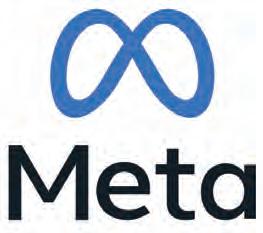
99 July-August 2023 DAWN www.africabusinessassociation.org
‘Slavery Simulator’ Game Removed from Google App Store
 By TheGrio Staff
By TheGrio Staff
THE GOOGLE PLAY Store no longer features the game “Slavery Simulator,” which allowed users to “exchange, buy and sell” enslaved Black characters.
Brazil’s Public Prosecutor’s O ffice said on Wednesday that it is looking into how the game ended up on the Play Store in the first place. According to CNN, Google withdrew the app, created by Magnus Games, after the platform and the game developers found themselves at the center of harsh criticism from social media users in Brazil.

“Our country was built with the blood of the Black population,” lawmaker Denise Pessoa shared on Twitter, CNN reported. “People were killed, tortured. A ‘Slavery Simulator’ is not a theme for games.”
Prosecutors asked Google for detailed information on the game, noting that a “great number of racist comments” had been found as well on the platform.
The “Slavery Simulator” app was released on April 20 and downloaded over 1000 times before its removal on Wednesday, May 24th.
Images from the game show that players could “choose one of two objectives at the start of the
slave owner simulator: the Path of the Tyrant or the Path of the Liberator,” according to CNN. The game’s description added that players could either become wealthy enslavers or work to abolish slavery.
Users received instructions to use enslaved people for their enrichment, to stop the abolition of slavery and to generate wealth.
The game continuously prompted players with messages such as “You need guards!” to prevent the enslaved people from running away or rebelling and “Slave level: the highest the level, the highest profit the slave will bring.”
The game’s screenshots also tell users to hire fighters, noting that one guard is typically sufficient for 30 enslaved people.
Lawmaker Orlando Silva filed an official complaint with the public prosecutor about the “macabre” game. He wrote on Twitter: “This is an apology
100 July-August 2023 DAWN www.africabusinessassociation.org Technology/Science
to crime, this is recreational racism, and they have to answer criminally,” according to CNN.
Google said in a statement that it has regulations all developers must abide by, which aim to keep users safe.
“We don’t allow apps that promote violence or incite hatred against individuals or groups based on race or ethnic origin,” the platform notes, “or that depict or promote gratuitous violence or other dangerous activities,” CNN reported.
The application had a rating of “all ages.” Google explains on its website that this category’s rating for Brazil means the content is appropriate for all ages but may occasionally have elements with a minimal impact, “such as childish violence.”
The app received an overall 4-star rating out of 5, with one user, who gave a 5-star review, commenting that the game was great for passing the time but needed more torture methods, such as an option to flog the enslaved person.

Another reviewer said it was shocking that such content was online and accessible to children.
Magnus Games stated within the app that it was solely for entertainment purposes.
“Our studio condemns slavery in any form,” the developer added, CNN reported. “All game content is fictional and not tied to specific historical events. All coincidences are accidental.”

https://thegrio.com/2023/05/26/slavery-simulatorgame-removed-google-app-store/

101 July-August 2023 DAWN www.africabusinessassociation.org
Image credit: mynews24time.blogspot.com, malavida.com, gemistvoornmt.nl
Second Life Turns 20:

Metaverse Lessons for Apple, Meta, and Roblox from the Pioneering Virtual World
By Janko Roettgers
THIS COMING WEEK (June 19th), hundreds of thousands of people are expected to congregate with their avatars in Second Life to celebrate the pioneering virtual world’s 20th birthday. There will be live music, DJs, dance performances, and a massive bazaar with more than 1,000 vendors hawking avatar clothing and other digital creations. In years past, up to 300,000 people attended this two week-long birthday bash. This year, participation is expected to be even higher.
“There are a lot of people that have been in Second Life for 20 years now,” says Second Life founder Philip Rosedale, who expects the event to be part virtual World’s Fair, part reunion. “It’ll be exciting,” he promises.

The birthday party will undoubtedly also be a point of reflection, both for Second Life insiders and industry observers alike. On the one hand, the event is expected to draw a crowd that’s larger than the user base of some VR metaverse platforms, including Meta’s Horizon Worlds.
But it’s also a stark reminder that Second Life never lived up to its own hype. Once heralded as the future of the internet—attracting investments from Amazon founder Jeff Bezos and Ebay founder Pierre Omidyar—the platform currently has 750,000 monthly active users, according to Second Life owner Linden Lab. “By most metrics, it’s about the biggest it’s ever been,” says Rosedale.
For comparison: Facebook, which la ended its most recent quarter with thre worlds are not yet for everyone,” admit majority of people.”
That admission stands in stark con Rosedale’s creation. Its 2003 launch was of community and self expression that every year. Much like Burning Man, S canvas, inviting people to be anyone an
“It had the most powerful creation to anything that they could imagine,” sa forthcoming book Making a Metaverse T
Some of its more prolific creators us environments, including detailed re-cr gardens, hip nightclubs, and post-apoc in avatar clothing and accessories th Life sees $650 million worth of peer-to million transactions happening every s spokesperson.
But while some early adopters flou by Second Life’s open-endedness and overwhelmed 99% of the people who tr
Three years after Second Life’s launc much more guided approach. Roblox a own worlds, but put a heavy emphasis much younger, but also vastly larger, c used by 66 million people every single d because it’s basically Second Life, but f dismissively.
Linden Lab, on the other hand, wante ups, which is why it tried hard not to be c
102 July-August 2023 DAWN www.africabusinessassociation.org Technology/Science - History
Africa Virtual Tour
aunched two years after Second Life, ee billion monthly active users. “Virtual ts Rosedale. “They’re not, in fact, for a

ntrast to the early enthusiasm around inspired by Burning Man, the celebration draws thousands to the Nevada desert econd Life positioned itself as a blank d do anything they wanted. ools, enabling users to basically create ays Wagner James Au, author of the That Matters.
sed those tools to build impressive 3D eations of real-life cities, serene Zen calyptic wastelands. Others specialized at they sold on the platform. Second o -peer transactions every year, with 1.6 single day, according to a Linden Lab
urished, many others were turned off d lack of direction. “It intimidated and ied it,” Au says.
h, another virtual world emerged with a lso empowered its users to create their on casual gaming. That recipe drew a rowd: At the end of March, Roblox was day. “The reason that Roblox is so big is or little kids,” Rosedale says, somewhat
ed Second Life to be a place for grownconfused with a video game. That was a
massive mistake, argues Au, and one that other metaverse platform creators can learn from. Much as in the real world, games function as icebreakers between strangers. “You need some fun activities,” he says. “It should always be a playful, game-like experience.”
Roblox also benefited from betting early on mobile; Second Life is only getting ready to launch a smartphone app this year. “We missed mobile,” admits Rosedale.

The company did briefly work on a separate virtual world optimized for VR headsets, but sold off those efforts in 2020. These days, Second Life is increasingly competing with headset-optimized virtual worlds such as VRChat and Rec Room. Meta has struggled to gain traction with its own Horizon Worlds service, but is reportedly in talks with Roblox about bringing the service to its Oculus headsets.
Apple, meanwhile, has shied away from using the metaverse terminology (opting instead for “spatial computing”), but the launch of its Vision Pro headset next year will likely further accelerate the growth of immersive virtual worlds.
Whether Second Life will ever be a part of those efforts remains to be seen. Rosedale has been a notable VR skeptic and remains concerned about motion sickness and other issues with the technology, but he has been experimenting with some VR tech in recent months.
Au believes that Second Life will make its mark on the future of the metaverse in one way or another. “There is still an opportunity to grow it beyond its hardcore user base,” he says. “They’ve definitely laid the path for others to follow.”.
https://www.fastcompany.com/90909806/second-life-20anniversary-apple-meta-roblox-lessons
Image credit: secondlifeupdate.com, blogspot.com, flickr.com
103 July-August 2023 DAWN www.africabusinessassociation.org
Investor and Musician Will.i.am: Generative AI is 'a Job Creator' and will Help Avoid Mediocrity
By Brian Sozzi ▴ June 20, 2023
"Every large company has an army of people that read and review contracts for revenue recognition purposes, for example," Lightcap said at the gathering. "You may not have that job. That may not be a job of the future."
Goldman Sachs recently estimated that generative AI could expose the equivalent of 300 million jobs globally to automation over the next decade. That's a nice way of saying a person may lose their job to a robot.
MUSICIAN, FUTURIST, and well-connected investor will.i.am suggested the talk about generative AI crushing jobs may be on the overdone side.
In his eyes, working closely with the new tech may prove to be job enhancing over time.
"If you are a creator and you see this tool, then it's a job creator," the entrepreneur told Yahoo Finance Live at the Cannes Lions Festival of Creativity on Monday. "If you are tied to yesterday and just comfortable with mediocrity, then it's a job [destroyer]."
The debate on how AI will shape the jobs of the future
and the economy remains a hot topic in markets and economists' circles.
A positive spin on the impact comes out of a new McKinsey study last week. The study identified 63 generative AI use cases spanning 16 business functions that could unleash between $2.6 trillion and $4.4 trillion in economic benefits annually.
However, dark cloud takes aren't hard to find either.
OpenAI's chief operating officer Brad Lightcap told a crowd at a WSJ Cannes event on Monday that AI could be a job eliminator.
"What I love about it [generative AI] is that everyone now has the ability to create, because now you have a partner to be able to push it," will.i.am added. "It's not just for songs. It's not just for poetry. It's not just for writing emails. It's not just for marketing strategies. Use it to solve problems, and then by that problem that you solve, it will create jobs."

Will.i.am's FYI, IBM team up on AI
Born William Adams in Los Angeles in 1975, the naturally curious will.i.am didn't exactly run in tech circles. But today, will.i.am is using his investing acumen, brand, and access
104 July-August 2023 DAWN www.africabusinessassociation.org Technology/Science
Yahoo Finance's Brian Sozzi and Brad Smith speak with investor and musician will.i.am on all things AI at the Cannes Lions Festival of Creativity.
to top tech leaders such as Salesforce CEO Marc Benioff to invest in new AI ventures.
He rose to fame in the late 1990s and early 2000s as a member of the Black Eyed Peas, a band that has sold more than 58 million singles worldwide. The group is still putting out music, minus longtime front-person Fergie, who has retired to spend more time with her family.
Will.i.am was an early investor in headphone maker Beats, netting him an undisclosed amount when Apple (AAPL) purchased the company for $3 billion in 2014, and he also struck a partnership deal with Intel (INTC) to promote various hardware.
His latest venture is a generative AI messaging and video creation app called FYI At Cannes, will.i.am revealed a new tie-up with IBM that will weave Watsonx AI technology into the FYI platform.

The musician-turnedbusinessman thinks global businesses are on the cusp of radical transformation in the next decade at the hands of AI.
"There's still a lot of folks that don't understand how it's going to transform everything," the investor added.
hhttps://www.aol.com/investormusician-am-generativeai-194103006.html

Black Blockchain Summit 2023


In celebration of the 5th anniversary of the Black Blockchain Summit, we are inviting cooperations and organizations that are developing their interest in this technology and wish to explore opportunities to expand their teams and mission in the latest Blockchain technology. We are hosting a career fair that will be a great opportunity to share a corporate interest in projects with some of the most brilliant and skilled minds in the world! Get your tickets here for the 21st to 23rd of September 2023
For more information, visit: Blackblockchainsummit.com #iloveblackpeople #SatoshiIsBlack #ReparationsNow
105 July-August 2023 DAWN www.africabusinessassociation.org
Bl k Bl k h i S it
Spike Lee Reveals The Career Advice
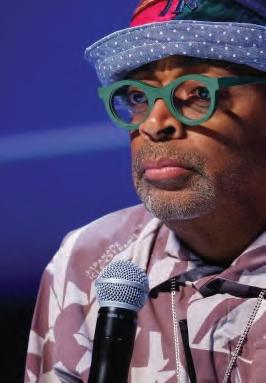
He Received From Michael Jackson
Cannes Lions
By Caroline Frost
—
SPIKE LEE has revealed the piece of advice he received from Michael Jackson that influenced his long and incredibly diverse career.
Lee was on stage Friday at Cannes Lions Festival, where he will tonight receive the inaugural Creative Maker of the Year award. He was reflecting on his long career, in which he has seemingly effortlessly balanced making independent feature films with mainstream commercial success, helming ad campaigns including the first Air Jordan spots for Nike, and a hit jeans campaign for Levi’s.
“It’s a combination of the commercials, the feature films, the documentaries, not music videos but short films.” The latter is how Lee chooses to describe his work with artists including Jackson, Prince, Miles Davis and Public Enemy, following a tip he received from Jackson.
And the celebrated auteur added that it was Jackson who first suggested he use the right language to describe his portfolio. Lee remembered: “Michael Jackson said to me, ‘Don’t ever use the term ‘music video’.”
Lee also revealed he couldn’t resist the offer from
Nike to reprise his character of Mars Blackmon –first seen in She’s Gotta Have It – for the brand’s 50th anniversary.
Lee had previously said to friend Barry Brown “I’m never going to do that again” when asked about playing the role in an ad.
Brown reminded Lee of this on stage on Friday, to which his friend replied: “Well, you gotta be careful about using the word ‘never.’ This opportunity came. They called me up – ‘Nike want to celebrate their 50th anniversary.’ It was a great honour they wanted to bring back Mars Blackmon for it.
“There was no way I could turn it down,” he added.
The commercial, titled ‘Seen It All’ and launched in May, sees Lee back in character as Blackmon, playing chess in a Brooklyn park with Zimmie. While Lee talks up the sporting heroes of the past and documents landmark moments of the past 50 years, Zimmie confounds him with present-day icons.
DAWN www.africabusinessassociation.org Lifestyle/Culture
106 July-August 2023
On stage at the Festival, Lee remembered how, back in 1988, the era-defining three way relationship between him, Nike and a rising basketball star –one Michael Jordan – first came about, following the success of She’s Gotta Have It.

“They called me up, said they liked the film, said we want you to do a commercial. You can direct it. You’ll play Mars Blackmon and we want Michael Jordan. At the time, Michael Jordan had not seen a film, nor knew what one was. They could easily have found some big-time director, but Mike agreed to it, and it blew Nike up. That started my relationship with Nike and Brand Jordan.
“I don’t think any of us could have predicted the impact those commercials would have on the world. Looking back, it was a blessing that this whole happened.”
Lee was similarly feted by Levi’s following the success of his film Do the Right Thing. O ffered total creative freedom for a jeans ad campaign, he opted to be filmed taking part in the ancient
tradition of running with the bulls in Pamplona, Spain, suitably clad in Levi’s jeans and T-shirt, a decision he described on Friday as “I was crazy back then! We were young and foolish.”
But it paid off, with Lee revealing the ad proved so successful, Levi’s were able to fund the whole campaign with the ensuing sale of their ‘Button Your Fly’ T-shirts alone.
“Directing commercials is very lucrative. It’s not something I set out to do,” added Lee.
“It was not planned. When you’re able to join forces with companies, agencies, that believe who you are – I wasn’t calling up people, they were calling me – so it’s, for the most part, very rewarding. I’m still doing commercials. When everybody is on the same page, it’s a beautiful thing, to make a creative thing, to have fun, it’s a blessing.”.
https://deadline.com/2023/06/spike-lee-careeradvice-michael-jackson-music-videos-canneslions-1235423220/
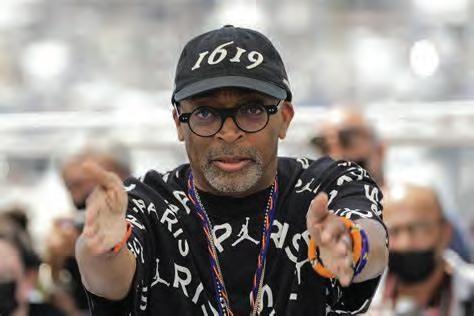 ⬆El presidente del jurado del Festival, Spike Lee, posa para los fotógrafos
Vianney Le Caer - Invision
⬆El presidente del jurado del Festival, Spike Lee, posa para los fotógrafos
Vianney Le Caer - Invision
DAWN www.africabusinessassociation.org 107 July-August 2023
⬅Spike Lee at Cannes Lions Festival 2023 Marian Brannelly/Cannes Lions
Egypt Bans Dutch Archaeolo
Linking Beyoncé and Rihann

 Story by John Blake March 18, 2023
Story by John Blake March 18, 2023


A Dutch museum says its archaeologists have been banned from carrying out excavations at a key Egyptian site over an exhibition exploring the influence of ancient Egypt on black musicians.
THE NATIONAL MUSEUM OF ANTIQUITIES in Leiden, The Netherlands said Egyptian authorities had accused it of "falsifying" history through its showcase of work by artists including Beyoncé, Nas and Miles Davis.


s

It called the argument "unfounded" and expressed disappointment at the ban. Egyptian officials have not commented.

But last month Egyptian media reported that the exhibition had angered a local antiquities expert, who said it supported "Afrocentric theory".

The event prompted an Egyptian MP to ask the government what it was doing to "confront the distortion of Egyptian civilization".
The museum also said that it had received comments via social media that were "racist or

108 July-August 2023 DAWN www.africabusinessassociation.org Lifestyle/Culture
T
E
L
ogists Over Exhibition
na to Queen Nefertiti
offensive in nature" since the exhibition opened.
The dispute comes only weeks after Egyptian authorities condemned a new Netflix docudrama series depicting Queen Cleopatra as a black African as a "falsification of history".

The antiquities ministry insisted that Cleopatra had "Hellenistic (Greek) features", including "light skin".
The exhibition at the National Museum of Antiquities (RMO) - entitled Kemet. Egypt in Hip Hop, jazz, soul & funk - aims to demonstrate how Ancient Egypt and Nubia have been "an undeniable source of inspiration for musicians of African descent for over 70 years".
The artists have embraced the ancient cultures and employed the associated motifs "as symbols of resistance, empowerment and spiritual healing", it says.
It features photographs and music videos showing how Beyoncé and Rihanna had both appeared as Queen Nefertiti; a modern sculpture of Nas based on the famous gold mask of King
Tutankhamun; several of Sun Ra's Egyptianinspired costumes; and songs by artists ranging from Nina Simone and Fela Kuti to Erykah Badu and Lauryn Hill.
The exhibition also looks at what scientific research has revealed about ancient Egypt and Nubia and discusses how they have been studied from Eurocentric and Afrocentric perspectives.
The RMO said in a statement on Wednesday that it was disappointed to be informed in a recent email from a senior Egyptian antiquities official that it was no longer allowed to excavate at the Saqqara necropolis near Cairo after almost 50 years of work there.
"The Egyptian authorities have every right to terminate a permit for an excavation; after all, it is their land and their heritage. However, the museum considers the underlying argument for this decision incorrect."
It added: "The Egyptian authorities conclude that our current exhibition... is about 'falsifying' the ancient Egyptian history. This political argument is used to express the dissatisfaction with the exhibition and to ban our excavation."
The RMO also expressed surprise that the argument was being made by "people who have not actually seen the exhibition".
https://www.bbc.com/news/world-middleeast-65835611

Image credit: Tumblr, rihanna.com.br, FunX, zeroequalstwo.net

109 July-August 2023 DAWN www.africabusinessassociation.org
Opera Based on Octavia Butler Novel Makes New York City Premiere
By TheGrio Staff
“When Covid happened, I was like, this is an opportunity for us to really see our power,” Reagon told NBC. “People have said that you can’t stop pollution. But then the world shut down, and the sky was clear. We got to see our collaborative power globally.”
“ OCTAVIA E. BUTLER ’s Parable of the Sower,” an opera based on the hailed novel by the late Afrofuturist pioneer, had its New York City premiere on Thursday, July 13th at Lincoln Center.
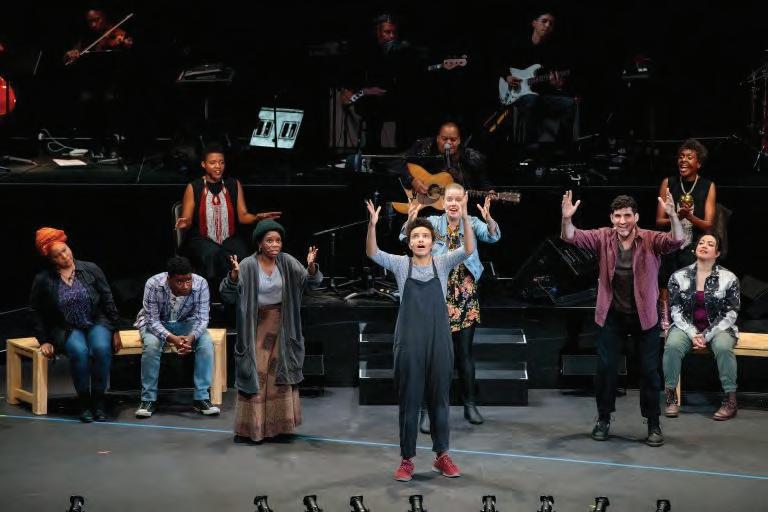
Toshi Reagon wrote the libretto of the opera, according to NBC News. The longtime singersongwriter-musician-composer co-designed the piece with her mother, activist Bernice Johnson Reagon, an acclaimed musical artist in her own right. The two workshopped the opera in parts and performed evolving versions for years after the 2013 shutdown of the New York City Opera, where they began developing the piece five years prior.
Now, their entire “Parable of the Sower” opera has landed on the stage at Lincoln Center, one of American opera’s biggest production houses.
Butler wrote her “Parable of the Sower” book in 1993, yet it takes place in 2024, when fascism is taking over the United States government and chaos is preceded by climate disasters. Reagon worked on adapting a libretto based on the novel for decades but says the COVID-19 pandemic gave her a new perspective.
Reagon said that much of Butler’s work, notably her “Parable” book, was very prophetic when cross-referencing the subject in her novels to the perils of today’s real-life society.
ciety.
“People are reading her books and seeing that somebody saw this 30 years ago, which means we, in some way, have been living it,” Reagon maintained. “In the back of our minds, a lot of us have been worried about where we are now.”
“Parable of the Sower” is the latest of Butler’s writings to get reinterpreted in a different discipline. FX and Hulu produced the 2022 time-travel drama series “Kindred,” based on Butler’s novel of the same name. In 2021, HBO ordered a pilot to be produced based on her vampire novel, “Fledgling.”

https://thegrio.com/2023/07/14/octavia-butlerparable-of-the-sower-opera-premieres-new-york/



110 July-August 2023 DAWN www.africabusinessassociation.org Lifestyle/Culture
a s r s
Beyonce and Tiffany & Co., Release Limited-Edition Collection to Fund HBCU Scholarships
By Jeroslyn JoVonn
BEYONCÉ’S TIFFANY & CO. PARTNERSHIP
has expanded to include a limited-edition collection made especially for her Renaissance tour.
On Saturday, July 29, Tiffany & Co announced “The Return to Tiffany® x Beyoncé Collection” with 100% of proceeds going to Beyonce and JayZ’s About Love Scholarship. Announced on the f irst anniversary of Bey’s “Renaissance” album, the collection includes three necklaces co-designed by Bey that reflect both sides of the partnership.
One side reads “Tiffany & Co. New York 925,” while the other shouts out Beyoncé’s seventh studio album.
“WELCOME TO THE RENAISSANCE BEYONCÉ 925,” IT READS.
The three pieces aren’t cheap and range in price from $275 to $700. But all proceeds will go toward The About Love scholarship, a partnership between Tiffany & Co, Beyoncé’ Bey Good Foundation, and Jay-Z’s Shawn Carter Foundation.
The About Love Scholarship funds education for students in the creative and arts field at five Historically Black Colleges and Universities (HBCUs) including Lincoln University in Pennsylvania, Norfolk State University in Virginia, Bennett College in North Carolina, University of Arkansas at Pine Bluff, and Central State University in Ohio.


The proceeds will add to the more than $2 million Tiffany & Co. has already given to Bey and Jay’s foundations, Teen Vogue reports.
Beyoncé has been dripped out in Tiffany & Co. pieces throughout her Renaissance. The luxury jewelry allows fans to shop the pieces on their
site that include the Tiffany T earrings, the Tiffany HardWear gauge links Bey’s been seen in, and a custom Tiffany & Co. Elsa Peretti® Mesh dress she opened her Toronto show in, among others.
Beyoncé and Jay-Z’s About Love campaign launched in 2021 with a luxury ad spotlighting the superstar couple. It came after Beyonce modeled more than 200 carats of Tiffany diamonds — including an iconic 128.54-carat yellow diamond necklace she was the first Black woman to ever wear. The necklace had already been worn by Audrey Hepburn and Lady Gaga.”
https://www.blackenterprise.com/beyoncelimited-edition-renaissance-tiffany-co/
Image credit: https://shawncartersf.com/studyabroad/

111 July-August 2023 DAWN www.africabusinessassociation.org
Lifestyle/Culture
Illinois State Museum Returns Sacred Objects to Kenya
By Fox 32 digital staff
THE ILLINOIS STATE MUSEUM has returned 37 wooden memorial statues to the National Museums of Kenya.
The statues are known as vigango, and they were returned for repatriation to Mijikenda communities.
They are considered sacred cultural objects and are believed to carry the spirits of male elders who have passed away
Representatives from museums and universities across the United States will visit Kenya to meet with Mijikenda elders.
They will also gain insight into the National Museums of Kenya’s efforts to protect vigango and restore them to their communities.
"These items are sacred and inalienable from the people who created them," Curator of Anthropology Dr. Brooke Morgan said. "Separating vigango from their rightful owners harms the spiritual well-being of the whole community. The Museum has long recognized the importance of returning these statues to Kenya and appreciates


the institutions that have helped pave the way for such a significant large-scale return."
The vigango were initially removed from Mijikenda villages and sacred sites in the 1980s.
They were received by art collectors and later transferred to the Illinois State Museum as part of a significant African art collection.
Unbeknownst to the Museum, the vigango never should have been taken in the first place, officials said. In 2006, Museum staff discovered that a kigango in its collection had been stolen and subsequently returned it to its rightful owner.
Through research and collaborations with colleagues in Kenya, the Museum has now successfully returned all remaining vigango to the National Museums of Kenya for repatriation to Mijikenda communities.
https://www.fox32chicago.com/news/illinois-statemuseum-returns-sacred-objects-to-kenya
Image Credit: Illinois State Museum
112 July-August 2023 DAWN www.africabusinessassociation.org Lifestyle/Culture
Vigango are prepared for their journey back to Kenya at the ISM Research & Collections Center.
Vigango are photographed at the ISM Research & Collections Center prior to their return to Kenya.
National Black Chamber of Commerce Forges a Strategic Partnership with the White House’s Prosper Africa to Increase Trade and Investment Potential of African Diaspora Businesses
The National Black Chamber of Commerce (NBCC), the world’s largest federation of Black Chambers of Commerce, forged a strategic partnership with the White House’s Prosper Africa initiative to promote the business development and global competitiveness of African diaspora businesses in the United States.
The strategic partnership delivers on the U.S. Government’s commitment at last December’s U.S.- Africa Leaders’ Summit to catalyze U.S.-Africa trade and investment deals and partnerships and aligns with the White House’s U.S. Strategy Towards Sub-Saharan Africa to deepen engagement with America’s African Diaspora.
“This partnership between NBCC and Prosper Africa will strengthen our collective mission to create a strong, equitable economy for black businesses and entrepreneurs,” said Charles DeBow III, NBCC President. “We are celebrating our 30th year anniversary of uplifting Black businesses around the world. Together under this partnership, we can continue to open new opportunities, and create greater access for even more African Diaspora entrepreneurs to thrive.”
The partnership establishes a framework for NBCC and Prosper Africa to collaborate on efforts to increase the growth, trade and investment potential, and global scale of Black businesses

in the U.S. The 2022 U.S. Census revealed that there are nearly 141,000 Black-owned businesses in the U.S. with an estimated $141.1 billion in annual receipts, 1.3 million employees, and $42.2 billion in annual payroll.
Under this partnership, NBCC will promote and drive greater participation among black businesses in the International Trade Administration Global Diversity Export Initiative (GDEI), the U.S Department of Commerce trade mission to Africa. The next GDEI trade mission will take place on August 6-15, 2023, to South Africa, Ghana, and Nigeria.
Prosper Africa is a sponsor and will also participate in the 123rd National Black Business Conference, under the theme “We are Together”, convened by National Alliance for Black Businesses, NBCC, the National Business League, and the World Conference of Mayors, on August 23 - 26 in Atlanta, GA.
“The U.S. private sector plays a pivotal role in advancing a strategic and economic partnership between the United States and African countries,” stated Lisa Walker, Prosper Africa Deputy Coordinator. “The partnership with NBCC demonstrates Prosper Africa’s mission to help African Diaspora companies and investors do business in U.S. and African markets by mobilizing services and resources from across the U.S. Government.”

113 July-August 2023 DAWN www.africabusinessassociation.org
r e s f f a p e r o s t f a e c p e s i t b w $ a m a a p w g a b I A D I Advertorial N til Blk Chbf CFStt i
My Coworkers Have Long Forgotten About George Floyd
By The Only Black Guy in the Office
TODAY, MAY 25TH, marks three years since George Floyd was murdered by Minneapolis police officer Derek Chauvin. At the time, for myself and many other Black people in America, Floyd’s death was a sad, unfortunate story we had all heard before. It stung, but highlighted a reality that, respectfully, I was all too familiar with.

It was a weird time for all of us. Covid lockdowns and remote work were starting to feel permanent, as were weekly Club Quarantine sets on Instagram and that weird stretch when people got really passionate about baking bread. Aside from barbershop closures, I was adjusting nicely to the new normal by hiking, becoming a plant dad, and indulging in guilt-free weekday afternoon naps. Self care had become a priority. But that was all sent into a tailspin once George Floyd became the latest hashtag, reminding me that I’d been living through a pandemic my whole life—racism— and that didn’t pause with the start of another. To my colleagues, as was the case for so many other non-Black Americans, Floyd’s death hit differently—and they were not shy about offering me condolences as awkwardly as possible.
I appreciated the efforts, sure. But I couldn’t help but raise an eyebrow at how incredulous my (white) coworkers seemed about racial profiling and police brutality. I remember one Zoom meeting where a red-faced guy from another department sputtered through a rant about questioning his patriotism for the first time. I went camera-off for that call. Then there were the Slack DMs. Some offered a variation of “hope you’re well” (I wasn’t). One person dropped merely a yellow heart with no further commentary. I got a Venmo payment for $7, too, so there’s that.
"I couldn’t help but raise an eyebrow at how incredulous my (white) coworkers seemed about racial profiling and police brutality."
My manager and manager’s manager and manager’s manager’s manager all put time on my calendar within that first week following the tragedy. They claimed they just wanted to touch base and see how I was feeling. But within the first five minutes, it was clear they wanted to make sure I was happy, because as a reaction to Floyd’s death, so many employers suddenly felt they had to pacify their Black employees
How my higher-ups had planned to do that, I wasn’t exactly sure. In some of those calls, my well-meaning colleagues wanted to discuss how our company could hire and retain more talent with experiences (and skin tones) that matched mine. They had ideas and plans. They wrote an open letter about doing better and posted it on the company's Instagram page—scroll back far enough and it’s still there (right next to the Blackout Tuesday square). But the urgency felt knee-jerk in a way that made me question just how long-lasting and sustainable these initiatives would be. Time proved my skepticism to be shrewd.
My company continued to grow its workforce throughout Freedom Summer and beyond, and I can’t front, quite a few of the hires were Black folks. A few were positioned in senior roles, but it seemed a whole lot more were junior or mid-level.
114 July-August 2023 DAWN www.africabusinessassociation.org Lifestyle/Culture - Commentary
There were employee-resource groups started and supported with small budgets. Racial sensitivity training for managers. I almost began to drink the Kool-Aid—that is, until the pandemic bubble had burst, and layoffs had seemed to cut the majority of those aforementioned hires. Summer 2021 and beyond, it seemed, was where D-E-I went to D-I-E After all that talk of change, we’re right back where we started.
I don’t believe George Floyd died in vain. Black death, whether at the hands of racist police or civilians, will always be tragic. I mourn those deaths because with each instance—whether Ahmaud Arbery, Breonna Taylor, Rayshard Brooks, or countless others—I understand I could meet a similar fate here in the U.S. of A. For a few weeks in 2020, I think my colleagues understood this, too. But time has a funny way of fading those sympathies, even though these tragedies continue to happen. I was reminded of this just last month.
After news broke about 16-year-old Ralph Yarl being shot in the head after going to the wrong house while looking for his sister, I told my manager I was taking a mental health day. To my
manager’s credit, he didn’t probe or ask what was wrong. I’m not even sure he connected the news with the PTO request. Of course that’s not his responsibility, but if he had asked, I would’ve said I needed the time off for the same reason I did three years ago, when I was being offered so many mental health days that I began to question my standing at the company. I needed the time off because another Black life was senselessly and brutally harmed, just as many, many others have been before and since.
George Floyd was killed because a store clerk thought his $20 bill was counterfeit. Three years later, I’m still questioning whether the reckoning in my workplace and beyond was authentic.

https://www.levelman.com/george-floyd-deathanniversary-reckoning-black-professionals/\ Image credit: medium.com, Sergio Flores/Getty Images

The Only Black Guy In The Office 115 July-August 2023 DAWN www.africabusinessassociation.org
This Culinary Incubator is Changing the Lives of Black and Brown Culinary Professionals in Chicago
 By Angela Burke
By Angela Burke
RETREAT AT CURRENCY EXCHANGE
, artist Theaster Gates’s café and culinary incubator located in Chicago’s Washington Park neighborhood, launches careers and changes lives.
Just after the final warming bowl of chicken udon soup prepared by chef Ariya Taylor had been served, the packed dining room turned dance floor at Retreat at Currency Exchange, a café and culinary incubator located in Chicago’s Washington Park neighborhood, was flooded with the sounds of the late house-music pioneer Frankie Knuckles. His record collection is one of many noteworthy archives that have been entrusted to Theaster Gates, the prolific multidisciplinary artist and social
innovator who has breathed new life into this space. A trained urban planner, Gates transforms fading structures in predominantly Black neighborhoods into energetic cultural hubs where community and artistry can convene.
“The culinary community and the music community are allies and part and parcel to my work,” says Gates. Retreat at Currency Exchange has been a launchpad for local chefs, caterers, coffee brewers, and mixologists. The endeavor, an offshoot of Gates’ artist-focused charitable organization, Rebuild Foundation, is more than a rotating pop-up series. It is an investment in Black and brown culinarians through a formal program. “I don’t think of myself as a restaurateur. I’m an
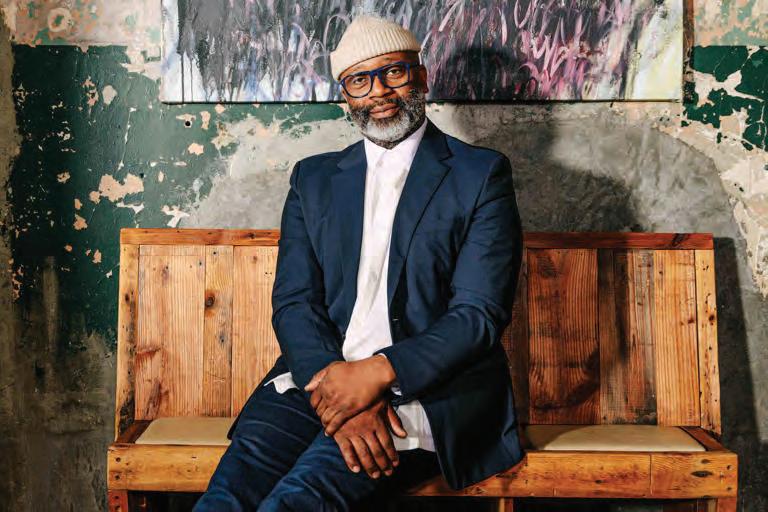
116 July-August 2023 DAWN www.africabusinessassociation.org
Theaster Gates Lucy Hewett © Provided by Food & Wine
Lifestyle/Culture
enabler. I’m a platform-maker,” Gates says. “In this case, it’s an opportunity to do what Rebuild does in general, which is to celebrate the local. Invite everybody in, and then through that period of incubation, people will be better than they were before they came. That’s my hope.”
Residents of the six-month-long program receive funding, professional development, and ongoing mentorship while navigating next steps to restaurant ownership or starting a food business. The resources participants receive serve as underpinnings for whatever bold plans they may have. Gates’ platform is modeled after his retreats for Black visual artists and has been designed as an oasis for a segment of the hospitality industry
that is routinely overlooked and undersupported. At Retreat at Currency Exchange, being vulnerable, taking up space, and exerting creative license while being Black or brown is celebrated.
Another branch of the Rebuild Foundation is the design- and artcentered Dorchester Industries Experimental Design Lab, Gates’ partnership program with the Prada Group, which further allows Gates to highlight Black artists and showcase artistic diversity to a global audience. Its inaugural cohort includes 2022 F&W Best New Chef Damarr Brown, the celebrated Chicago-based chef whose work honors Black foodways at the acclaimed Hyde Park restaurant Virtue. “I just want to amplify great culinary artists of color,” says Gates. “I do think that when I say ‘art’—and I’m saying this from my artist’s perspective—I’m saying people who are experts at what they do, and they figure out the best ways to present their craft in interesting ways.”
Gates’ mission and philosophy across these multiple disciplines makes it possible to mention a memorable meal in the same breath as a work of art. There’s something profound and powerful about a visionary who affirms young Black and brown culinarians, letting them know that they are seen.
https://www.msn.com/en-us/foodanddrink/ foodnews/this-culinary-incubator-is-changing-thelives-of-black-and-brown-culinary-professionalsin-chicago/ar-AA1c9s3w

117 July-August 2023 DAWN www.africabusinessassociation.org
Lucy Hewett © Provided by Food & Wine
Lifestyle/Culture
Chef Dieuveil MalongaVisited 48 African Countries to Create a New ‘Afro-fusion’ Cuisine
By Rebecca Cairns.
DINNER AT MEZA MALONG A is not just a meal –it’s a tour of the African continent. Delicately plated dishes feature Nile perch from Uganda, Algerian olive oil, and penja peppers from Cameroon.
Combining ingredients and food cultures from different countries, founder and head chef Dieuveil Malonga has created his own “Afro-fusion” cuisine that he says embodies the heritage and traditions of a vast and varied continent – and that he hopes can spark a culinary “revolution” in Africa.
“Africa has an amazing diversity of food,” says Malonga. “The world doesn’t know about the ingredients and amazing recipes we have.”
Born in Brazzaville, in the Republic of Congo, Malonga grew up in Germany and began his career in some of Europe’s best Michelin-starred establishments, before embarking on a twoyear trip around Africa to find inspiration for his restaurant. Settling in Kigali, Rwanda, he opened his eponymous restaurant in 2020 with the goal of platforming African recipes and ingredients.
While his restaurant has received recognition for its culinary artistry, Malonga’s ambitions are not just for himself – but the entire African dining scene.
After setting up the digital platform “Chefs in Africa,” which to date connects over 4,000 aspiring chefs and culinary professionals to career opportunities and skills development, Malonga decided to take education into his own hands and created a training school in his restaurant.
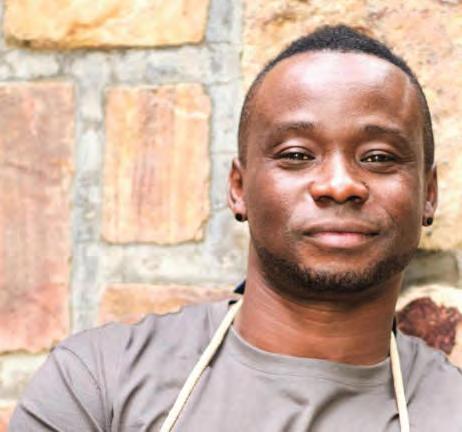
Hoping to produce the next generation of culinary pioneers, Malonga is on a mission to create the foundations of an innovative fine-dining scene on the African continent that can rival Europe’s – but with its own, distinctive, African flair.
“The school of grandmothers”
At Meza Malonga, the approach to fine dining is different from Europe’s, says Malonga.
“I was trained and worked at Michelin-star
restaurants in Germany, and then southern France, but my concept is very different,” says Malonga, adding that the culture in Europe was one of exclusivity and competitiveness. “I focus more on education.”
“If you want to go far, you must share with people,” he adds.
His Afro-fusion cuisine has been shaped by this philosophy of sharing. Malonga visited 48 of the 54 African countries in a bid to better understand the diverse traditions, dishes and ingredients.
“I would go into the villages and go to meet the grandmothers, because they have amazing, old techniques,” says Malonga, who adds that his love of cooking comes from his own grandmother.
These village matriarchs shared their local delicacies and family recipes, teaching Malonga regional fermentation and preservation processes in what he calls “the school of grandmothers” – a
118 July-August 2023 DAWN www.africabusinessassociation.org
Chef Dieuveil Malonga has always had a passion for foo inspired by his grandmother to pursue a career in the cul Chris Schwagga © Provided by CNN
d, and was inary arts. -
very different kind of education to the more formal one he received years earlier at a culinary school in Münster, Germany.

Combining his Euro-centric training with his experiences of African cuisine, Malonga developed his signature style. West African fare from Cameroon, Ivory Coast, and Ghana, and traditional dishes from ethnolinguistic groups such as the Maasai, Bantu, and Zulu, feature heavily in his cooking, although Malonga does not restrict himself.
By using the overlap in flavors and spices, ingredients or preparation processes, Malonga says he can create a cohesive experience of multiple cultures in a single dish.
“Food doesn’t have a border,” says Malonga. “Many things are connected, and that helps me to be creative – that’s all in my cuisine.”
Global recognition
While North African cuisine, like Moroccan and Egyptian fare, has been a mainstay of the global dining scene for decades, West African cooking has received less attention – but interest has been growing in recent years. Nigerian restaurant Ikoyi became the first Michelin-star West African restaurant in the UK in 2018, and the meteoric success of Chika’s, a multi-millionpound UK snack brand that highlights Nigerian flavors, shows a growing appetite for West African food. In January 2021, the “Fufu Challenge,” a TikTok trend that asked viewers to film themselves eating fufu – a starchy dough often made from fermented casava – and thick, stew-like egusi soup for the first time. While the trend caused controversy and a backlash from some in Africa, it also sparked interest in West African cuisine among US internet users that has continued since.
“People are now open to new experiences, and African (food) is now coming onto the market,” says Malonga, adding that the international fine dining scene is becoming more varied.
“When I was young, people were only talking about European cuisine. And then came Thai dishes, Asian cuisine, and now South American. Next will be African cuisine – that’s why we are preparing the market,” he adds.

Recognition from international award bodies like Michelin and 50 Best Restaurants of African restaurants abroad help to elevate the continent’s culinary reputation, says Malonga – but he’s eager
see page 120
119 July-August 2023 DAWN www.africabusinessassociation.org
Inspired by Malonga's Congolese heritage, this dish highlights palm oil, a signature Congolese product, pureed with sweet potato, and served alongside Rwandan beef - Chris Schwagga © Provided by CNN
To ensure the quality of fresh produce coming into the restaurant, Malonga sources his vegetables from Musanze in northern Rwanda, where he has a three-hectare organic farm. -
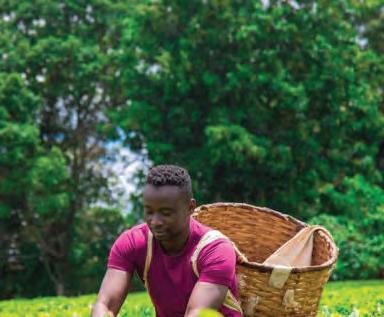 Chris
Chris
for these awards to pay more attention to African cuisine in Africa.
“It’s very important to promote the food culture, restaurant scene, and products in Africa. (Awards have) helped many countries in Europe and elsewhere, and I hope that maybe that will be the same in Africa,” says Malonga.
Michelin still doesn’t cover the African continent, and in 2022, just one of the 50 Best Restaurants were awarded to a venue in Africa, compared to 29 in Europe. But Malonga was recognized by the 50 Best as a “champion of change” in 2022, and in March he was nominated as one of the new candidates for the Best Chef Awards Top 100

A food revolution
Malonga’s dedication to education is evident in his latest venture: a purpose-built “culinary innovation village” in the rural, northern district of Musanze, Rwanda, expected to open in late 2024.
This $1.5 million training-school-meetsrestaurant is the evolution of the Meza Malonga
concept, where Malonga hopes to continue his “food revolution” by connecting with remote and underserved communities. The school will increase the number of students he can teach, and Malonga hopes to see more students come from other countries across Africa.
And the new venue will offer Malonga a chance to further explore and refine his culinary art. Situated on the banks of Lake Ruhondo, it will provide access to fresh fish, and it’s close to the threehectare farm that Meza Malonga already sources its vegetables from, where the fertile volcanic soil creates a bountiful supply of local produce.
“I like organic products – it’s very important for me to follow the whole process,” says Malonga, adding, “for me, Africa is the garden of the world.”
“It makes me proud to see what is happening now with African cuisine and the exposure we are getting,” he says. “The next food revolution is already here.”
https://www.msn.com/en-us/news/world/this-chefvisited-48-african-countries-to-create-a-new-afrofusion-cuisine/ar-AA1c8lwf
120 July-August 2023 DAWN www.africabusinessassociation.org Lifestyle/Culture
Afro-Fusion Cuisine from page 119
Meza Malonga team mezamalonga.com
Schwagga © Provided by CNN
Professional Soccer Players are Using AI to Filter out Racist Content Hurled at Them
By Cassie Werber
software from GoBubble, which employs AI to filter out messages. GoBubble has users “from the Premier League down to the fourth division in English soccer,” as well as around Europe and in Australia, AP reports.
Blocking toxic content
Explaining the technology, called Emotion AI, in a 2022 press release, GoBubble said that instead of using keywords or context analysis, the technology analyzes user-generated behavior “across multiple languages in text, image, video, audio, and emojis to identify and block toxic and potentially harmful content.” The company had not responded to a request for comment by the time of publication.
GoBubble co-founder and CEO Danielle Platten explained in the release that this helps solve both the problem of users seeing abusive content, and of human moderators being traumatized by their role in identifying and blocking such content.
How to stop the trolls
Big tech companies like Meta, which owns Facebook and Instagram, and Twitter have long struggled to identify and deal with abusive content, though Twitter has taken a hands-off approach lately, under new owner Elon Musk. Their targets include the racism prevalent in soccer, where it accounted for more than half of abusive messages last season, according to Kick It Out, an NGO working to fight discrimination in sport.
BLACK PROFESSIONAL ATHLETES
find themselves in a particularly painful situation at this moment in social media. Never before have they been expected to be so present online, where millions of fans follow their accounts, help build their careers, and often support their activism.
Yet at the same time, rampant racist abuse is being hurled at them on the very same platforms, in some cases damaging their mental health, and in all cases providing a depressing reminder of humanity’s potential for cruelty.
Now some players are reportedly turning to artificial intelligence tools that promise to comb through content and delete or hide abusive messages.
According to the Associated Press, soccer players in the UK and elsewhere are using
After the 2020 European Championship final, several players, including three Black players from the England team who missed penalties, were subjected to “torrents” of abuse, Time wrote, noting that while the platforms worked to take down racist slurs and emojis, they were often visible for hours.

Meta told AP it was still working hard to tackle abuse. Governments are also trying to take action, with the European Union crafting a Digital Services Act that would seek to curb abuse ranging from racism to child exploitation to misogyny. The UK has similar legislation in the works.
In January, a man who racially abused Brentford player Ivan Toney was sentenced to a three-year ban from all UK soccer stadiums.
https://qz.com/professional-soccer-players-areusing-ai-to-filter-out-1850510201
121 July-August 2023 DAWN www.africabusinessassociation.org
Lifestyle/Culture
English soccer player Bukayo Saka. Photo: Matthew Childs (Reuters)
Miami Heat Guard Gabe Vincent’s Play Inspires his Father and Nigeria
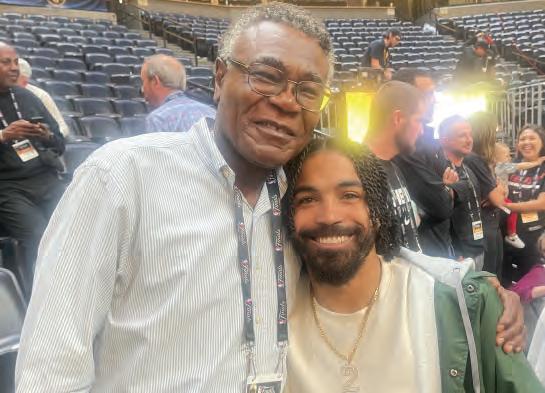 By Marc J. Spears
By Marc J. Spears
He’s very tenacious. Determined. Very principled. What else can I say? He’s an all-around nice young man. I couldn’t be more of a proud dad to see my son in that situation.
“Like any journey, there are trials and tribulations. I’m just happy that he stayed focused and was already to play his role. I was also happy for him.”
Vincent and the underdog Heat are now tied at 1-1 with the Denver Nuggets in the 2023 NBA Finals after a gritty 111-108 Game 2 victory on Sunday night in the bestof-seven series. Vincent scored a game-high 23 points in Miami’s win while also nailing 4 3-pointers, dishing 3 assists and snatching

FRANKLYN VINCENT left Nigeria for the United States in 1980 to receive a quality education and a goal and mission to “better himself.”
The California State University, Stanislaus professor accomplished those goals by earning a doctorate in psychology, marrying his wife, Cynthia, and becoming the father of three boys. If Vincent’s youngest son Gabe reaches his goal of winning his first NBA title with the Miami Heat, he will inspire Nigerians, Africans and young fans worldwide who yearn for success despite the odds stacked against them.
“He’s come a long way,” Franklyn Vincent told Andscape. “He’s gone through lots of struggles.
122 July-August 2023 DAWN www.africabusinessassociation.org Lifestyle/Culture
Gabe Vincent mn2s.com
Franklyn Vincent (left) with his son, Miami Heat guard Gabe Vincent (right), after he scored 23 points for Miami in their 111-108 win over Denver in Game 2 of the 2023 NBA Finals. Marc J. Spears mn2s.com
2 steals in 32 minutes. The 6-foot-3, 200-pound point guard also scored a team-high eight points in the second quarter and earned a game-high +22 plus-minus. (Note: The Denver Nuggets won the 2023 NBA title.)
“I know how comfortable he is,” Heat All-Star guard Jimmy Butler said. “I know the level of confidence that we have in him and that he has in himself to go out there and run the offense at any point in time, first through fourth quarter, maybe even overtime. And we live with the decisions and the shots that he makes and takes, and he’s our starting PG for a reason.”
Said Vincent: “We moved the ball. They set screens to get me in my spots. I just took advantage when I had opportunities.”
Among the many reasons Vincent’s story is inspirational is that he was undrafted out of UC Santa Barbara in 2018. The Modesto, California, native started his pro career playing for the Sacramento Kings’ G League Stockton Kings. The Heat acquired Vincent’s rights by signing him to a two-way contract on Jan. 8, 2020. And since then, the 2019-20 G League Most Improved Player has grown from a “gunslinger” when he began his Heat career with G League Sioux Falls to the franchise’s starting point guard in these NBA Finals over the likes of six-time All-Star Kyle Lowry.
Vincent said “belief and persistence” were the keys to his success after he continued to work hard and focused on “the big picture.” Meanwhile, Heat coach Erik Spoelstra simply described Vincent as a “special guy.”
“He took on the toughest role change for a young player,” Spoelstra said. “He was a gunslinger, twoguard. We wanted to develop him into a combo guard, somebody that could organize us, be an irritant defensively, tough, learn how to facilitate and run a team. That’s the toughest thing to do in this league is turn a ‘2’ [shooting guard] into a ‘1’ [point guard]. He openly just embraced that. Then he struggled at times with that because you’re trying to reinvent yourself. Instead of saying this is too tough, let me be me, he’s really grown the last three years. He’s just an incredible winning player.
“This year, he’s been a starter for us. He’s been great. He’s off the bench, he’s been great. He’s like a lot of our guys, the competitive spirit. You
get challenged like we’re getting challenged in this series, you hope it brings out the best in you.”
Franklyn and Cynthia Vincent were former coworkers who fell in love, got married, had three sons and have long lived in Modesto, California. The youngest of their sons is Gabriel Nnamdi Vincent, born June 14, 1996. Franklyn Vincent came to America as a huge soccer fan. But when Gabe fell in love with basketball while playing at school during his youth, the Vincent family strongly supported his passion.
“We gave him all support he needed. Whatever he needed do, wherever he needed to be, we were there for him,” Franklyn Vincent said.
When his son was 3 years old, Franklyn Vincent took his family back to Nigeria to his hometown of Port Harcourt. The city of about 1 million people is known for its fishing settlements, ports, bountiful crude oil deposits and farming. It was important for him to teach his sons to be proud of their Nigerian heritage and have self-confidence. And he believes those principles are part of his son’s mentality now.
Franklyn Vincent (left) with his son, Miami Heat guard Gabe Vincent (right), after he scored 23 points for Miami in their 111-108 win over Denver in Game 2 of the 2023 NBA Finals.MARC J. SPEARS
“I taught him to have a sense of confidence, believe in himself, be respectful of others and stay true to who he is and what he knows is best,” Franklyn Vincent said.
Vincent returned to Nigeria for the first time since his early youth as a member of Nigeria’s national men’s basketball team in 2019 to train for the World Cup in China. As the top African team at the 2019 FIBA Basketball World Cup, Nigeria qualified for its third consecutive Olympics berth in the 2020 Summer Games.
“Nigeria was cool. We had practices where we were able to see the city a little bit, but not too much,” Vincent said. “I could barely see it. We were only there four or five days before we got our visas to China. Nigeria was beautiful. Obviously, it has its own set of issues and things it is dealing with like any country. But it’s a beautiful country of beautiful people.”
see page 124
123 July-August 2023 DAWN www.africabusinessassociation.org
Gabe Vincent from page 123
Nigeria qualified for the 2020 Tokyo Games, which was delayed a year by the coronavirus pandemic. His father also had strong pride in seeing his son wear “NIGERIA” on his Olympic basketball jersey while playing for coach Mike Brown, now coach of the Sacramento Kings.
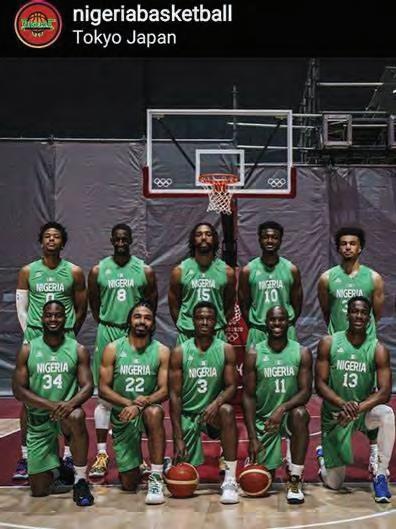
“It meant a whole lot to see my son not only represent a team, but the whole nation,” Franklyn Vincent said. “Also, a nation that is recognized by the continent of Africa. I applaud him for that …
“That’s my country, man. That’s my birth country. And it means a whole lot. Yes. It’s everything. It is my identity.”
“It meant a lot to have Nigeria on my jersey. Millions of people. It means a lot to represent them and I represent them proudly, especially with my middle name that they recognize so much,” Vincent said.
Franklyn Vincent watched the exhibition game where the Nigerians defeated the USA 90-87 in an upset win behind 21 points from Vincent in Las Vegas on July 10, 2021. While it was just an exhibition game, beating the eventual Olympic champions is the most notable win in African basketball history and inspired Nigeria and the entire continent.
“It was a huge win,” Vincent said. “It helped beating a team like USA that is so world-renowned. It lets them know that there is blood in the water, they can be beat and teams in Africa are capable of that …
“We knew how much it meant to our people. We know the people back home in Nigeria were happy.”
Vincent averaged 6 points, 2 rebounds and 1.7 assists as Nigeria went winless in three Olympic games. Despite Vincent’s less-than-spectacular Olympic statistics, Brown saw something special in him then.
“He allows you to coach him,” Brown told Andscape. “In order to have success as a team, you need guys like that. You need guys that will lead by example when it comes to being coachable, work ethic and feel for the game. His versatility is off the charts. He is an extension of the coaching staff whether in practice or the flow of the game.
And I still look at him as a very young guy, but he has an old soul demeanor when it comes to the finer things in basketball.”
Vincent made his NBA debut on Jan. 27, 2020, as a member of the Heat and averaged 2.4 points in nine games during the 2019-20 NBA season, which was shortened by the pandemic. He played sparingly for the Heat from 2020-22. But around the NBA All-Star break, the Heat decided to move Vincent into the starting lineup full time over Lowry. Vincent averaged 10.8 points, 2.4 assists and 2.2 rebounds in 28.5 minutes per game during 34 regular-season contests this season.
Vincent has continued to blossom through the postseason, with a humble Lowry serving as a mentor instead of an angry veteran. Vincent is averaging 13.4 points and 3.9 rebounds in 18 playoff games, including five games where he scored over 20 points. In two Finals games against Denver, he’s averaging 21 points, 4.5 3-pointers made and 4.0 assists.
“Kyle has meant the world to me,” Vincent
124 July-August 2023 DAWN www.africabusinessassociation.org Lifestyle/Culture
said. “I’ve said it time and time again. I’m extremely grateful to have someone like that in my corner. Someone like him mentoring me along the way cheering me on, cheering me up, picking me up when I’m down, etc. He’s been nothing but great for me.”
Vincent says he follows the Basketball Africa League and the doors it is opening for players from the continent. Africa is known for producing a long list of talented big men, but not NBA point guards. Former NBA champion Festus Ezeli, a Nigerian, believes Vincent is inspiring the next generation of basketball players from Africa.
“To Nigeria, Gabe Vincent is an example of knowing where you come from, having a foundation of hard work and taking advantage of opportunities when you have them,” Ezeli told Andscape. “Also, shining in public and showing the results of your hard work that you have done in private for so long. Those are all of the things that he means for us.
“But he is a shining example of what it means to be proud of your heritage. At the end of the day, he is playing for the Nigerian national team and able to rise to the top through those opportunities. And now he is taking advantage of it.
Brown said that Vincent’s Finals play inspires
not only Nigerians but a “ton of people worldwide.”
“Obviously, with him being Nigerian, playing on the Nigerian national team, our success and notoriety with beating USA, it is inspirational,” Brown said. “But if you look at a guy like him, he’s inspiring to not only Nigerians, but also to kids in the USA can relate to him because he’s smaller. He’s not extremely tall, quick or athletic. But he went through a process as hard as possible not getting drafted. He’s inspiring a lot of people with the way he is playing now.”
Vincent inspired his father this postseason. The elder Vincent hugged his son tight after the game Sunday night and May 29 after the Heat qualified for the 2023 NBA Finals by beating the Boston Celtics in a deciding Game 7. But the longest and most meaningful hug of them all could be on the horizon if Vincent and the Heat defeat the Nuggets to win the title.
“I like the way he handled himself,” Franklyn Vincent said. “He was poised. Quite focused. He played a fantastic game. I wish him the best going forward. I congratulated him after the game and gave him a big hug. There is nothing better than that. A big hug from your dad …
“I don’t know if I could come up with the words of what a title would mean to me. I look forward to that.”
https://andscape.com/features/miami-heat-guardgabe-vincents-play-inspires-his-father-andnigeria/

Image: mn2s.com, https://www.nairaland. com/6666633/tokyo2020-basketball-nigeria-lostaustralia

125 July-August 2023 DAWN www.africabusinessassociation.org
Tokyo2020 Basketball: Nigeria
Tour de France 2023: Smiling Girmay can be 'Symbol' f
Biniam Girmay won the second stage of the Tour de Suisse in June Girmay became the first black African to win a stage of the Grand Tour when he claimed victory at the Giro de Italia in 2022

AT THE GIRO D'ITALIA LAST YEAR, the 23-year-old became the first black African to win a Grand Tour stage and in June he won the second stage of the Tour de Suisse.
International Cycling Union's (UCI) JeanJacques Henry was Girmay's first coach in Europe and believes more success awaits at the Tour de France which gets under way on 1 July in Bilbao.
"The general classification, I don't think he can (win) but he has a chance to win a stage," Henry told BBC World Service.
"The Tour de France will be an even bigger event and he'll bring (a win) to every single country in Africa.
"He is already very popular everywhere in Africa. All the people who love cycling will watch the tour and, if he wins, I think all Africans people will be proud."
Giro d'Italia to Tour de France
Girmay, racing for Team Intermarche, beat
Dutchman Mathieu van der Poel in a sprint for the line to win stage 10 of the Giro d'Italia - the victory providing an iconic image.
The fact it was his debut year on the Grand Tour increased the magnitude of the achievement. Indeed foreshadowing the moment, Girmay said that winning a tour stage would be one of cycling's "best moments".
"I think he's opening a lot of people's eyes," Maude le Roux, 26, told the BBC. The South African along with Ethiopian, Selam Amha Gerefiel, is part of the UCI's World Cycling Centre (WCC) team in Aigle, Switzerland, where Girmay first rode in Europe.

"There are cyclists in Africa that need help to come to Europe. Cycling is not just a European sport and, being a rider from Africa, it's hard to come into Europe.
"Binyam is shedding some light on that. The teams are starting to look for riders in Africa, which is amazing.
Lifestyle/Culture
126 July-August 2023 DAWN www.africabusinessassociation.org
From Sport Africa
for Africa
"Just the fact that he was on this team, obviously now we have a woman's team, but that he was in the centre - I think I speak for me and Salaam saying that gives us hope for the future that we can make it and we're here for a reason."
Gerefiel, 26, added: "He's a teacher for us so I'm looking to be better and work hard like him. For me he is a model."
Biniam Girmay (centre) wins a stage of the Giro de Italia
Girmay became the first black African to win a stage of the Grand Tour when he claimed victory at the Giro de Italia in 2022
Cycling's World Championships will be held in Africa for the first time in 2025 in Kigali, Rwanda.
Both the east African event in two years and Giray's prominence mark the rise of the sport on the continent.
"Cycling is Eritrea's number one sport," Henry continued. "They have the same potential as Kenyans who are champions in athletics.
"If you transfer this potential - endurance potential on the bicycle - they can be the best in the world."
So what of the man that Henry coached who would go on to put Eritea and African cycling on the map.
Would he feel the weight of a continent on his shoulders?
"When he was with us he was not stressed at all - quite shy - but the good thing is that he was happy with everybody. Just enjoying life - smiling all the time to everybody," Henry said.
"This is something very important for high level athletes just to enjoy life and without any stress.
"Many riders are stressed by the results, by not having the right performance at the right moment - not achieving the goals. But for him - he didn't have that kind of choice."
Pastries and cobblestones
Among the choices that Girmay did have related
to adapting to life in Europe and the new training regimes.
"He was a junior in 2018 when he came here for the first time," Henry said. "We had him in July, August and September, to prepare for the World Championship in Innsbruck. It was too cold for him. It was 4 July - it was warm - but it was too cold for him.
"So it was quite tough to prepare him because we had to change a lot of things, his lifestyle, his routines. You can eat just vegetables or pastries and 'OK, it's good' but you need to have a great balance between these kinds of foods with some carbohydrates or with some proteins."
The next challenge for Girmay was the surfaces in Europe, something he would eventually overcome when wining the 78th edition of the Gent-Wevelgem one-day classic on the famous cobbled streets of Belgium.

"He didn't like the cobblestones," said Henry. "He always told us: 'I don't like that. I don't want to race on cobblestones.' Now he can win those races in the world tour.
"Now he has changed his mind. he enjoyed it. To win these kinds of races, you have to enjoy those cobblestone sections."
Girmay claimed the second stage of June's Tour de Suisse - this after recovering from a horror crash at the Tour of Flanders which wiped out most of the peloton.
Henry still keeps a close eye on his protege, who he says is a "special rider and sprinter" but is "not a pure climber, he will not be so efficient in big mountains".
Beyond the rider, however, Henry believes Girmay's impact on the sport is only just at the start line.
"After his career he can be someone who can help to develop cycling in Africa and in Eritrea, and give his experience.
"He can turn into a symbol, as African athletes can succeed in Europe and in the best races in the world."
https://www.bbc.com/sport/africa/66054020
Image: mn2s.com, https://www.nairaland. com/6666633/tokyo2020-basketball-nigeria-lostaustralia
127 July-August 2023 DAWN www.africabusinessassociation.org
Rodeo Celebrates the Legacy of Black Cowboys
By Russell Contreras
BEFORE THERE WERE white cowboys in the American West, there were Latino vaqueros, Indigenous cattle handlers and Black cowboys.
Why it matters: That history, often forgotten in tales of the nation's frontier, is what photographer Ivan McClellan has honored by documenting Black cowboys and cowgirls for nearly a decade — and why he organized a Juneteenth rodeo in Portland, Ore., recently.
McClellan tells Axios he launched the inaugural "Eight Seconds Juneteenth Rodeo" — named for how long a rodeo bull rider has to stay on for a ride to be scored — to provide a venue for Black cowboys and cowgirls to compete in a sport usually dominated by whites.
Black rodeos receive a fraction of sponsorships and winning payouts as big-circuit rodeos. McClellan has attracted sponsors such as Wrangler and Tecovas, allowing the Portland rodeo to offer $60,000 in prize money.
That's more than twice the amount offered at many other Black rodeos — but still well below the hundreds of thousands of dollars offered at bigger rodeos.
The event is drawing cowboys and cowgirls from California, Texas and Oklahoma.
Zoom in: McClellan grew up in Kansas but said that like many Black Americans, he couldn't relate to cowboy culture because of how it was portrayed on TV and in movies.
"What I had seen in film was John Wayne, Montgomery Clift and 'Tombstone' ... all of these white cowboys. The only Black cowboys I'd seen were kind of a joke, like Cowboy Curtis on 'PeeWee's Playhouse.' "
That changed when he saw real Black cowboys in Oklahoma and saw similarities with his Kansas family. He began his photo project.

Between the lines: Afro-frontierism has always been part of the American story — even before
the arrival of the first enslaved people in Virginia in 1619, historian Timothy E. Nelson tells Axios.
The original American cowboys were AfroMexicans in the present-day Southwest, he said.
They later would later meet up with emancipated Black people from the American South, navigated homestead laws — 160 acres of granted federal land to anyone agreeing to farm the land — and threats of land thefts by white settlers.
Yes, but: When the Western genre was created via movies and popular culture, Black cowboys were left out of the picture, said Nelson, author of the upcoming book "Blackdom, New Mexico: The Significance of the Afro-Frontier, 1900–1930."
Showing Black cowboys meant you'd have to discuss the racism they faced and the enslavement they once endured, he said.
128 July-August 2023 DAWN www.africabusinessassociation.org History
A Black cowboy captured by photojournalist Ivan McClellan. Photo: Courtesy of Ivan McClellan
"When you see Black people in the context of cowboy-ness, it has nothing to do with white people. In fact, it's a rejection of whiteness."
McClellan said the exclusion of Black cowboys popular Western TV shows and movies is based on "racism and laziness."
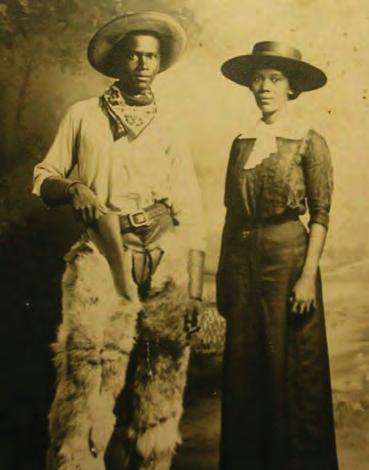

The intrigue: Rashad Robinson, president of the activist group Color Of Change, tells Axios the growing popularity of Juneteenth allows Black communities to get behind unique events like rodeos and show different sides of Black history.
"I love that we can take these
moments to claim our cultural legacies. Juneteenth is about visibility."
https://www.axios. com/2023/06/16/rodeocelebrate-black-cowboysamerican-west



Image credit: https:// billpickettrodeo.com, Pinterest, PhotoShelter

129 July-August 2021 DAWN www.africabusinessassociation.org
Bill Pickett
A Look at the Country’s Only Touring Black Rodeo
By Lauren Moya Ford
THE BILL PICKETT INVITATIONAL RODEO
(BPIR) is the only touring African American rodeo in the United States. Named for the legendary cowboy and performer who overcame discrimination in his lifetime to become the first Black rodeo athlete inducted into the Rodeo Hall of Fame, the BPIR has been a safe space for Black people from around the country to connect and compete since 1984. The New Black West: Photographs from America’s Only Touring Black Rodeo (Chronicle Books, 2022) by Gabriela Hasbun is a celebration of the BPIR’s rich community, daring sport, and unique identity.

El Salvador-born, San Francisco-based Hasbun is a thoughtful and perceptive observer. She photographed the BPIR’s annual gathering at Rowell Ranch Rodeo Park outside of Oakland, California, for more than a decade. Her sensitive portraits of attendees with their horses, regalia, and equipment capture the event’s special atmosphere of care and pride. The book is a thoughtful tribute to generations of BPIR participants, and to the ways that the rodeo has helped validate and redefine the largely untold story of Black cowboys and cowgirls in the American West.

Importantly, each of Hasbun’s photos is accompanied by information about and comments from the people depicted. These texts convey the deep sense of meaning, connection, and freedom that rodeo-goers feel. The relationship between riders and horses is a central theme. “I know pretty much every time I get on my horse’s back, I’m breaking the stereotype out on the trails,” recording artist and music producer Prince Damons says as he washes his horse. Brianna Noble, who rode her horse in a June 2020 Black Lives Matter protest in Oakland, notes, “The only time when I have not been ignored is when I’m sitting on a horse.”
“Horses are incredible confidence boosters,” says Iyauna Austin.
Despite the book’s setting, we don’t see any barrel racing or bull riding. Instead, Hasbun

130 July-August 2023 DAWN www.africabusinessassociation.org History
Gabriela Hasbun, The New Black West, Chronicle Books, (2022). The book cover features a photo of Denesha Henderson from 2008.
1 3
portrays competitors and spectators between events, as they ready themselves or relax with friends and family. Along with intimate, close shots of attendee’s faces, there’s a strong focus on rodeo clothing and accessories, which often innovate the usual cowboy garb. From pressed plaid shirts and fringed chaps to long acrylic nails and airbrushed hats, Hasbun’s photos show us that dress is a powerful tool for self-expression and selfdefinition at the BPIR.
In all, Hasbun’s book reveals the rodeo to be a crucial place for reclaiming a sense of history and space. “We ride on behalf of those who did not have the opportunity to do so,” cowgirl Ronnie Franks says. The New Black West captures the cross-generational competition and camaraderie that has made this event so vital and dynamic through the years.
Image legend:
1) A cowboy at the 2017 BPIR waves a version of the African American flag as he rides around the arena introducing the show.
2) Tabansie Burch (with hat) and Brooke Jackson grew up attending the BPIR annually and riding with all the children who attended. Here they are on a horse in the rodeo parking lot in 2009.

3) Harold Williams Jr. (left) and Lindon Demery (right), junior rodeo champions at the 2018 BPIR from Gabriela Hasbun’s The New Black West (Chronicle Books, 2022)(all images courtesy Chronicle Books)
4) Brianna Noble and her horse at De Fremery Park in Oakland, California, 2021.

https://hyperallergic.com/727164/a-look-at-thecountrys-only-touring-black-rodeo/
Image credit: The New Black West

DAWN www.africabusinessassociation.org 131 July-August 2023
2
Morgan Freeman Visits the Pentagon, Talks History with Secretary Austin
By Brakkton Booker
ONE IS THE NATION’S first Black man to head the Defense Department. The other is a generational actor known for portraying presidents, global icons like Nelson Mandela and even God — twice.
Defense Secretary Lloyd Austin hosted Oscar winner Morgan Freeman at the Pentagon on recently for a wide-ranging discussion on the contributions and sacrifices of the 761st Tank Battalion, a decorated all-Black unit that fought in World War II and is commonly referred to as “The Original Black Panthers.”

This unit helped rescue the stepfather of Secretary of State Antony Blinken in the waning days of the war.
Freeman made a stop at the Pentagon to promote an upcoming documentary he executive produced on the battalion, set to be released this month. It includes interviews Freeman conducted with Austin and one of the last surviving members of the 761st, who is now in his late 90s.
“All Americans should be inspired by the story of the 761st Tank Battalion,” Austin said. “It’s an incredible story and a deeply American story.”

Austin thanked Freeman for lending his star power to elevate the little-known history of the 761st. He also asked Freeman during a one-onone conversation if he was surprised by anything he uncovered doing research for the film.
Freeman’s reply was simple: “No.”
But he reminded the audience, which included ROTC students from local Washington, D.C.-area universities, that Black Americans have fought in every American conflict since the Revolutionary War. Freeman also shared his experiences after the release of the 1989 Civil War epic “Glory,” in which he played Sgt. Maj. John Rawlins, a soldier
in one of the Union Army’s first African American regiments.
Freeman recalled that people wept and told him they weren’t aware of the hardships Black soldiers had to overcome.
“People who grew up, particularly in the South, think that all we did was drop cotton and drive mules,” Freeman said. “I grew up going to the movies and I learned history from the movies. One of the things wrong with learning history at the movies is, I didn’t see me.
“But if I want my story told, I have to tell it, don’t I?” Freeman said.
Freeman’s visit comes on the heels of the recent 75th anniversary of President Harry Truman signing an executive order that officially ended segregation in the U.S. military.
Austin noted the links between the 761st, the integration of the military and today.
“It’s one reason why my own life journey can take me from growing up in the Jim Crow South to serving as Secretary of Defense,” Austin said, before mentioning the nomination of President Joe Biden’s pick to nation’s next top military officer.
“It’s one reason ... one key reason ... why
History
132 July-August 2023 DAWN www.africabusinessassociation.org
Defense Secretary Lloyd Austin hosted actor Morga Wednesday for a discussion of the 761st Tank Batta fought in World War II and is commonly referred to a © Petty Officer 1st Class Alexander Kubitza | Office of the
President BIden can nominate an outstanding war fighter like Air Force Gen. C.Q. Brown to be the next Chairman of the Joint Chiefs of Staff.”
If confirmed, Brown would be the first Black man to lead the Joint Chiefs since the late Colin Powell filled the role three decades ago during the administration of President George H.W. Bush.
Long before his career in cinema, Freeman joined the Air Force in 1955. He had aspirations of becoming a fighter pilot, but was relegated to being a mechanic, assigned to working on and repairing radar systems that synced antennae to track incoming missiles and aircraft.
He told the crowd he was “as mechanical as a bug.”
He did that job for the better part of a year before he got the chance to audition for his dream assignment. It was only then that he realized why he wanted it in the first place. “I decided my attraction to being a fighter pilot was all movie stuff,” according to an interview he did with AARP.
Freeman is best known for portraying enduring characters, such as a pre-Civil Rights era chauffeur in late 1940s Georgia in “Driving Miss Daisy,” South Africa’s anti-apartheid activist and former president, Nelson Mandela, in “Invictus,” the role of God in the comedies “Bruce Almighty” and “Evan Almighty,” and the wise and battle-tested former boxer in “Million Dollar Baby,” for which he won the Academy Award for Best Supporting Actor in 2005.
He’s also portrayed a number of military and intelligence agency characters, including Rawlins
in “Glory,” an Army doctor in the film “Outbreak” and the head of the Central Intelligence Agency in film “The Sum of All Fears.”
The 761st, meanwhile, was a heralded fighting unit, amassing seven Silver Stars, 246 Purple Hearts and one Medal of Honor, according to the National Park Service. Perhaps the unit’s most famous soldier was legendary baseball player Jackie Robinson, a first lieutenant in the battalion. He, however, never saw combat after refusing to move to the back of a segregated bus in 1944. Robinson was later court-martialed and acquitted, according to an account by The National World War II Museum
The battalion, which broke barriers as the first African American tankers in the U.S. Army, first saw battle in Normandy, France, in 1944. The battalion’s motto was “Come Out Fighting,” and eventually would participate in four major military campaigns across six countries. This would include more than 180 consecutive days in combat, where the battalion would help liberate some 30 towns.
It took years before the segregated unit saw battle. Originally formed in 1942 in Louisiana, the battalion trained there and in Texas for more than two years, mainly due to the belief among the Army’s top brass that Black troops were inferior on the battlefield compared with their white counterparts.
That myth was quickly dispelled.
In November 2020, when then-President-elect Joe Biden introduced Blinken as his choice to lead the State Department, Blinken shared the story of his late stepfather, Samuel Pisar, who spent four years in a Nazi concentration camp. During the war, Pisar broke away from a death march and hid out in the woods of Bavaria. At one point he heard the rumbling of a tank.
“He ran to the tank,” Blinken said. “The hatch opened. An African American GI looked down at him.”
The “761st Tank Battalion: The Original Black Panthers,” is set to air Aug. 20th on the History Channel.
https://www.msn.com/en-us/news/world/morganfreeman-visits-the-pentagon-talks-history-withaustin/ar-AA1eIbey
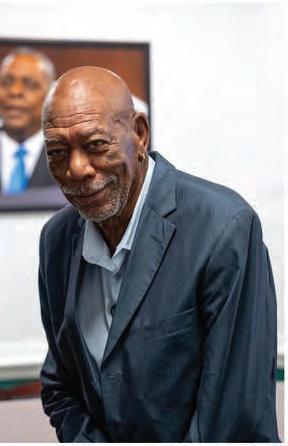
DAWN www.africabusinessassociation.org 133 July-August 2023
n Freeman at the Pentagon on lion, a decorated all-Black unit that as “The Original Black Panthers.” e Secretary of Defense Public Affairs
Celebrations
African Diaspora Independence Days
J
R CAMEROON - J . 1, 1960
R HAITI - J . 1, 1804
D R SUDAN - J . 1, 1956
F
G GRENADA - F 07, 1974
R T GAMBIA - F . 18, 1965
SAINT LUCIA - F 22, 1979
DOMINICAN REPUBLIC - F . 27, 1844
A R EGYPT - F . 28, 1922
WESTERN SAHARA - F . 28, 1976
M
K MOROCCO - M 2, 1956
R GHANA - M 6, 1957
S MAURITIUS - M 12, 1968
R TUNISIA - M 20, 1956
R NAMIBIA - M 21, 1990
A
R SENEGAL - A 4, 1960
S N Z MOROCCO
(M ) - A 7, 1956
R ZIMBABWE - A 18, 1980
MOROCCO (S S Z , M ) - A 27, 1958
R SIERRA LEONE - A . 27, 1961
R TOGO - A 27, 1960
M
P ' D R ETHIOPIA -
M 5, 1941
R CUBA - M 20 ,1902
S ERITREA - M 24, 1993
C - R GUYANA - M 26, 1966
R SOUTH AFRICA - M 31, 1910
J
NIGERIA (B C N ) - J 1, 1961
A A ' R V
(J ) - J 19, 1865
R MOZAMBIQUE - J 25. 1975
D R MADAGASCAR -
J 26, 1960
R DJIBOUTI - J 27, 1977
R SEYCHELLES - J 29, 1976
D R CONGO
(KINSHASA) - J 30, 1960
MOROCCO (I ) - J 30, 1969
R BURUNDI - J 1, 1962
R RWANDA - J 1, 1962
D R SOMALIA - J 1, 1960
D P R
ALGERIA - J 3, 1962
R CAPE VERDE - J 5, 1975
F I R COMOROS - J 6, 1975
R MALAWI - J 6, 1964
C THE BAHAMAS - J 10, 1973
D R SÃO TOMÉ AND PRINCIPE - J 12, 1975
R LI BERIA - J 26, 1847
A
R BENIN - A . 1, 1960
R NIGER - A . 3, 1960
P D R BURKINA
FASO - A . 5, 1960
G JAMAICA - A 06, 1962
R CÔTE D'IVOIRE (I C ) -
A . 7, 1960
R CHAD - A . 11, 1960
CENTRAL AFRICAN REPUBLIC - A . 13, 1960
R CONGO (BRAZZAVILLE) -
A . 15, 1960
R GABON - A . 16, 1960
R TRINIDAD AND TOBAGO - A
31, 1962
S
K SWAZILAND - S . 6, 1968
F S C ST. KITTS
J
DAWN www.africabusinessassociation.org 134 July-August 2023
AND NEVIS - S 19 1983
G BELIZE - S 21, 1981
R MALI - S . 22, 1960
R GUINEA-BISSAU - S . 24, 1973
R BOTSWANA - S . 30, 1966
CAMEROON (B C S ) -
O . 1, 1961
F R NIGERIA - O . 1, 1960
R GUINEA - O . 2, 1958
K LESOTHO - O . 4, 1966
R UGANDA - O . 9, 1962
R EQUATORIAL GUINEA - O . 12, 1968
R
ZAMBIA - O . 24, 1964
G ST. VINCENT AND THE GRENADINES - O 27, 1979
MOROCCO (I Z , T ) -
O . 29, 1956
N
G ANTIGUA AND BARBUDA -
01 N 01, 1981
C DOMINICA - N 03, 1978
P ' R ANGOLA - N . 11, 1975
R SURINAME - N 25, 1975
I R MAURITANIA - N . 28, 1960
BARBADOS - N 30, 1966 D
U R TANZANIA - D . 9, 1961
R KENYA - D . 12, 1963
LIBYA (S P ' L A
J ) - D . 24, 1951
www.thoughtco.com/chronological-list-of-africanindependence-4070467
www.caribbeanelections.com/education/ independence/default.asp
African Diaspora Celebration Days
BLACK HISTORY MONTH - F (USA)
AFRICA ENVIRONMENT & WANGARI
MAATHAI DAY - M 3
AFRICA DAY - M 25
JUNETEENTH - J 19 (USA)
NELSON MANDELA DAY - J 18
AFRICA’S WOMEN DAY - J 31
BLACK PHILANTHROPY MONTH - A (USA)

INTERNATIONAL DAY FOR PEOPLE OF AFRICAN DESCENT - A 31
AFRICAN UNION DAY - S 9
AFRICA HUMAN RIGHTS DAY - O 21
O
DAWN www.africabusinessassociation.org 135 July-August 2023
www.blackphilanthropymonth.com
Agriculture - Business - Commentary
Development - Education - Governance
History - Investment - Lifestyle/Culture
- Technology/Science
"Awakening the African Giant Within"
The Africa Business Association (ABA) is pleased to invite you to be an integral part of our publication the DAWN - Awakening the African Giant Within. DAWN is a voice through which public and private entities and people share pertinent information and market business and investment opportunities in Africa and the African Diaspora. Gain access to these trillion dollar markets via ABA DAWN outreach and advertising opportunities.

• Outreach to Africa Business and Investment
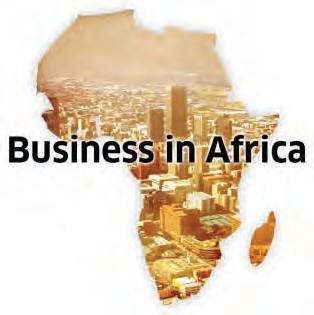
• Outreach to Diaspora Business and Investment
• Advertorial/Feature story advertising
• Profiles
• Bid and Tender opportunities
Our readers are Diaspora Africans, African small business owners, African American Chambers of Commerce members, business owners, corporate buyers, prime contractor’s, importers-exporters, community organization members, elected officials and civic/social leaders in Africa and the United States. Don’t be left out. Advertise in this door opening publication. 1-240-467-6811

Reserve Your Ad Space Today!
+1 (240) 467-6811 or E-mail:
Advertising Opportunities Full Page w/Feature Story US$1,500 Full Page US$1,000 Advertorial or Titled Article US$1,000 Half Page US$ 750 Spot Ad US$ 500 Marketing Massage with website link US$ 185 ********Rates Subject to Change********* 136 July-August 2023 DAWN www.africanbusinessassociation.org
Call:
DAWN@AFRICABUSINESSASSOCIATION.ORG
DAWN
Invest Fest 2023

Georgia World Conference Center
285 Andrew Young Interna onal Blvd. NW Atlanta, GA 30313 USA

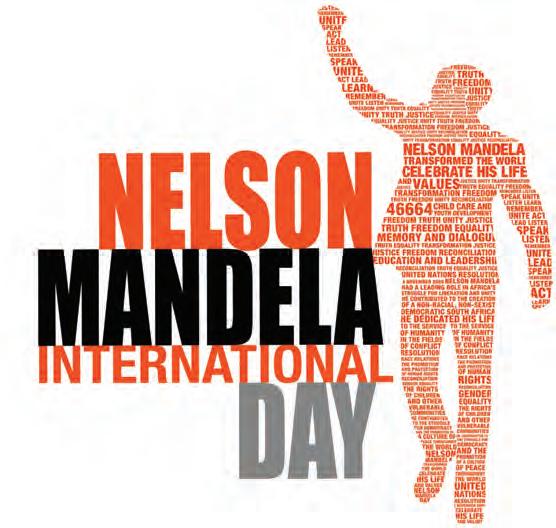
August 25 – 27, 2023
Presented by Earn Your Leisure
Find Informa on - Purchase Tickets Here
EXIM Annual Conference 2023

Washington Hilton, Washington, DC
October 19-20, 2023
Presented by Export-Import Bank of the USA
Find Informa on - Here

Events 137 July-August 2023 DAWN www.africanbusinessassociation.org
Events






 Idris Elba, Pres. Nana Akufo-Addo
Mo Abudu EbonyLife
Idris Elba, Pres. Nana Akufo-Addo
Mo Abudu EbonyLife































 By Aisha Salaudeen
By Aisha Salaudeen




 By Rafael Peña
By Rafael Peña






















 By Minda Zetlin, Author of 'Career SelfCare: Find Your Happiness, Success, and Fulfillment At Work'
By Minda Zetlin, Author of 'Career SelfCare: Find Your Happiness, Success, and Fulfillment At Work'
















 By Nick Sonnenberg
By Nick Sonnenberg




 By Elissaveta M. Brandon
By Elissaveta M. Brandon

















 Mohammed Yehya EL BAKKALI (CEO) and
Mohammed Yehya EL BAKKALI (CEO) and











































 By Mitchelmao
By Mitchelmao




 By Alexander Onukwue
By Alexander Onukwue





















 By Andrew Deck
By Andrew Deck












 By TheGrio Staff
By TheGrio Staff














 ⬆El presidente del jurado del Festival, Spike Lee, posa para los fotógrafos
Vianney Le Caer - Invision
⬆El presidente del jurado del Festival, Spike Lee, posa para los fotógrafos
Vianney Le Caer - Invision

 Story by John Blake March 18, 2023
Story by John Blake March 18, 2023
























 By Angela Burke
By Angela Burke





 Chris
Chris


 By Marc J. Spears
By Marc J. Spears




























